
- •20 Food and drink 184
- •21 Sport and competition 191
- •23 Holidays and special 208 occasions
- •Introduction
- •10 I Country and people
- •12 I Country and people
- •14 I Country and People
- •2 History
- •16 2 History
- •18 2 History
- •It was in this period that Parliament began its gradual evolution into the democratic body which it is today. The word 'parliament',
- •20 2 History
- •22 2 History
- •24 2 History
- •26 2 History
- •28 2 History
- •30 2 History
- •32 3 Geography Climate
- •It was in Britain that the word 'smog' was first used (to describe a
- •36 3 Geography
- •38 3 Geography
- •40 3 Geography
- •Part of Snowdonia National Park
- •4 Identity
- •44 4 Identity
- •IrroubleatLllangybi
- •46 4 Identity
- •48 4 Identity
- •50 4 Identity
- •52 4 Identity
- •54. 4 Identity
- •5 Attitudes
- •58 5 Attitudes
- •60 5 Attitudes
- •62 5 Attitudes
- •64 5 Attitudes
- •66 5 Attitudes
- •In the history of British comedy,
- •6 Political life
- •68 6 Political life
- •70 6 Political life
- •72 6 Political life
- •74 6 Political life
- •6 Political life
- •78 7 The monarchy
- •The reality
- •84 8 The government
- •86 8 The government
- •88 8 The government
- •In comparison with the people of
- •9 Parliament
- •92 9 Parliament
- •94 9 Parliament
- •96 9 Parliament
- •100 10 Elections
- •102 10 Elections
- •104 10 Elections
- •I've messed up my life
- •Serb shelling halts un airlift
- •2 January is also a public holiday in
- •Identity 42—55
- •Illustrations by:
The
graphs above show the approxi- however, is an improvement
on past mate average daily circulation
decades. In 1950, for example, they
figures for national newspapers in sold twenty times
as many. Educa - the early 1990s. You can see
that the tion seems to be having an effect on
tabloids sell about six times as many people's reading
habits. copies as the
broadsheets. This,
The
two types of national newspaper Each
of the national papers can be characterized as belonging to one of
two distinct categories. The 'quality papers', or 'broadsheets',
cater for the better educated readers. The 'popular papers', or
'tabloids', sell to a much larger readership. They contain far
less print than the broadsheets and far more pictures. They use
larger headlines and write in a simpler style of English. While the
broadsheets devote much space to politics and other 'serious' news,
the tabloids concentrate on 'human interest' stories, which
often means sex and scandal! However,
the broadsheets do not completely ignore sex and scandal or any
other aspect of public life. Both types of paper devote equal
amounts of attention to sport. The difference between them is in the
treatment of the topics they cover, and in which topics are given
the most prominence (> Different approaches, different subjects). The
reason that the quality newspapers are called broadsheets and the
popular ones tabloids is because they are different shapes. The
broadsheets are twice as large as the tabloids. It is a mystery why,
in Britain, reading intelligent papers should need highly-developed
skills of paper-folding! But it certainly seems to be the rule. In
1989 a new paper was published, the Sunday Correspondent,
advertising itself as the country's first quality tabloid'. It
closed after one year.
152
Different
approaches, different subjects
Here are some details of the
front pages
of some national dailies for one date (21;
March 1993). For each paper, the first line is the main headline
and the figures in brackets are the height of the letters used for
it.
• The Sun
(5.4 cm high)
Topic: an interview with the Duchess
of York
Total text on page:155 words (one
article)
• The Daily Mirror £5m
FERGIE'S HIJACKED OUR CHARITY
(3.,5 cm)
Topic: the activities of the
Duchess of
York
Total text on page: 240 +
words (two
articles)
• The Daily Express MINISTER
URGES SCHOOL CONDOMS
(3 cm) Topic:
government campaign to reduce teenage pregnancies Total text on
page: 260 + words (three articles)
• The Times South
Africa had nuclear bombs, admits
de Klerk (1.7 cm) Total
text on page: 1 ,900 + words (five
articles)
• The Guardian
(1.7 cm) Topic:
the war in the former Yugoslavia Total
text on page: i ,900 + words (four articles)
• The Daily Telegraph Tory
Maastricht revolt is beaten off
(i. 5
cm) Topic:
discussion of the Maastricht Treaty
in Parliament Total
text on page: 2,100 + words
(five articles)
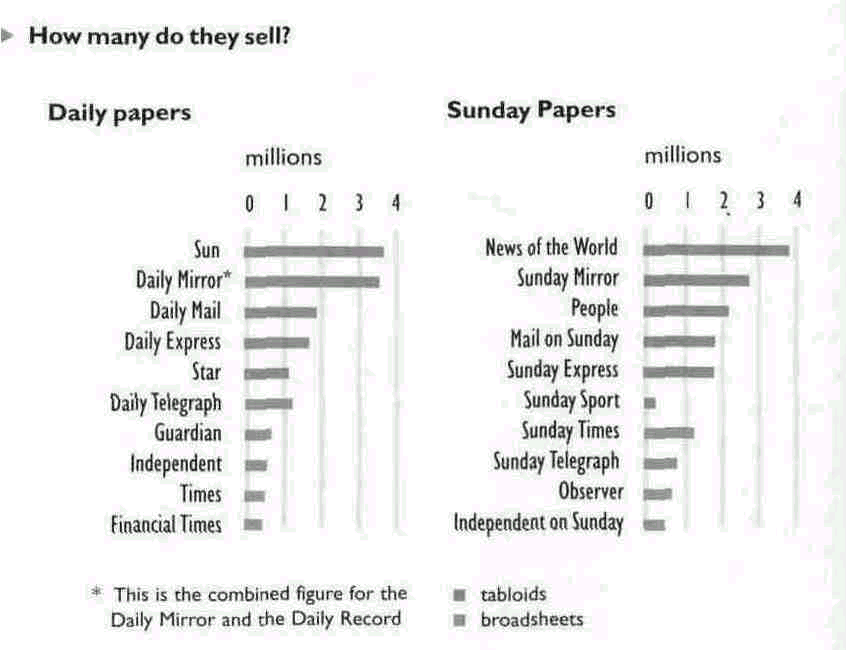
I've messed up my life
Serb shelling halts un airlift
The press: politics 153
The characteristics of the national press: politics
The way politics is presented in the national newspapers reflects the fact that British political parties are essentially parliamentary organizations (see chapter 6). Although different papers have differing political outlooks, none of the large newspapers is an organ of a political party. Many are often obviously in favour of the policies of this or that party (and even more obviously against the policies of another party), but none of them would ever use 'we' or 'us' to refer to a certain party (d> Papers and politics).
What counts for the newspaper publishers is business. All of them are in the business first and foremost to make money. Their primary concern is to sell as many copies as possible and to attract as much advertising as possible. They normally put selling copies ahead of political integrity. The abrupt turnabout in the stance of the Scottish edition of the Sun in early 1991 is a good example. It had previously, along with the Conservative party which it normally supports, vigorously opposed any idea of Scottish independence or home rule; but when it saw the opinion polls in early 1991 (and bearing in mind its comparatively low sales in Scotland), it decided to change its mind completely (see chapter 12).
The British press is controlled by a rather small number of extremely large multinational companies. This fact helps to explain two notable features. One of these is its freedom from interference from government influence, which is virtually absolute. The press is so powerful in this respect that it is sometimes referred to as 'the fourth estate' (the other three being the Commons, the Lords and the monarch). This freedom is ensured because there is a general
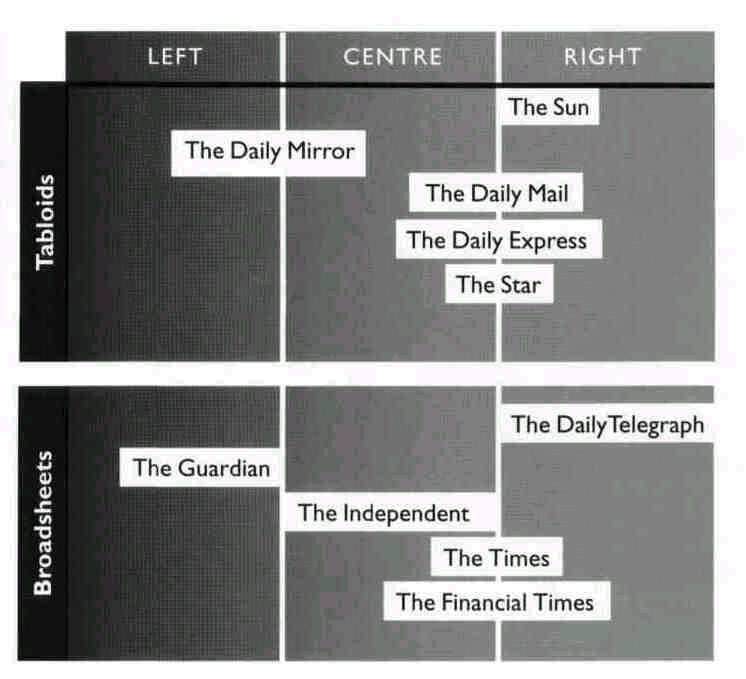
> Papers and politics
None of the big national newspapers
'belongs' to a political party. However, each paper has an idea of what kind of reader it is appealing to and a fairly predictable political outlook. Each can therefore be seen, rather simplistically, as occupying a certain position on the right-left spectrum.
As you can see, the right seems to be heavily over-represented in the national press. This is not because such a large majority of British people hold right-wing views. It is partly because the press tends to be owned by Conservative party supporters. In any case, a large number of readers are not very interested in the political coverage of a paper. They buy it for the sport, or the human interest stories, or for some other reason.
154 16 The media
>
Sex and scandal
Sex and scandal sell
newspapers. In September 1992, when there were plenty of such
stories around involving famous people and royalty, sales of
tabloids went up by 122,000. But in October, when stories of this
kind had dried up, they fell by more than 200,000. Even the quality
Observer got in on the act. On i i October 1992, its magazine
section featured nine pages of photos of the pop-star Madonna taken
from Sex (her best-selling book). That week, its sales were 74,000
greater than usual. The next Sunday, without Madonna, they were
exactly 74,000 less than they had been the week before.
feeling in the country
that 'freedom of speech' is a basic constitutional right. A
striking example of the importance of freedom of speech occurred
during the Second World War. During this time, the country had a
coalition government of Conservative and Labour politicians, so
that there was really no opposition in Parliament at all. At one
time, the cabinet wanted to use a special wartime regulation to
temporarily ban the Daily Mirror, which had been consistently
critical of the government. The Labour party, which until then had
been completely loyal to the government, immediately demanded a
debate on the matter, and the other national papers, although they
disagreed with the opinions of the Mirror, all leapt to its defence
and opposed the ban. The government was forced to back down and the
Mirror continued to appear throughout the war. The
characteristics of the national press: sex and scandal The
other feature of the national press which is partially the result
of the commercial interests of its owners is its shallowness. Few
other European countries have a popular press which is so 'low'.
Some of the tabloids have almost given up even the pretence of
dealing with serious matters. Apart from sport, their pages are
full of little except stories about the private lives of famous
people. Sometimes their 'stories' are not articles at all, they are
just excuses to show pictures of almost naked women. During the
198os, page three of the Sun became infamous in this respect and
the women who posed for its photographs became known as 'page three
girls'.
The desire to attract more readers at all costs has meant that,
these days, even the broadsheets in Britain can look rather
'popular' when compared to equivalent 'quality' papers in some
other countries. They are still serious newspapers containing
high-quality articles whose presentation of factual information is
usually reliable. But even they now give a lot of coverage to news
with a 'human interest' angle when they have the opportunity. (The
treatment by The Sunday Times of Prince Charles and Princess Diana
is an example see chapter7.)
This emphasis on revealing the details of people's private lives
has led to discussion about the possible need to restrict the
freedom of the press. This is because, in behaving this way, the
press has found itself in conflict with another British principle
which is as strongly felt as that of freedom of speech - the right
to privacy. Many journalists now appear to spend their time trying
to discover the most sensational secrets of well-known
personalities, or even of ordinary people who, by chance, find
themselves connected with some newsworthy situation. There is a
widespread feeling that, in doing so, they behave too intrusively.
Complaints regarding invasions of privacy are dealt with by the
Press Complaints Commission (PCC). This organization is made up
of newspaper editors
and journalists. In other words, the press is supposed to regulate
itself. It follows a Code of Practice which sets limits on the
extent to which newspapers should publish details of people's
private lives. Many people are not happy with this arrangement
and various governments have tried to formulate laws on the matter.
However, against the right to privacy the press has successfully
been able to oppose the concept of the public's 'right to know'. Of
course, Britain is not the only country where the press is
controlled by large companies with the same single aim of
making profits. So why is the British press more frivolous? The
answer may lie in the function of the British press for its readers.
British adults never read comics. These publications, which consist
entirely of picture stories, are read only by children. It would be
embarrassing for an adult to be seen reading one. Adults who want to
read something very simple, with plenty of pictures to help
them, have almost nowhere to go but the national press. Most people
don't use newspapers for 'serious' news. For this, they turn to
another source — broadcasting.
The
press 155
>
The rest of the press
If you go into any
well-stocked newsagent's in Britain, you will not only find
newspapers. You will also see rows and rows of magazines catering
for almost every imaginable taste and specializing in almost every
imaginable pastime. Among these publications there are a few
weeklies dealing with news and current affairs. Partly because the
national press is so predictable (and often so trivial), some of
these periodicals manage to achieve a circulation of more than
a hundred thousand.
The Economist is of the same
type as Time, Newsweek, Der Spiegel and I/Express. Its analyses,
however, are generally more thorough. It is fairly obviously
right-wing in its views, but the writing is of very high-quality and
that is why it has the reputation of being one of the best weeklies
in the world.
The New Stotesman and Society
is the left-wing equivalent of The Economist and is equally serious
and well-written.
Private Eye is a satirical
magazine which makes fun of all parties and politicians, and also
makes fun of the mainstream press. It specializes in political
scandal and, as a result, is forever defending itself in legal
actions. It is so outrageous that some chains of newsagents
sometimes refuse to sell it. Although its humour is often very
'schoolboyish', it is also well-written and it is said that no
politician can resist reading it.
The country's bestselling
magazine is the Radio Times, which, as well as listing all the
television and radio programmes for the coming week, contains some
fifty pages of articles. (Note the typically British appeal to
continuity in the name 'Radio Times'. The magazine was first
published before television existed and has never bothered to
update its title.)
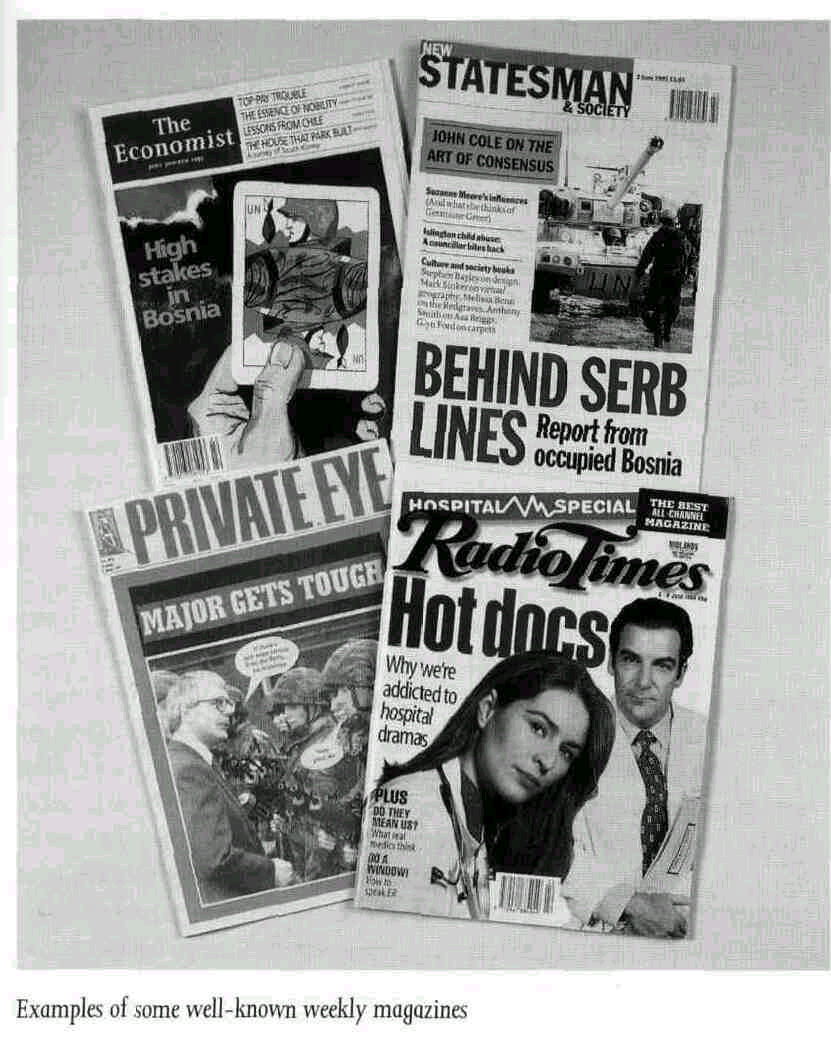
156 16 The media
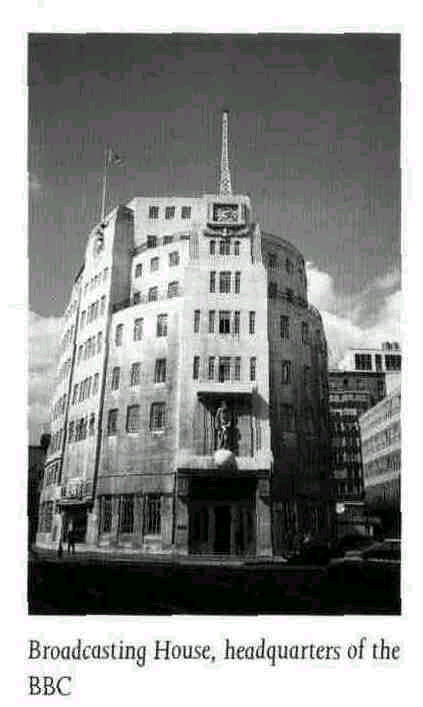
Just as the British Parliament has the reputation for being 'the mother of parliaments', so the BBC might be said to be 'the mother of information services'. Its reputation for impartiality and objectivity in news reporting is, at least when compared to news broadcasting in many other countries, largely justified. Whenever it is accused of bias by one side of the political spectrum, it can always point out that the other side has complained of the same thing at some other time, so the complaints are evenly balanced. In fact, the BBC has often shown itself to be rather proud of the fact that it gets complaints from both sides of the political divide, because this testifies not only to its impartiality but also to its independence.
Interestingly, though, this independence is as much the result of habit and common agreement as it is the result of its legal status. It is true that it depends neither on advertising nor (directly) on the government for its income. It gets this from the licence fee which everybody who uses a television set has to pay. However, the government decides how much this fee is going to be, appoints the BBC's board of governors and its director general, has the right to veto any
>
High ideals and independence
The reference to one man in
the inscription on the right, which is found in the entrance to
Broadcasting House (headquarters of the BBC), is appropriate.
British politicians were slow to appreciate the social
significance of'the wireless' (this is what the radio was generally
known as until the 196os). Moreover, being British, they did
not like the idea of having to debate culture in Parliament. They
were only too happy to leave the matter to a suitable
organization and its director general, John (later Lord) Reith.
Reith was a man with a
mission. He saw in radio an opportunity for 'education' and
initiation into 'high culture' for the masses. He included light
entertainment in the programming, but only as a way of
capturing an audience for the more 'important' programmes of
classical music and drama, and the discussions of various topics by
famous academics and authors whom Reith had persuaded to take
part.
THIS
TEMPLE TO THE ARTS AND MUSES
IS DEDICATED
TO ALMIGHTY GOD BY THE FIRST
GOVERNORS IN THE YEAR OF OUR LORD 1931 JOHN REITH BEING
DIRECTOR-GENERAL AND THEY PRAY THAT THE GOOD SEED SOWN
MAY BRING FORTH GOOD HARVESTS
THAT ALL THINGS FOUL OR HOSTILE TO PEACE
MAY BE BANISHED HENCE AND
THAT THE PEOPLE INCLINING THEIR EAR TO WHATSOEVER THINGS ARE LOVELY
AND HONEST WHATSOEVER THINGS ARE OF GOOD REPORT MAY TREAD THE PATH
OF VIRTUE AND OF WISDOM
BBC programme before it
has been transmitted and even has the right to take away the BBC's
licence to broadcast. In theory, therefore, it would be easy for a
government to influence what the BBC does. Nevertheless,
partly by historical accident (> High ideals and independence),
the BBC began, right from the start, to establish its effective
independence and its reputation for impartiality. This first
occurred through the medium of radio broadcasts to people in
Britain. Then, in 1932 the BBC World Service was set up, "with
a licence to broadcast first to the empire and then to other parts
of the world. During the Second World War it became identified with
the principles of democracy and free speech. In this way the BBC's
fame became international. Today, the World Service still broadcasts
around the globe, in English and in several other languages. In 1986
the Prime Minister of India, Mrs Indhira Ghandi, was assassinated.
When her son Rajiv first heard reports that she had been attacked,
he immediately tuned to the BBC World Service to get details that he
could rely on. The BBC also runs five national radio stations inside
Britain and several local ones (> BBC radio). Television:
organization In
terms of the size of its audience, television has long since taken
over from radio as the most significant form of broadcasting in
Britain. Its independence from government interference is largely a
matter of tacit agreement. There have been occasions when the
government has successfully persuaded the BBC not to show
something. But there have also been many occasions when the BBC has
refused to bow to government pressure. Most recent cases have
involved Northern Ireland. For a brief period starting in the late
1980s, the government broke with the convention of non-interference
and banned the transmission of interviews with members of outlawed
organizations such as the IRA on television. The BBC's response was
to make a mockery of this law by showing such interviews on the
screen with an actor's voice (with just the right accent) dubbed
over the moving mouth of the interviewee! There
is no advertising on the BBC. But Independent Television (ITV),
which started in 19^4, gets its money from the advertisements
it screens. It consists of a number of privately owned companies,
each of which is responsible for programming in different parts
of the country on the single channel given to it. In practice, these
companies cannot afford to make all their own programmes, and so
they generally share those they make. As a result, it is common for
exactly the same programme to be showing on the ITV channel
throughout the country. When
commercial television began, it was feared that advertisers would
have too much control over programming and that the new channel
would exhibit all the worst features of tabloid journalism. The
Labour party, in opposition at the time of its introduction, was
Television
organization 157
>
BBC radio
Radio 1
began broadcasting in 1967. Devoted almost entirely to pop music,
its birth was a signal that popular youth culture could no longer be
ignored by the country's established institutions. In spite of
recent competition from independent commercial radio stations,
it still has over ten million listeners.
Radio 2
broadcasts mainly light music and chat shows.
Radio 3
is devoted to classical music.
Radio
4 broadcasts a variety of programmes, from plays and comedy
shows to consumer advice programmes and in-depth news coverage.
It has a small but dedicated following.
Radio 5
is largely given over to sports coverage and news.
Two particular radio
programmes should be mentioned. Soap operas are normally associated
with television, but The Archers is actually the
longest-running soap in the world. It describes itself as 'an
everyday story of country folk'. Its audience, which is mainly
middle-class with a large proportion of elderly people, cannot
compare in size with the television soaps, but it has become so
famous that everybody in Britain knows about it and tourist
attractions have been designed to capitalize on its fame.
Another radio 'institution' is
the live commentary of cricket Test Matches in the summer (see
chapter 21).
158 16 The media
absolutely against it. So were a number of Conservative and Liberal
politicians. Over the years, however, these fears have proved to be unfounded. Commercial television in Britain has not developed the habit of showing programmes sponsored by manufacturers. There has recently been some relaxation of this policy, but advertisers have never had the influence over programming that they have had in the USA.
Most importantly for the structure of commercial television, ITV news programmes are not made by individual television companies. Independent Television News (ITN) is owned jointly by all of them. For this and other reasons, it has always been protected from com-
Advertising
Early weekday mornings
Mornings and early
afternoons
Late afternoons Evenings
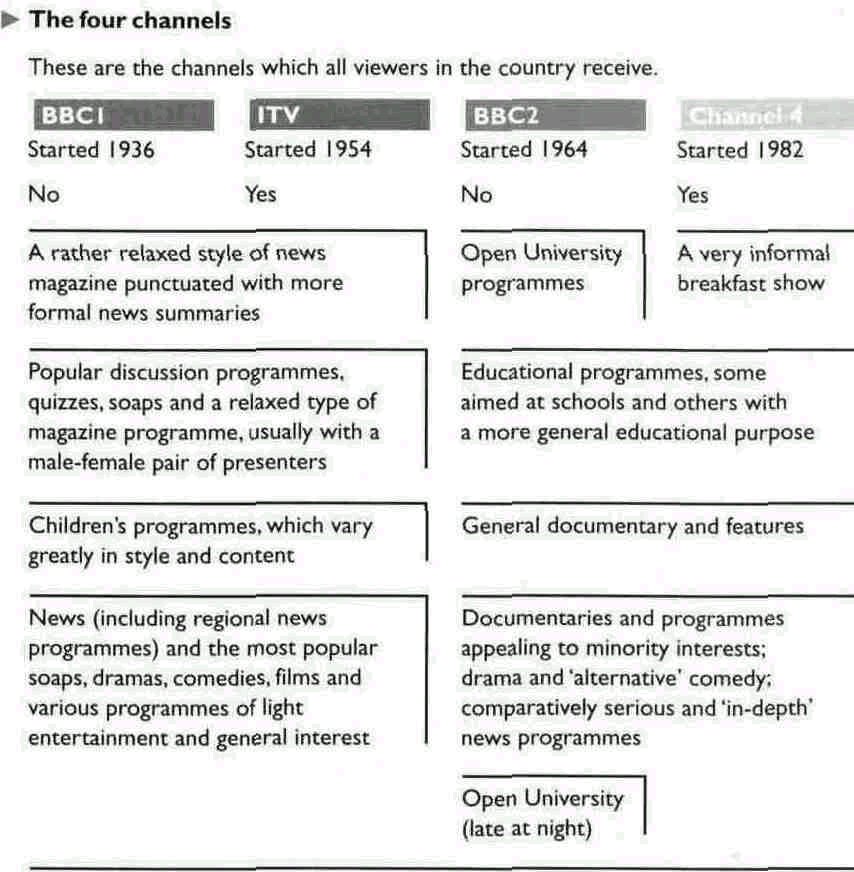
Weekends
Channel 5 Started in 1997. It is a commercial channel (it gets its money from advertising) which is received by about two-thirds of British households. Its emphasis is on entertainment (for example, it screens a film every ni^ht at peak viewing time). However, it makes all other types of programme too. Of particular note is its unconventional presentation of the news, which is designed to appeal to younger adults.
There is also a Welsh language channel for viewers in Wales.
159
mercial influence.
There is no significant difference between the style and content of
the news on ITV and that on the BBC. The
same fears about the quality of television programmes that were
expressed when ITV started are now heard with regard to satellite
and cable television. This time the fears may be more justified, as
the companies that run satellite and cable television channels are
in a similar commercial and legal position to those which own the
big newspapers (and in some cases are actually the same companies).
However, only about a third of households receive satellite and/or
cable, and so far these channels have not significantly reduced the
viewing figures for the main national channels. Television:
style Although
the advent of ITV did not affect television coverage of news and
current affairs, it did cause a change in the style and content of
other programmes shown on television. The amount of money that a
television company can charge an advertiser depends on the expected
number of viewers at the time when the advertisement is to be shown.
Therefore, there was pressure on ITV from the start to make its
output popular. In its early years ITV captured nearly
three-quarters of the BBC's audience. The BBC then responded by
making its own programmes equally accessible to a mass audience.
Ever since then, there has been little significant difference in
what is shown on the BBC and commercial television. Both BBC1 and
ITV (and also the more recent Channel 5) show a wide variety of
programmes. They are in constant competition with each other to
attract the largest audience (this is known as the ratings war). But
they do not each try to show a more popular type of programme than
the other. They try instead to do the same type of programme
'better'. Of
particular importance in the ratings war is the performance of the
channels' various soap operas. The two most popular and long-running
of these, which are shown at least twice a week, are not glamorous
American productions showing rich and powerful people (although
series such as Dallas and Dynasty are sometimes shown). They are
ITV's Coronation Street, which is set in a working-class area near
Manchester, and BBC 1 's EastEnders, which is set in a working-class
area of London. They, and other British-made soaps and popular
comedies, certainly do not paint an idealized picture of life. Nor
are they very sensational or dramatic. They depict (relatively)
ordinary lives in relatively ordinary circumstances. So why are they
popular? The answer seems to be that their viewers can see
themselves and other people they know in the characters and, even
more so, in the things that happen to these characters. The
British prefer this kind of pseudo-realism in their soaps. In the
early 1990s, the BBC spent a lot of money filming a new soap called
Eldorado, set in a small Spanish village which was home to a large
number of expatriate British people. Although the BBC used its most
>
Glued to the goggle box
As long ago as 1953, it was
estimated that twenty million viewers watched the BBC's coverage of
the coronation of Queen Elizabeth II. By1970, 94% of British
households had a television set (known colloquially as a
'goggle box'), mostly rented rather than bought. Now, 99% of
households own or rent a television and the most popular programmes
are watched by as many people as claim to read the Sun and the Daily
Mirror combined.
Television broadcasting in
Britain has expanded to fill every part of every day of the week.
One of the four channels (ITV) never takes a break (it broadcasts
for twenty-four hours) and the others broadcast from around six in
the morning until after midnight. A survey reported in early 1994
that 40% of British people watched more than three hours of
television every day; and 16% watched seven hours or more!
Television news is watched every day by more than half of the
population. As a result, its presenters are among the
best-known names and faces in the whole country — one of them once
boasted that he was more famous than royalty!
160 16 The media
>
The ratings: a typical week
The ratings are dominated by
the soaps (Coronation Street, EastEnders, Neighbours and Emmerdale)
and soap-style dramas (Casualty, which is set in a hospital, and
The Bill, which is about the police). Light-entertainment talk
shows also feature prominently (e.g. This Is Your Life,
Barrymore and Noel's House Party) and quiz shows are sometimes very
popular (e.g. Countdown). It is unusual that only one comedy
programme appears below (Red Dwarf). Certain cinema films can also
get high ratings (marked ** below). Science fiction remains a
popular genre; Quantum
Leap and Red Dwarf are both long-running series. Sports programmes
appear in the top ten when they feature a particular sporting
occasion.
This happens frequently. There is one example in the list below
(The Big Fight Live).
The list includes just one
representative of 'high culture': the dramatization of
the novel Middlemarch, by the nineteenth century author George
Eliot. There are two documentaries, a travel series (Great
Railway Journeys) and a science series (Horizon).
The Antiques Roadshow comes
from a different location in the country every week. In it, local
people bring along objects from their houses and ask experts how
much they are worth.
Apart from the films, there
is only one American programme in the list below (Quantum Leap).
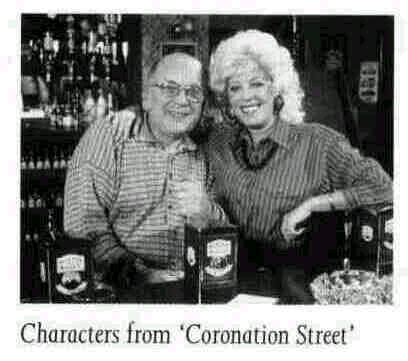
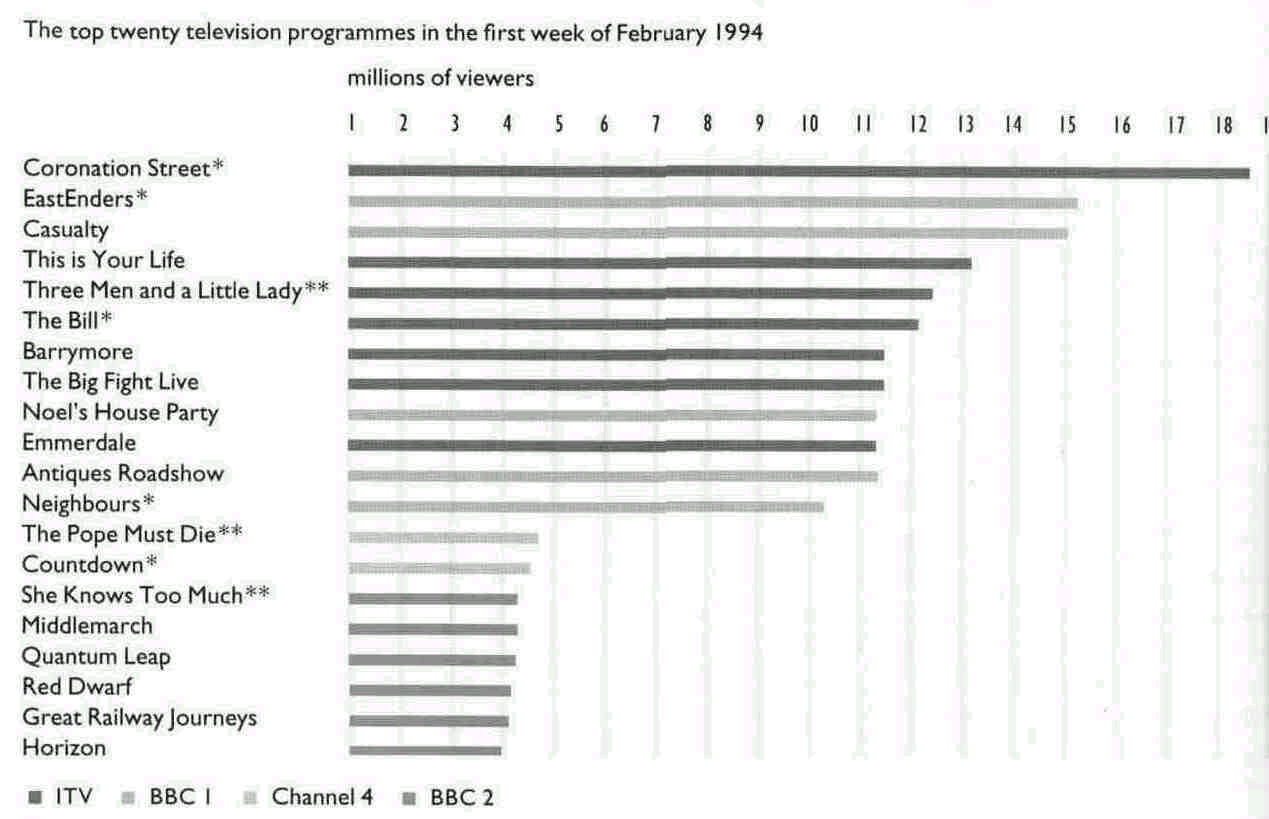
* Average for the week (programmes shown more than once a week) ** Film
Source: BARB (Broadcasters'Audience Research Board Ltd)
Question and suggestion 161
successful soap producers and directors, it was a complete failure. Viewers found the complicated storylines and the Spanish accents too difficult to follow, and could not identify with the situations in which the characters found themselves. It was all just too glamorous for them. It was abandoned after only a year.
It became obvious in the early i 96os that the popularity of soap operas and light entertainment shows meant that there was less room for programmes which lived up to the original educational aims of television. Since 1982 Britain has had two channels (BBC2 and Channel 4) which act as the main promoters of learning and 'culture'. Both have been successful in presenting programmes on serious and weighty topics which are nevertheless attractive to quite large audiences. BBC2 is famous for its highly acclaimed dramatizations of great works of literature and for certain documentary series that have become world-famous 'classics' (the art history series Civilisation and the natural history series Life On Earth are examples). Another thing that these channels do well, particularly Channel 4, is to show a wide variety of programmes catering to minority intersts - including, even, subtitled foreign soap operas!
QUESTIONS
1 It is easy to tell by the size and shape of British newspapers what kinds.of readers they are aimed at. What are the two main types called, and who reads them? What other differences are there between newspapers? Are there similarly clear distinctions between types of newspaper in your country?
2 The dominant force in British Broadcasting is the BBC. What enabled it to achieve its position, and how does it maintain this? Can you describe some of the characteristics which give the BBC its special position in Britain and in the rest of the world?
3 There is one aspect of newspaper publishing which, in the 1980s and 1990s, received a lot of public and parliamentary criticism. People
felt that the invasion of privacy of private individuals and public figures (such as members of the royal family) had reached unacceptable levels. Legislation was drafted, but there was no new law passed to control the press's activities. What problems are there in Britain with getting legislation like this approved? What arguments can be put forward in favour of keeping the status quo? How is the press controlled in your country?
4 What does the television ratings chart tell you about British viewing habits? Does this tell you anything about the British? What are the most popular television programmes in your country? What does this reveal, if anything, about your nation?
SUGGESTIONS
* Have a look at a couple of examples of each type of national newspaper. Try to get hold of examples from the same day. * If you don't already do so, listen to the BBC World Service if you can.
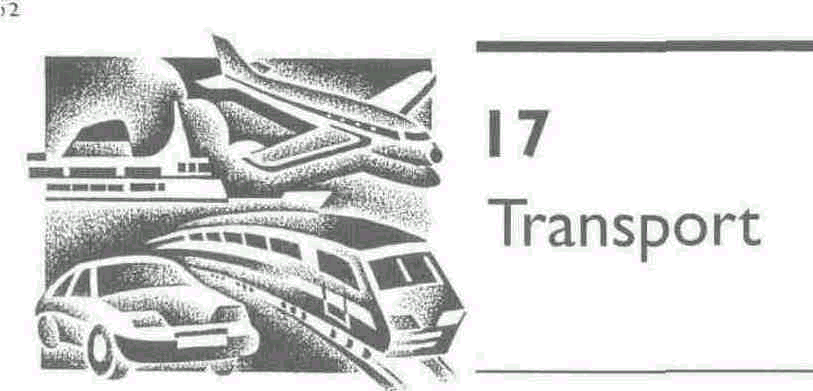
>.
The romance of travel: the steam engine
Perhaps because they were the
first means of mass transportation, perhaps because they go through
the heart of the countryside, there is an aura of romance attached
to trains in Britain. Many thousands of people are enthusiastic
'train spotters' who spend an astonishing amount of time at
stations and along the sides of railway lines trying to 'spot' as
many different engines as possible. Steam trains, symbolizing the
country's lost industrial power, have the greatest romance of
all. Many enthusiasts spend their free time keeping them in
operation and finance this by offering rides to tourists. In
1993 more than 10 million journeys were taken on steam trains in
Europe. More than 80% of those journeys were taken in Britain. >
The AA and the RAC These
are the initials of the Automobile Association and the Royal
Automobile Club. A driver who joins either of them (by paying a
subscription) can get emergency help when his or her car breaks
down. The fact that both organizations are very well-known is
an - indication of the importance of the car in modern British
life.
The British are
enthusiastic about mobility. They regard the opportunity to
travel far and frequently as a right. Some commuters spend up to
two or three hours each day getting to work in London or some other
big city and back home to their suburban or country homes in the
evening. Most people do not spend quite so long each day
travelling, but it is taken for granted that few people live
near enough to their work or secondary school to get there on foot. As
elsewhere in Europe, transport in modern Britain is dominated by
the motor car and there are the attendant problems of traffic
congestion and pollution. These problems are, in fact, more acute
than they are in many other countries both because Britain is
densely populated and also because a very high proportion of goods
are transported by road. There is an additional reason for
congestion in Britain. While the British want the freedom to move
around easily, they do not like living near big roads or railways.
Any proposed new road or rail project leads to 'housing blight'.
The value of houses along or near the proposed route goes down.
Every such project is attended by an energetic campaign to stop
construction. Partly for this reason, Britain has, in proportion to
its population, fewer kilometres of main road and railway than
any other country in northern Europe. Transport
policy is a matter of continual debate. During the 1980s the
government's attitude was that public transport should pay for
itself (and should not be given subsidies) and road building was
given priority. However, the opposite point of view, which argues
in favour of public transport, has become stronger during the
1990s, partly as a result of pressure from environmental groups. It
is now generally accepted that transport policy should attempt to
more than merely accommodate the predicted doubling in the number
of cars in the next thirty years, but should consider wider issues. On
the road Nearly
three-quarters of households in Britain have regular use of a car
and about a quarter have more than one car. The widespread
enthusiasm for cars is, as elsewhere, partly a result of people
using them to project an image of themselves. Apart from the
obvious status indicators such as size and speed, the British
system of vehicle regis-
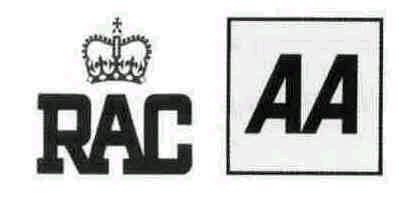
(ration introduces
another. Registration plates, known as 'number plates', give a clear
indication of the age of cars. Up to 1999 there was a different
letter of the alphabet for each year and in summer there were a lot
of advertisements for cars on television and in the newspapers
because the new registration 'year' began in August. Another
possible reason for the British being so attached to their cars is
the opportunity which they provide to indulge the national passion
for privacy. Being in a car is like taking your 'castle' with you
wherever you go (see chapter 19). Perhaps this is why the occasional
attempts to persuade people to 'car pool' (to share the use of a car
to and from work) have met with little success. The
privacy factor may also be the reason why British drivers are less
'communicative' than the drivers of many other countries. They use
their horns very little, are not in the habit of signalling their
displeasure at the behaviour of other road users with their hands
and are a little more tolerant of both other drivers and
pedestrians. They are also a little more safety conscious. Britain
has the best road safety record in Europe. The speed limit on
motorways is a little lower than in most other countries (70 mph
=112 kph) and people go over this limit to a somewhat lesser extent.
In addition, there are frequent and costly government campaigns to
encourage road safety. Before Christmas 1992, for instance, £ 2.3
million was spent on such a campaign. Another
indication that the car is perceived as a private space is that
Britain was one of the last countries in western Europe to
introduce the compulsory wearing of seat belts (in spite of
British concern for safety). This measure was, and still is,
considered by many to be a bit of an infringement of personal
liberty. The
British are not very keen on mopeds or motorcycles. They exist, of
course, but they are not private enough for British tastes. Every
year twenty times as many new cars as two-wheeled motor vehicles are
registered. Millions of bicycles are used, especially by younger
people, but except in certain university towns such as Oxford and
Cambridge, they are not as common as they are in other parts of
north-western Europe. Britain has been rather slow to organize
special cycle lanes. The comparative safety of the roads means that
parents are not too worried about their children cycling on the road
along with cars and lorries. Public
transport in towns and cities Public
transport services in urban areas, as elsewhere in Europe, suffer
from the fact that there is so much private traffic on the roads
that they are not as cheap, as frequent or as fast as they otherwise
could be. They also stop running inconveniently early at night.
Efforts have been made to speed up journey times by reserving
certain lanes for buses, but so far there has been no widespread
attempt to give priority to public transport vehicles at traffic
lights.
>
The decline of the lollipop lady
In 19^3 most schoolchildren
walked to school. For this reason, school crossing patrols were
introduced. A 'patrol' consists of an adult wearing a bright
waterproof coat and carrying a red-and-white stick with a
circular sign at the top which reads STOP, CHILDREN. Armed with this
'lollipop', the adult walks out into the middle of the road, stops
the traffic and allows children to cross. 'Lollipop ladies ' (80% of
them are women) are a familiar part of the British landscape. But
since the 1980s, they have become a species in decline. So many
children are now driven to school by car that local authorities are
less willing to spend money on them. However, because there are more
cars than there used to be, those children who are not driven to
school need them more than ever. The modern lollipop lady has
survived by going commercial! In 1993 Volkswagen signed a deal to
dress London's 1 ,000 lollipop ladies in coats which bear the
company's logo. Many other local authorities in the country arranged
similar deals.
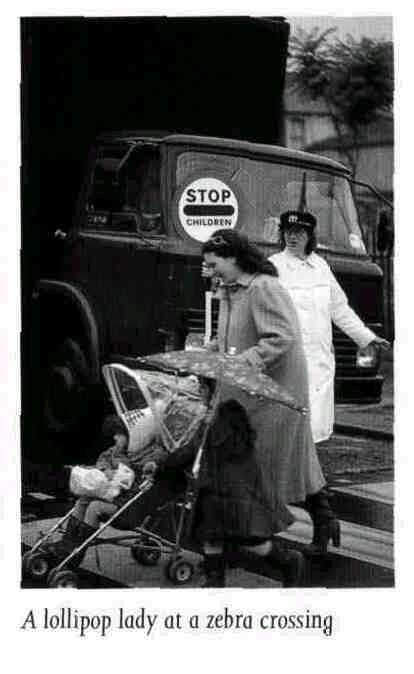
164
17
Transport >
The road to hell
The M25; is the motorway which
circles London. Its history exemplifies the transport crisis in
Britain. When the first section was opened in 1963 it was seen as
the answer to the area's traffic problems. But by the early 1990s
the congestion on it was so bad that traffic jams had become an
everyday occurrence. A rock song of the time called it 'the road to
hell'. In an effort to relieve the congestion, the government
announced plans to widen some parts of it to fourteen lanes - and
thus to import from America what would have been Europe's first
'super highways'. This plan provoked widespread opposition.
>
What the British motorist hates most
Traffic wardens are not police officers,
but they have the force of law behind them as they walk around
leaving parking tickets on the windscreens of cars that are
illegally parked. By convention, they are widely feared and disliked
by British motorists. Every year there are nearly a hundred serious
attacks on them. In 1993 government advisers decided that their
image should change. They were officially renamed 'parking
attendants' (although everyone still calls them traffic wardens).
Traffic cones are orange and
white, about a metre tall and made of plastic. Their appearance
signals that some part of the road ahead (the part marked out by the
cones) is being repaired and therefore out of use, and that
therefore there is probably going to be a long delay. Workers
placing them in position have had eggs thrown at them and lorry
drivers have been accused by police of holding competitions to run
them down. On any one day at least 100,000 of them are in use on the
country's roads.
An
interesting modern development is that trams, which disappeared
from the country's towns during the i 9^os and i 96os, are now
making a comeback. Research has shown that people seem to have more
confidence in the reliability of a service which runs on tracks, and
are therefore readier to use a tram than they would be to use an
ordinary bus. Britain
is one of the few countries in Europe where double-decker buses
(i.e. with two floors) are a common sight. Although single-deckers
have also been in use since the i 96os, London still has more than
3,000 double-deckers in operation. In their original form they were
'hop-on, hop-off' buses. That is, there were no doors, just an
opening at the back to the outside. There was a conductor who walked
around collecting fares while the bus was moving. However, most
buses these days, including double-deckers, have separate doors for
getting on and off and no conductor (fares are paid to the driver). The
famous London Underground, known as 'the tube', is feeling the
effects of its age (it was first opened in 1863). It is now one of
the dirtiest and least efficient of all such systems in European
cities. However, it is still heavily used because it provides
excellent connections with the main line train stations and
with the suburbs surrounding the city. Another
symbol of London is the distinctive black taxi (in fact, they are
not all black these days, nor are they confined to London).
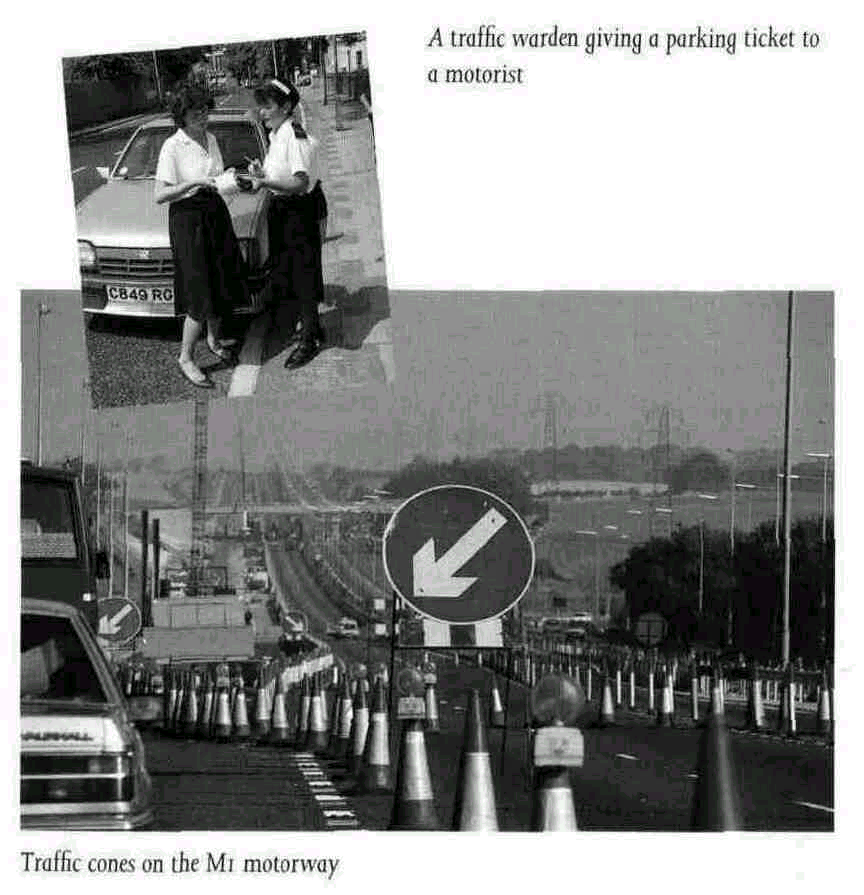
According to the
traditional stereotype, the owner-drivers of London taxis, known as
cabbies, are friendly Cockneys (see chapter 4) who never stop
talking. While it may not be true that they are all like this, they
all have to demonstrate, in a difficult examination, detailed
familiarity with London's streets and buildings before they are
given their licence. (This familiarity is known simply as 'the
knowledge'.) Normally, these traditional taxis cannot be hired by
phone. You simply have to find one on the street. But there are also
many taxi companies who get most of their business over the phone.
Their taxis are known as 'minicabs'. They tend to have a reputation,
not always justified, for unreliability as well as for charging
unsuspecting tourists outrageous prices (in common with taxis all
over the world). However, taxis and minicabs are expensive and most
British people rarely use them, except, perhaps, when going home
late at night after public transport has stopped running, especially
if they have been drinking alcohol. Public
transport between towns and cities It
is possible to travel on public transport between large towns or
cities by road or rail. Coach services are generally slower than
trains but are also much cheaper. In some parts of the country,
particularly the south-east of England, there is a dense suburban
rail network, but the most commercially successful trains are the
Inter-City services that run between London and the thirty or so
largest cities in the country. The
difference between certain trains is a fascinating reflection of
British insularity. Elsewhere in Europe, the fastest and smartest
trains are the international ones. But in Britain, they are the
Inter-City trains. The international trains from London to the
Channel ports of Newhaven, Dover and Ramsgate are often
uncomfortable commuter trains stopping at several different
stations. The
numbers of trains and train routes were slowly but continuously
reduced over the last forty years of the twentieth century. In
October 1993 the national train timetable scheduled 10,000 fewer
trains than in the previous October. The changes led to many
complaints. The people of Lincoln in eastern England, for
example, were worried about their tourist trade. This town, which
previously had fifteen trains arriving on a Sunday from four
different directions, found that it had only four, all arriving from
the same direction. The Ramblers' Association (for people who like
to go walking in the countryside) were also furious because the ten
trains on a Sunday from Derby to Matlock, near the highest mountains
in England, had all been cancelled. At the time, however, the
government wanted very much to privatize the railways. Therefore, it
had to make them look financially attractive to investors, and the
way to do this was to cancel as many unprofitable services as
possible.
Pablic
transport 165
>Queueing An
Englishman, even if he is alone,
forms an orderly
queue of one.
GEORGE MIKES Waiting
for buses allows the British to indulge their supposed passion for
queueing. Whether this really signifies civilized patience is
debatable (see chapter 5).
But queueing is certainly taken seriously. When buses serving
several different numbered routes stop at the same bus stop,
instructions on it sometimes tell people to queue on one side for
some of the buses and on the other side for others. And yes, people
do get offended if anybody tries to 'jump the queue'.
>
The dominance of London
The arrangement of the
country's transport network illustrates the dominance of London.
London is at the centre of the network, with a 'web' of roads and
railways coming from it. Britain's road-numbering system, (M for
motorways, then A, B and C class roads) is based on the direction
out of London that roads take.
It is notable that the names
of the main London railway stations are known to almost everybody in
the country, whereas the names of stations in other cities are
only known to those who use them regularly or live nearby. The names
of the London stations are: Charing Cross, Euston, King's Cross,
Liverpool Street, Paddington, St Pancras, Victoria, Waterloo.
Each runs trains only in a certain direction out of London. If your
journey takes you through London, you have to use the Underground to
get from one of these stations to another.
166 17 Transport
>Le
compromise
One small but remarkable
success of the chunnel (the Channel tunnel) enterprise seems to be
linguistic. You might think that there would have been some
argument. Which language would be used to talk about the chunnel
and things connected with it? English or French? No problem! A
working compromise was soon established, in which English
nouns are combined with French words of other grammatical classes.
For example, the company that built the chunnel is called
Trans-monche Link (la Manche is the French name for the Channel),
and the train which carries vehicles through the tunnel is
officially called Le Shuttle.
This linguistic mixing
quickly became popular in Britain. On i12 February 1994, hundred of
volunteers walked the 50
kilometres through the chunnel to raise money for charity. The
Daily Mail, the British newspaper that organized the event,
publicized it as 'Le walk', and the British media reported on the
progress of 'Les walkers'.
The
story of the chunnel On
Friday 6 May 1994, Queen Elizabeth II of Britain and President
Mitterand of France travelled ceremonially under the sea that
separates their two countries and opened the Channel tunnel
(often known as 'the chunnel') between Calais and Folkestone. For
the first time ever, people were able to travel between Britain and
the continent without taking their feet off solid ground. The
chunnel was by far the biggest building project in which Britain
was involved in the twentieth century. The history of this project,
however, was not a happy one. Several workers were killed during
construction, the price of construction turned out to be more than
double the £4.5 billion first estimated and the start of regular
services was repeatedly postponed, the last time even after tickets
had gone on sale. On top of all that, the public showed little
enthusiasm. On the day that tickets went on sale, only 138 were
sold in Britain (and in France, only 12!). On the next day, an
informal telephone poll found that only 5% of those calling said
that they would use the chunnel. There
were several reasons for this lack of enthusiasm. At first the
chunnel was open only to those with private transport. For them,
the small saving in travel time did not compensate for the
comparative discomfort of travelling on a train with no windows and
no facilities other than toilets on board, especially as the
competing ferry companies had made their ships cleaner and
more luxurious. In addition, some people felt it was unnatural and
frightening to travel under all that water. There were also fears
about terrorist attacks. However unrealistic such fears were, they
certainly interested Hollywood. Every major studio was soon
planning a chunnel disaster movie! The
public attitude is becoming more positive, although very slowly.
The direct train services between Paris and London and Brussels and
London seem to offer a significant reduction of travel time when
compared to travel over the sea, and this enterprise has been more
of a success. At the time of writing, however, the highspeed
rail link to take passengers between the British end of the chunnel
and London has not been completed. Air
and water A
very small minority, of mostly business people, travel within
Britain by air. International air travel, however, is very
important economically to Britain. Heathrow, on the western
edge of London, is the world's busiest airport. Every year, its
four separate terminals are used by more than 30 million
passengers. In addition, Gatwick Airport, to the south of London,
is the fourth busiest passenger airport in Europe. There are two
other fairly large airports close to London (Stansted and Luton)
which deal mainly with charter flights,
and there is also the small City Airport, which caters mainly for
business travellers between London and north-western Europe.
There are plans for a fifth terminal at Heathrow, bigger than the
other four combined. The aim is to double the capacity of Heathrow
by the year 2015. However, while some British people may be proud at
the prospect of Heathrow retaining its world number-one position,
others are not so pleased. The problem is the noise (which British
people tend to regard as an invasion of their privacy). Local
farmers and the hundreds of thousands of people who live under
Heathrow's flight path are objecting to the idea. The airport
planners are arguing that the next generation of planes will be much
quieter than present-day ones. Nevertheless, the plan is going to
have to win a tough fight before it goes ahead.
Modern Britain makes surprisingly little use of its many inland were
busy thoroughfares, and the profession of'waterman', the river
equivalent of the London cabbie, was well-known. In the last hundred
years transport by land has almost completely taken over. A few
barges still go up and down the Thames through London, but are used
mostly by tourists. Several attempts have been made to set up a
regular service for commuters, but none has been a success so far.
There is no obvious practical reason for this failure. It just seems
that British people have lost the habit of travelling this way.
The story of goods transport by water is the same. In the nineteenth
century, the network of canals used for this purpose was vital to
the country's economy and as extensive as the modern motorway
network. The vast majority of these canals are no longer used in
this way. Recently the leisure industry has found a use for the
country's waterways with the increasing popularity of boating
holidays.
Question
167
>
Monster jumbos
British Airways is one of the
biggest airlines in the world. Its ambitious plans for the future
include operating an enormous new kind of jumbo aircraft. This
will not travel any faster than today's aircraft, but will be big
enough for passengers to move around inside in rather the same way
as they do on a ship. There will be no duty-free trolleys or meals
coming round; instead, passengers will go to the bar, cafe or shop
to get what they want. First class travellers will have sleeping
cabins and a fully-equipped business area. But how many airports
will be able to accomodate the new monsters of the sky?
|
QUESTIONS |
|
|
1 The car is the preferred means of transport for most people in Britain. The same is probably true in your country. What effects has this had, in Britain and in your country? |
3 Although freedom of movement (usually by car) is dear to the hearts of most British people, there is something even more dear to their hearts which makes the building of new roads a slow and difficult process. What is this? Does the objection to new roads, rail links and even airport terminals surprise you?
|
|
2 Many people in Britain are beginning to realize that other means of transport, apart from the car, should be used. What kinds of presently under-used means of transport are being revived in Britain, and where do people argue that money should be spent by the government instead of on building more new roads? |
4 British individualism shows itself in many ways in the area of transport. Can you find examples in this chapter |

>
The origins of the welfare state in Britain
Before the twentieth century, welfare
was considered to be the responsibility of local communities. The
'care' provided was often very poor. An especially hated
institution m the nineteenth century was the workhouse, where the
old, the sick, the mentally handicapped and orphans were sent.
People were often treated very harshly in workhouses, or given
as virtual slaves to equally harsh employers.
During the first half of the
twentieth century a number of welfare benefits were introduced
These were a small old-age pension scheme (1908), partial sickness
and unemployment insurance (1912) and unemployment benefits
conditional on regular contributions and proof of need (1934)
The real impetus for the welfare state came m 1942 from a
government commission, headed by William Bevendge, and its
report on 'social insurance and allied services' In 1948 the
National Health Act turned the report's recommendations into law
and the National Health Service was set up
The mass rush for free
treatment caused the government health bill to swell enormously In
response to this, the first payment within the NHS (a small fixed
charge for medicines) was introduced in 1951. Other charges (such
as that for dental treatment in 1952) followed.
18
Welfare
Britain can claim to
have been the first large country in the world to have accepted
that it is part of the job of government to help any citizen in
need and to have set up what is generally known as a 'welfare
state'. The
benefits system The
most straightforward way in which people are helped is by direct
payments of government money. Any adult who cannot find paid work,
or any family whose total income is not enough for its basic needs,
is entitled to financial help. This help comes in various ways and
is usually paid by the Department of Social Security.
Anyone below the retirement age of sixty-five who has previously
worked for a certain minimum period of time can receive
unemployment benefit (known colloquially as 'the dole'). This
is organized by the Department of Employment.
All retired people are entitled to the standard old-age pension,
provided that they have paid their national insurance contributions
for most of their working lives. After a certain age, even people
who are still earning can receive their pension (though at a
slightly reduced rate). Pensions account for the greatest
proportion of the money which the government spends on benefits.
The government pension, however, is not very high. Many people
therefore make arrangements during their working lives to have some
additional form of income after they retire. They may, for
instance, contribute to a pension fund (also called a
'superannuation scheme'). These are usually organized by employers
and both employer and employee make regular contributions to them.
A life insurance policy can also be used as a form of saving. A
lump sum is paid out by the insurance company at around the age of
retirement.
Some people are entitled to neither pension nor unemployment
benefit (because they have not previously worked for long enough or
because they have been unemployed for a long time). These people
can apply for income support (previously called supplementary
benefit) and if they have no significant savings, they will receive
it. Income support is also sometimes paid to those with paid work
but who need extra money, for instance because they have a
particularly large family or because their earnings are especially
low.
Social services and charities 169
A
wide range of other benefits exist. For example, child benefit is a
small weekly payment for each child, usually paid direct to mothers.
Other examples are housing benefit (distributed by the local
authority, to help with rent payments), sickness benefit,
maternity benefit and death grants (to cover funeral expenses). The
system, of course, has its imperfections. On the one hand, there are
people who are entitled to various benefits but who do not receive
them. They may not understand the complicated system and not know
what they are entitled to, or they may be too proud to apply. Unlike
pensions and unemployment benefit, claiming income support involves
subjecting oneself to a 'means test'. This is an official
investigation into a person's financial circumstances which some
people feel is too much of an invasion of their privacy. On the
other hand, there are people who have realized that they can have a
higher income (through claiming the dole and other benefits) when
not working than they can when they are employed. The
whole social security system is coming under increasing pressure
because of the rising numbers of both unemployed people and
pensioners. It is believed that if everybody actually claimed the
benefits to which they are entitled, the system would reach breaking
point. It has long been a principle of the system that most benefits
are available to everybody who qualifies for them. You don't have to
be poor in order to receive your pension or your dole money or your
child benefit. It is argued by some people that this blanket
distribution of benefits should be modified and that only those
people who really need them should get them. However, this brings up
the possibility of constant means tests for millions of households,
which is a very unpopular idea (and would in itself be very
expensive to administer). Social
services and charities As
well as giving financial help, the government also takes a more
active role in looking after people's welfare. Services are run
either directly or indirectly (through 'contracting out' to private
companies) by local government. Examples are the building and
running of old people's homes and the provision of 'home helps' for
people who are disabled. Professional
social workers have the task of identifying and helping members of
the community in need. These include the old, the mentally
handicapped and children suffering from neglect or from
maltreatment. Social workers do a great deal of valuable work. But
their task is often a thankless one. For example, they are often
blamed for not acting to protect children from violent parents. But
they are also sometimes blamed for exactly the opposite — for
taking children away from their families unnecessarily. There seems
to be a conflict of values in modern Britain. On the one hand, there
is the traditional
>
The language of benefits
With the gradually increasing
level of unemployment in the last quarter of the twentieth century,
many aspects of unemployed life have become well-known in society at
large. Receiving unemployment benefit is known as being 'on the
dole' and the money itself is often referred to as 'dole money'. In
order to get this money, people have to regularly present their
UB40s (the name of the government form on which their lack of
employment is recorded) at the local social security office and
'sign on' (to prove that they don't have work). They will then get
(either directly or through the post) a cheque which they can cash
at a post office. This cheque is often referred to as a 'giro'.
170 18 Welfare
A
poster advertising the Samaritans (see below) >
Some well-known charities
The Samaritans organization
offers free counselling by phone, with anonymity guaranteed, to
anybody who is in despair and thinking of committing suicide.
The Salvation Army is
organized on military lines and grew out of Christian missionary
work in the slums of London in the nineteenth century. It offers
help to the most desperate and needy, for example, overnight
accommodation in hostels for the homeless.
Barnado's, also founded in
the nineteenth century, used to provide homes for orphaned children
and still helps children in need.
MENCAP is a charity for the
mentally handicapped and campaigns on their behalf. >
Getting medicine on the NHS
When medicine is needed, the
doctor writes out a prescription which the patient then takes to a
chemist's (that is, a pharmacy, but this word is used only by
medical professionals). There is a charge for each prescription,
which is the same regardless of the real cost of the medicine,
although many categories of people are exempt.
respect for privacy
and the importance placed by successive governments on 'family
values'; on the other hand, there is the modern expectation that
public agencies will intervene in people's private lives and their
legal ability to do so. Before
the welfare state was established and the concept of'social
services' came into being, the poor and needy in Britain turned to
the many charitable organizations for help. These organizations
were (and still are) staffed mostly by unpaid volunteers,
especially women, and relied (and still do rely) on voluntary
contributions from the public. There are more than 150,000
registered charities in the country today. Taken together, they
have an income of more than £ 15 billion. Most of them are
charities only in the legal sense (they are non-profit-making and
so do not pay income tax) and have never had any relevance to the
poor and needy. However, there are still today a large number which
offer help to large sections of the public in various ways (o Some
well-known charities). Charities
and the social services departments of local authorities sometimes
co-operate. One example is the 'meals-on-wheels' system, whereby
food is cooked by local government staff and then distributed by
volunteers to the homes of people who cannot cook for themselves.
Another example is the Citizens Advice Bureau (CAB), which has a
network of offices throughout the country offering free information
and advice. The CAB is funded by local authorities and the
Department of Trade and Industry, but the offices are staffed by
volunteers. The
national health service The
NHS (the national health service is commonly referred to by this
abbreviation) is generally regarded as the jewel in the crown of
the welfare state. Interestingly, it is very 'un-British' in the
uniformity and comprehensiveness of its organization. When it was
set up it did not, as was done in so many other areas of British
public life, accommodate itself to what had already come into
existence. Instead of entering into a partnership with the hundreds
of existing hospitals run by charities, it simply took most of them
over. The system is organized centrally and there is little
interaction with the private sector. For instance, there is no
working together with health insurance companies and so there
is no choice for the public regarding which health insurance scheme
they join. Medical insurance is organized by the government and is
compulsory. However,
in another respect the NHS is very typically British. This is in
its avoidance of bureaucracy. The system, from the public's point
of view, is beautifully simple. There are no forms to fill in and
no payments to be made which are later refunded. All that anybody
has to do to be assured the full benefits of the system is to
register with a local NHS doctor. Most doctors in the country are
General Practitioners (GPs) and they are at the heart of the
system. A visit to
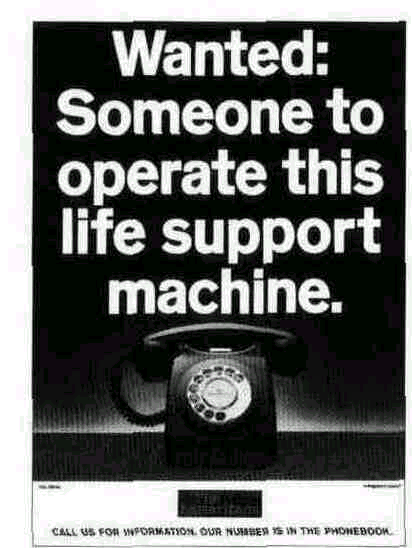
171
the GP is the first
step towards getting any kind of treatment. The GP then arranges for
whatever tests, surgery, specialist consultation or medicine are
considered necessary. Only if it is an emergency or if the patient
is away from home can treatment be obtained in some other way. As
in most other European countries, the exceptions to free medical
care are teeth and eyes. Even here, large numbers of people (for
example, children) do not have to pay and patients pay less than the
real cost of dental treatment because it is subsidized. The
modern difficulties of the NHS are the same as those faced by
equivalent systems in other countries. The potential of medical
treatment has increased so dramatically, and the number of old
people needing medical care has grown so large, that costs have
rocketed. The NHS employs well over a million people, making it the
largest single employer in the country. Medical practitioners
frequently have to decide which patients should get the limited
resources available and which will have to wait, possibly to
die as a result. In
the last few decades, the British government has implemented reforms
in an attempt to make the NHS more cost-efficient. One of these is
that hospitals have to use external companies for duties such as
cooking and cleaning if the cost is lower this way. Another is that
hospitals can 'opt out' of local authority control and become
self-governing 'trusts' (i.e. registered charities). Similarly, GPs
who have more than a certain number of patients on their books can
choose to control their own budgets. Together these two reforms mean
that some GPs now 'shop around' for the best-value treatment for
their patients among various hospitals. These
changes have led to fears that commercial considerations will take
precedence over medical ones and that the NHS system is being broken
down in favour of private health care. And certainly, although pride
and confidence in the NHS is still fairly strong, it is decreasing.
There has been a steady rise in the number of people paying for
private medical insurance (> Private medical care) in addition to
the state insurance contribution which, by law, all employed people
must pay. In
fact, though, Britain's health system can already claim
cost-efficiency. The country spends less money per person on health
care than any other country in the western world. One possible
reason for this is the way that GPs are paid. The money which they
get from the government does not depend on the number of
consultations they perform. Instead, it depends on the number of
registered patients they have — they get a 'capitation' allowance
for each one. Therefore, they have no incentive to arrange more
consultations than are necessary. It is in their interest that their
patients remain as healthy as possible and come to see them as
little as possible, so that they can have more patients on their
books. The other possible reason is the British 'stiff upper lip'.
In general, people do not like to make a big drama out of being ill.
If the doctor tells them that there is nothing
There
are a number of private medical
insurance schemes in the country. The biggest is BUPA. As you can
see, such schemes are becoming increasingly popular. This is not
because people believe that private treatment is any better than NHS
treatment from a purely medical point of view. But it is widely
recognized as being more convenient. NHS patients who need a
non-urgent operation often have to wait more than a year, and even
those who need a relatively urgent operation sometimes have to wait
more than a month. Under private schemes, people can choose to have
their operation whenever, and as soon as, they want. It is this
which is their main attraction. The length of 'waiting lists' for
operations within the NHS is one of the most hotly discussed public
issues. Private patients sometimes use "pay beds' in NHS
hospitals, which are usually in a separate room (NHS patients are
usually accommodated in wards containing ten to twenty beds). There
are also some hospitals and clinics which are completely private.
These are sometimes called 'nursing homes'.
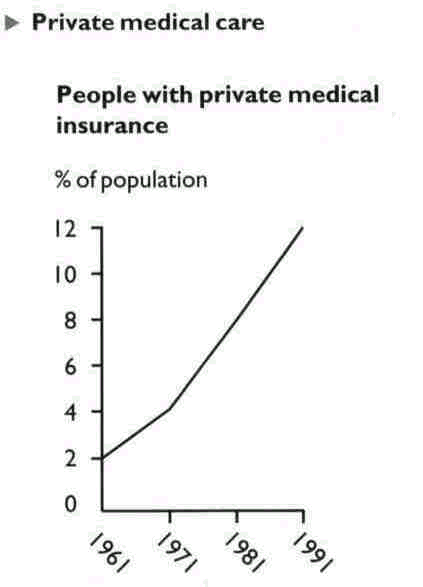
172 18 Welfare
>
Nurses'uniforms
One of the most instantly
recognizable uniforms in Britain is that conventionally worn
by female nurses.
For years it has been widely
criticized as out-of-date and sexist, promoting the image of
nurses as brainless, sexy girls. The annual conference of the Royal
College of Nursing always passes a resolution calling for the
introduction of trousers. Skirts are said to result in back pain
(and thousands of lost working days every year) as nurses struggle
to keep their dignity while lifting heavy patients. The hat is also
criticized as impractical.
It is probable that change is
at last on the
way.
>
The emergency services
From anywhere in Britain, a
person who needs emergency help can call '999' free of charge. The
operator connects the caller to the fire service, the ambulance
service, or the police.
to worry about, they are likely to accept this diagnosis. Partly as
a result of this, British GPs prescribe significantly less medicine
for their patients than doctors in other countries in Europe do.
When it was set up, the NHS was intended to take the financial
hardship out of sickness - to offer people medical insurance 'from
the womb to the tomb'. In this respect, despite the introduction of
charges for some kinds of treatment, it can still claim to be
largely successful. The
medical profession Doctors
generally have the same very high status in Britain that they have
throughout the world. Specialist doctors have greater prestige than
ordinary GPs, with hospital consultants ranking highest. These
specialists are allowed to work part-time for the NHS and spend the
rest of their time earning big fees from private patients. Some
have a surgery in Harley Street in London, conventionally the sign
that a doctor is one of the best. However, the difference in status
between specialists and ordinary GPs is not as marked as it is in
most other countries. At medical school, it is not automatically
assumed that a brilliant student will become a specialist. GPs are
not in any way regarded as second-class. The idea of the family
doctor with persona knowledge of the circumstances of his or her
patients was establishec in the days when only rich people could
afford to pay for the service; of a doctor. But the
NHS capitation system (see above) has encouraged this idea to
spread to the population as a whole. Most
GPs work in a 'group practice’. That is, they work in the sam
building as several other GPs. This allows them to share facilities
such as waiting rooms and receptionists. Each patient is registered
with just one doctor in the practice, but this system means that,
when his or her doctor is unavailable, the patient can be seen by
one of the doctor's colleagues. The
status of nurses in Britain may be traced to their origins in the
nineteenth century. The Victorian reformer Florence Nightingale
became a national heroine for her organization of nursing and
hospital facilities during the Crimean War in the 18^os.
Because other, nurses have an almost saintly image in the minds of
the British public; being widely admired
for their caring work. However, this image suggests that they are
doing their work out of the goodness of their hearts rather than to
earn a living wage. As a result, the nursing profession has always
been rather badly paid and there is a very high turnover of nursing
staff. Most nurses, the vast majority of whom are still women, give
up their jobs after only a few years. The style of the British
nursing profession can also be traced back to its origins. Born at
a time of war, it is distinctively military in its uniforms, its
clear-cut separation of ranks, its insistence on rigid procedural
rules and its tendency to place a high value on group loyalty.
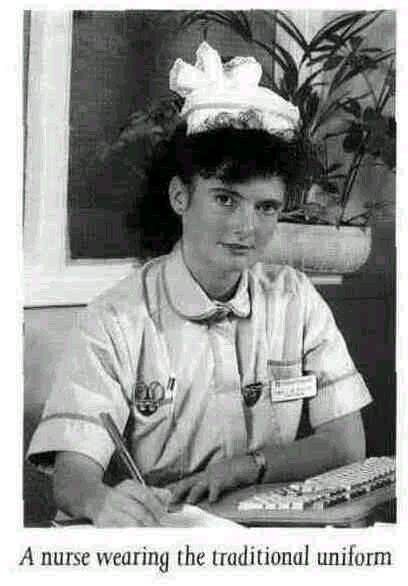
Question
173
>
Alternative medicine
One reason why the British
are, per person, prescribed the fewest drugs in Europe is possibly
the common feeling that many orthodox medicines are dangerous
and should only be taken when absolutely necessary. An increasing
number of people regard them as actually bad for you. These people,
and others, are turning instead to some of the forms of treatment
which generally go under the name of 'alternative medicine'. A great
variety of these are available (reflecting, perhaps, British
individualism). However, the medical 'establishment' (as
represented, for example, by the British Medical Association)
has been slow to consider the possible advantages of such treatments
and the majority of the population still tends to regard them with
suspicion. Homeopathic medicine, for example, is not as widely
available in chemists as it is in some other countries in
northwestern Europe. One of the few alternative treatments to
have originated in Britain are the Bach flower remedies.
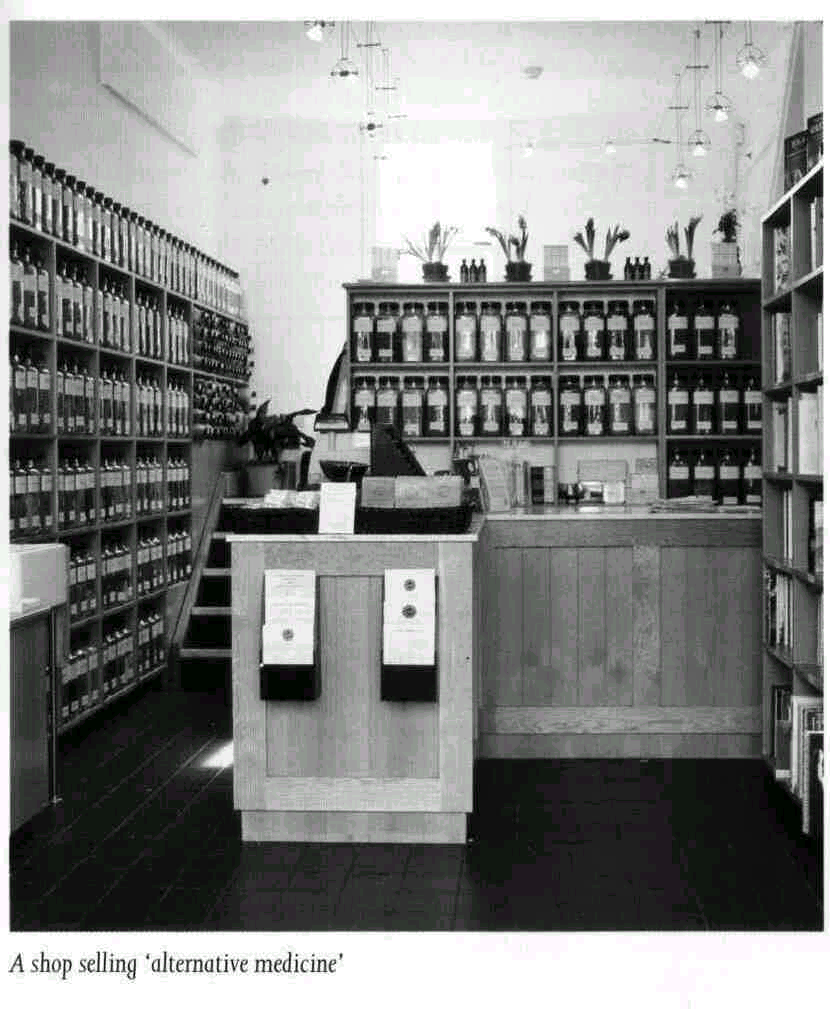
QUESTIONS
1 In Britain, the only people who can choose
whether or not to pay national insurance contributions are the self-employed. More and more of them are choosing not to do so. Why do you think this is?
2 Would you say that the balance in Britain between welfare provided by the state and welfare offered by charities is different from that in your country? In Britain, does the balance appear to be a stable one, or is it shifting in favour of one or the other? Is the same true in your country?
3 From your reading of this chapter do you think that the British welfare state is successful in giving help to everybody who needs it? How many and what kinds of people do you think 'slip through the net' of care?
4 What, according to this chapter, are the main problems of the welfare state in modern Britain? Are similar problems encountered in your country? What solutions have been suggested or tried in Britain? Do you think they are the right ones?
5 How does the general status and public image of nurses in Britain compare with that of nurses in your country?
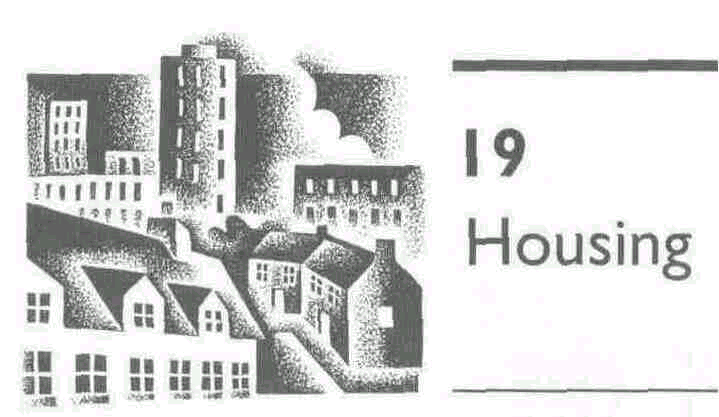
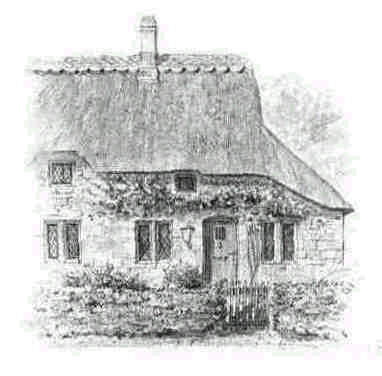
that is, a house which is a separate building. The saying, 'An English man's home is his castle* is well-known. It illustrates the desire for privacy and the importance attached to ownership which seem to be
at the heart of the British attitude to housing.
Houses, not flats
A large, detached house not only ensures privacy. It is also a status symbol. At the extreme end of the scale there is the aristocratic 'stately home' set in acres of garden. Of course, such a house is an unrealistic dream for most people. But even a small detached house surrounded by garden, gives the required suggestion of rural life which is dear to the hearts of many British people. Most people would be happy to live in a cottage, and if this is a thatched cottage, reminiscent of a pre-industrial age, so much the better.
Most people try to avoid living in blocks of flats (what the Americans call 'apartment blocks'). Flats, they feel, provide the least amount of privacy. With a few exceptions, mostly in certain locatior in central London, flats are the cheapest kind of home. The people who live in them are those who cannot afford to live anywhere else,
The dislike of living in flats is very strong. In the 1950s millions c poorer people lived in old, cold, uncomfortable nineteenth century houses, often with only an outside toilet and no bathroom. During the next twenty years many of them were given smart new 'high rise' blocks of flats to live in which, with central heating and bathrooms, were much more comfortable and were surrounded by grass open spaces. But people hated their new homes. They said they felt cut off from the world all those floors up. They missed the neigh-bourliness. They couldn't keep a watchful eye on their children playing down there in those lovely green spaces. The new high-rise blocks quickly deteriorated. The lifts broke down. The lights in the corridors didn't work. Windows got broken and were not repaired. There was graffiti all over the walls.
A thatched cottage: an idealized country ret
175 Houses,not flats
In theory (and except for the difficulty "with supervising children), there is no objective reason why these high-rise blocks (also known as 'tower blocks') could not have been a success. In other countries millions of people live reasonably happily in flats. But in Britain they were a failure because they do not suit British attitudes. The failure has been generally recognized for several years now. No more high-rises are being built. At the present time, only 4% of the population live in one. Only 20% of the country's households live in flats of any kind.
The
most desirable home: a
detached house
The photo is from a builder's
advertisement. Notice: *
the 'traditional' building materials of brick (the walls) and slate
(the roof); *
the irregular, 'non-classical', shape, with all those little
corners, making the house feel 'cosy' (see main text); *
the suggestion of a large front garden with a tree and bushes,
evoking not
only
the countryside but also giving greater privacy;
• that the garage (on the
left) is hidden discretely away, so that it is not too obvious and
doesn't spoil the rural feeling;
• that the front door is
not even in the picture (the privacy criterion at work again).
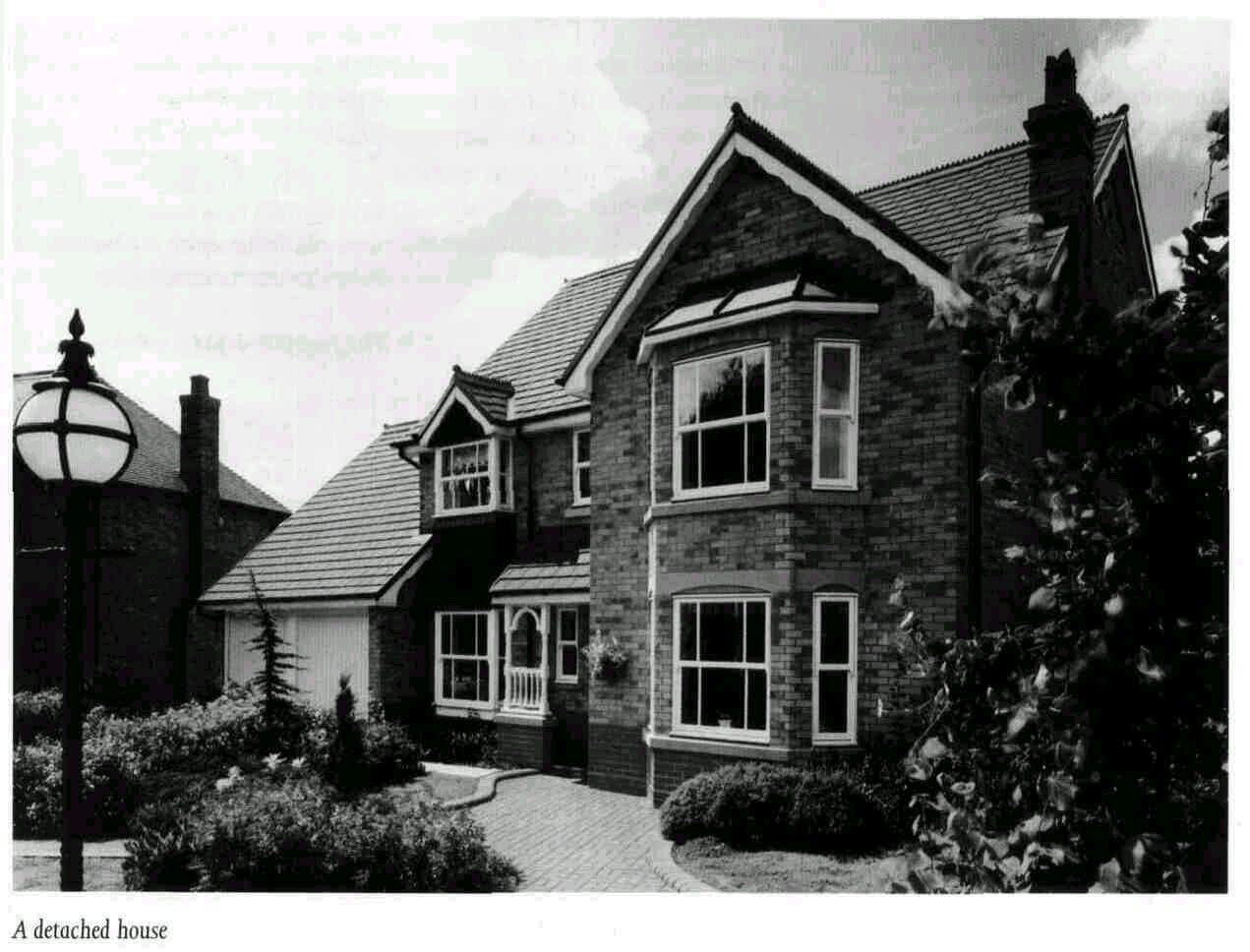
176 19 Housing
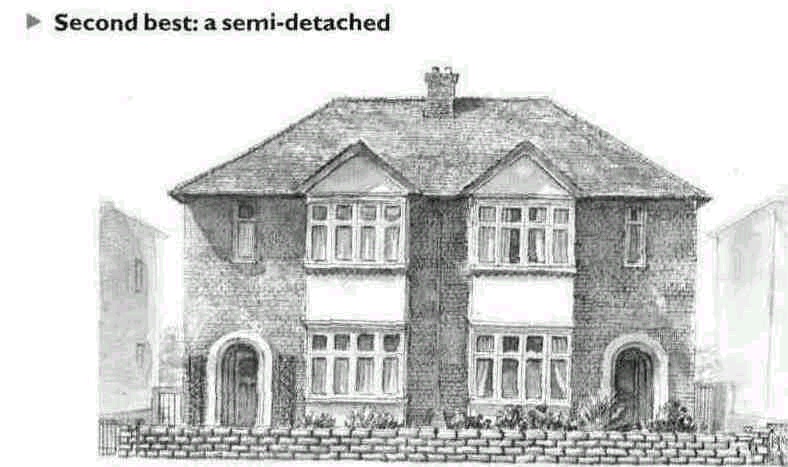
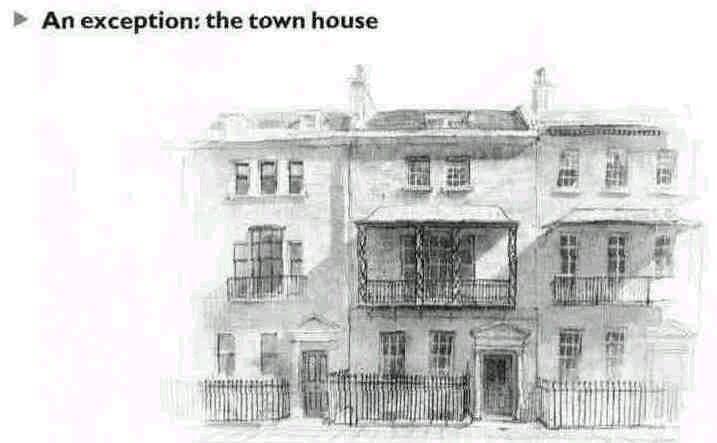
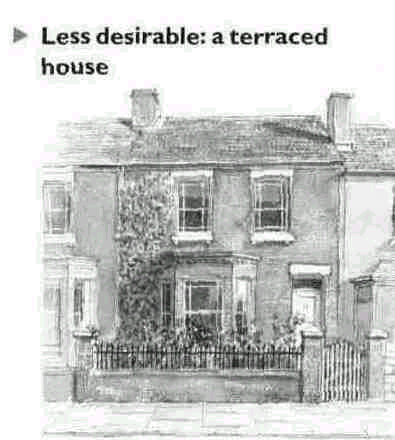

These houses, which can be found in the inner areas of most cities, are an exception to the general pattern. There is great variety regarding both design and use. They often have three or more floors, perhaps including a basement or semi-basement. Although they are usually terraced, those that are well-preserved and in a 'good' area may be thought highly desirable. Many have been broken up into flats or rooms for rent. Most of the comparatively small number
street, in the suburbs of cities and the outskirts of towns all over Britain. Notice the separate front garden for each house. At the sides, there is access to the back, where there will also be two gardens. The most common building material is brick. The typical semi-detached has two floors and three bedrooms.
of people who rent from private owners live in flats of this kind. Sometimes, these are 'self-contained' flats (they have washing and cooking facilities and it is not necessary to walk through anybody else's flat to get to your own); sometimes, they are 'bedsits' (i.e. bed-sitting rooms; residents have one room to themselves and share washing and cooking facilities with other residents).
This kind of house usually has no way through to the back except through the house itself. Each house in the row is joined to the next one. (Houses at the end of the row are a bit more desirable — they are the most like a semi-detached). They usually have two floors, with two bedrooms upstairs. Some have gardens back and front, others only at the back and others no garden at all. Before the 196os, Britain had millions of terraced houses, most with no inside toilet or bathroom. Many of these were then knocked down, but in some areas those that have survived have become quite desirable - after repairs and building work have been carried out.
Not having a separate entrance to the outside world does not suit British tastes. Although it is densely populated, Britain has the second lowest proportion of flat-dwellers in the EU (the lowest of all is in Ireland).
177
Private
property and public property The
image of a home as a castle implies a clear demarcation between
private property and the public domain. This is very clear in the
case of a detached house. Flats, on the other hand, involve
uncertainties. You share the corridor outside your front door, but
who with? The other residents on the same floor, or all the
residents in the building? What about the foyer downstairs? Is this
only for the use of the people who live in the block, or for the
public in general? These uncertainties perhaps explain why the
'communal' living expected of flat-dwellers has been unsuccessful in
most of Britain. Law
and custom seem to support a clear separation between what is public
and what is private. For example, people have no general right to
reserve the road directly outside their house for their own cars.
The castle puts limits on the domain of its owner as well as keeping
out others. It also limits responsibility. It is comparatively rare,
for example, for people to attempt to keep the bit of pavement
outside their house clean and tidy. That is not their job. It is
outside their domain. To
emphasize this clear division, people prefer to live in houses a
little bit set back from the road. This way, they can have a front
garden or yard as a kind of buffer zone between them and the world.
These areas are not normally very big. But they allow residents to
have low fences, walls or hedges around them. Usually, these
barriers do not physically prevent even a two-year old child from
entering, but they have psychological force. They announce to the
world exactly where the private property begins. Even in the depths
of the countryside, where there may be no road immediately outside,
the same phenomenon can be seen. The
importance of 'home’ Despite
the reverence they tend to feel for 'home'. British people have
little deep-rooted attachment to their house as an object, or to the
land on which it stands. It is the abstract idea of'home' which is
important, not the building. This will be sold when the time and
price is right and its occupiers will move into some other house
which they will then turn into 'home' — a home which they will
love just as much as they did the previous one. But
the houses themselves are just investments. An illustration of this
lack of attachment to mere houses (as opposed to homes) is that
two-thirds of all inherited houses are immediately sold by the
people who inherit them, even if these people have lived there
themselves at some time in their lives. Another is the fact that it
is extremely rare for people to commission the building of their own
houses. (Most houses are commissioned either by local government
authorities — for poorer people to live in — or, more
frequently, by private companies known as 'property developers'
who sell them on the open market.)
>
The stately home
There is one exception to the
rule that 'homes' are more important than 'houses'. This is among
the aristocracy. Many of these families own fine old country
houses, often with a great deal of land attached, in which they have
lived for hundreds of years. They have a very great emotional
investment in their houses - and are prepared to try very hard to
stay in them. This can be very difficult in modern times, partly
because of death duties (very high taxes which the inheritor of a
large property has to pay).
So, in order to stay in their
houses, many aristocrats live lives which are less physically
comfortable than those of most people (they may not, for example,
have central heating). Many have also turned their houses and land
into tourist attractions. These are popular not only with foreign
tourists. British visitors are also happy to be able to walk around
in rural surroundings as they inspect a part of their country's
history.
178 19 Housing
A
typical suburban district. You might think that living in one of
these streets would be much the same as living in the one next to
it. But an attempt at individuality is found here too. In Britain,
there are an enormous number of words which are used in place of
the word 'street' (such as avenue, close, crescent, drive, lane and
park). It is quite common to find three streets next to each other
named, for example, 'Pownall Close', 'Pownall Gardens' and 'Pownall
Crescent'. The idea here is that one street is different from a
neighbouring street not just because it has a different name - it
is a different kind of place!
This
attitude is so dominant that it leads to a strange approach towards
house prices. Whenever these fall, it is generally regarded as a
'bad thing'. You might think that it would be a good thing, because
people can then find somewhere to live more cheaply. After all, it
is rising prices that are usually regarded as bad. But with houses
it is the other way around. Falling prices mean that most people
cannot afford to sell their house. They have borrowed a lot of
money to buy it (sometimes more than its present value). They are
stuck! To most British people, such immobility is a terrible
misfortune.
Individuality and conformity
Flats are not
unpopular just because they do not give enough privacy. It is also
because they do not allow enough scope for the expression
of individuality.
People like to choose the colour of their own front door and window
frames, and also to choose what they are going to do
with a little bit of outside territory, however small that may be. The
opportunity which it affords for individual self-expression is
another advantage of the front garden. In any one street, some are
paved, some are full of flowerbeds with paths in between, others
are just patches of grass, others are a mixture of these. Some are
demarcated by "walls, others by fences, others by privet
hedges and some have no barrier at all. The possibilities for
variety are almost endless! However,
not everything about housing in Britain displays individuality.
Because most houses are built by organizations, not individuals,
they are not usually built one at a time. Instead, whole streets,
even neighbourhoods (often called 'estates'), are built at the same
time. For reasons of economy, all the houses on an estate are
usually built to the same design. Viewed from the air, adjacent
streets in British towns often seem to be full of houses that are
identical (> Similar, but not the same). Indeed, they are so
similar that when a building company advertises a new estate, it
often invites people to its 'show home'. This is just one of the
houses, but by looking around it, people can get a fairly accurate
impression of any house on the estate.
But if, later, you walked down the
same streets that you saw from the air, every single house would
seem different. The residents will have made sure of that! In an
attempt to achieve extra individuality, some people even give their
house a name (although others regard this as pretentious). In
suburbs and towns, there is a constant battle going on between the
individualistic desires of the householder and the necessity for
some element of regimentation in a densely populated area.
This contest is illustrated by the fact that anybody who wants to
build an extension to their house, or even a garden shed, must (if
it is over a certain size) first get 'planning permission' from the
local authorities.
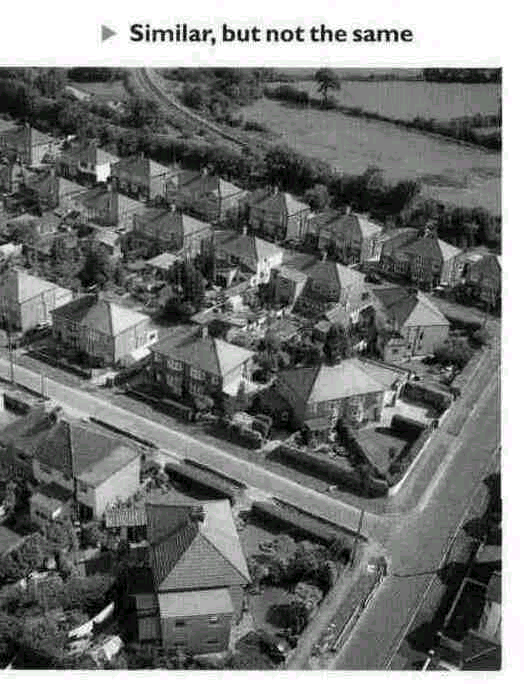
The importance of cosiness 179
Interiors: the importance of cosiness
>
Rooms: uses and names
It is difficult to generalize
about how British people use the various rooms in their houses.
They may like the idea of tradition, but they are too
individualistic to follow the same traditional habits. The only
safe generalization is that, in a house with two floors, the
rooms upstairs are the ones used as bedrooms. The toilet (often
separate) and bathroom are also usually upstairs. The living
room(s) and kitchen are downstairs. The latter is usually small,
but those who can afford the space often like to have a 'farmhouse
kitchen', big enough for the family to eat in.
Class divisions are sometimes
involved in the names used for rooms. With living rooms, for
example, the terms 'sitting room' and 'drawing room' are regarded
as upper-middle class, while 'lounge' is regarded as lower class.
'Front room' and 'back room' are also sometimes looked down on.
Just as the British idea of home is a mental concept as much as a physical reality, so is their idea of domestic comfort. The important thing is to feel cosy - that is, to create an atmosphere which seems warm even if it isn't really warm. This desire usually has priority over aesthetic concerns, which is why the British also have a reputation for bad taste. Most people would rather buy several items of cheap, mass-produced furniture, with chairs and sofas covered in synthetic material, than one more beautiful and more physically comfortable item. The same is true with regard to ornaments — if you want to be cosy, you have to fill the room up.
To many, tradition is part of cosiness, and this can be suggested by being surrounded by old items of furniture. And if you cannot have furniture which is old, you can always have other things that suggest age. The open fire is an example. In Britain, it is regarded by many as very desirable to have a 'real fire' (as it is often called). It is the perfect traditional symbol of warmth because it is what most people used in the past to keep warm. So strong is the attraction of a 'real fire' that many houses have an imitation open fire, complete with plastic coal which glows red when it is switched on. Bad taste? So what!
Most older houses, even very small ones, have not one but two general living rooms (which estate agents call 'reception rooms'). This arrangement maintains privacy (which is linked to cosiness). It allows the front room to be kept for comparatively formal visits, while family members and close friends can spend their time, safely hidden from public view, in the back room. Most modern smaller houses are built with just one living room (and in some older houses the two reception rooms have been converted into one). However, privacy must be preserved so these houses normally have a 'hall' onto which the front door opens. It is rare for it to open straight onto the living room. Some houses also have a tiny 'porch', with its own door, through which people pass before getting to the hall — an extra line of defence! The same concern can be seen where there is both a front . door and a back door. Even if both can be reached from the street, the back door is for family and close friends only.
180 19 Housing
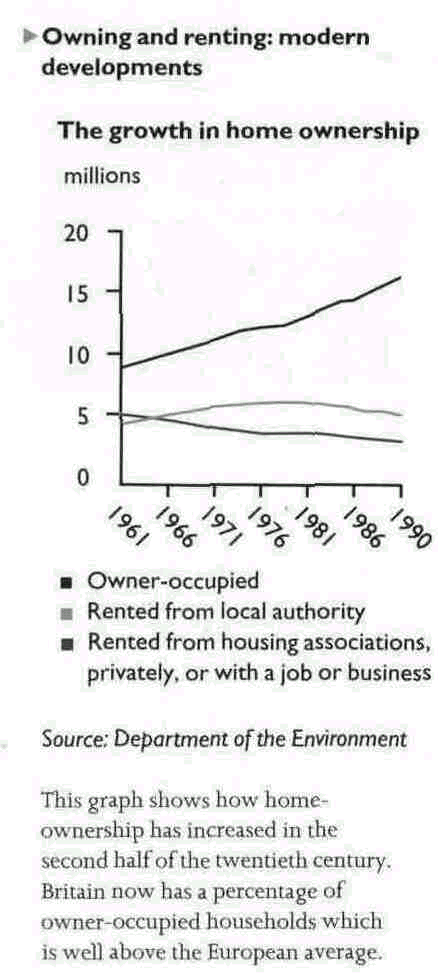
Most British people do not 'belong' to a particular place (see chapter 4), nor are they usually brought up in a long-established family house to which they can always return. Perhaps this is why they are not usually content to rent their accommodation. Wherever they are, they like to put down roots.
The desire to own the place where you live is almost universal in Britain. However, house prices are high. This dilemma is overcome by the mortgage system, which is probably a more established aspec of everyday life than it is anywhere else in the world. About 70% of all the houses in the country are occupied by their owners and almos all of these were bought with a mortgage. At any one time, half of these are owned by people who have borrowed 80% (or even more) of their price and are now paying this money back month by month. The normal arrangement is for the borrower to pay back the money over a period of twenty to twenty-five years. The financial institutions known as 'building societies' were originally set up to provide mortgages. In the 1980s, however, regulations were relaxed, so that banks now offer mortgages as well.
People are happy to take out mortgages because house prices normally increase a bit faster than the general cost of living. Therefore, most people can make a profit when they sell their house. So strong is this expectation that phrases such as 'first-time buyer' and 'second-time buyer' are well-known. The former can only afford one of the cheaper houses available. But around ten years later, when some of their mortgage has been paid off, they can become the latter. They sell meir houses at a profit and move into a more expensive house.
Although nearly everybody wants to own their house, it was only at the end of the twentieth century that a majority of people began to do so. Before that time, most working-class people lived in rented accommodation. At one time, most of them rented from private landlords, some of whom exploited them badly. In the 1950s and 1960s, however, millions of homes were built by local government authorities. By 1977, two-thirds of all tenants lived in these 'council houses' (or, in some cases, flats). Council rents are subsidized, so they are low. Each local council keeps a waiting list of households who want to move into a council property. The order of preference is worked out by a complicated set of priorities. Once they are given a council house, tenants have security; that is, they do not have to move out even if they become rich.
From 1950 to 1980 the proportion of'owner-occupiers' gradually increased. The ambition to own was made easier by policies of'tax relief. Some of the interest which people paid on their mortgage could be subtracted from the income tax they had to pay and people selling their houses did not have to pay 'capital gains tax' on any profit. With both owner-occupiers and council tenants increasing in numbers, the percentage of people who rented from private landlords
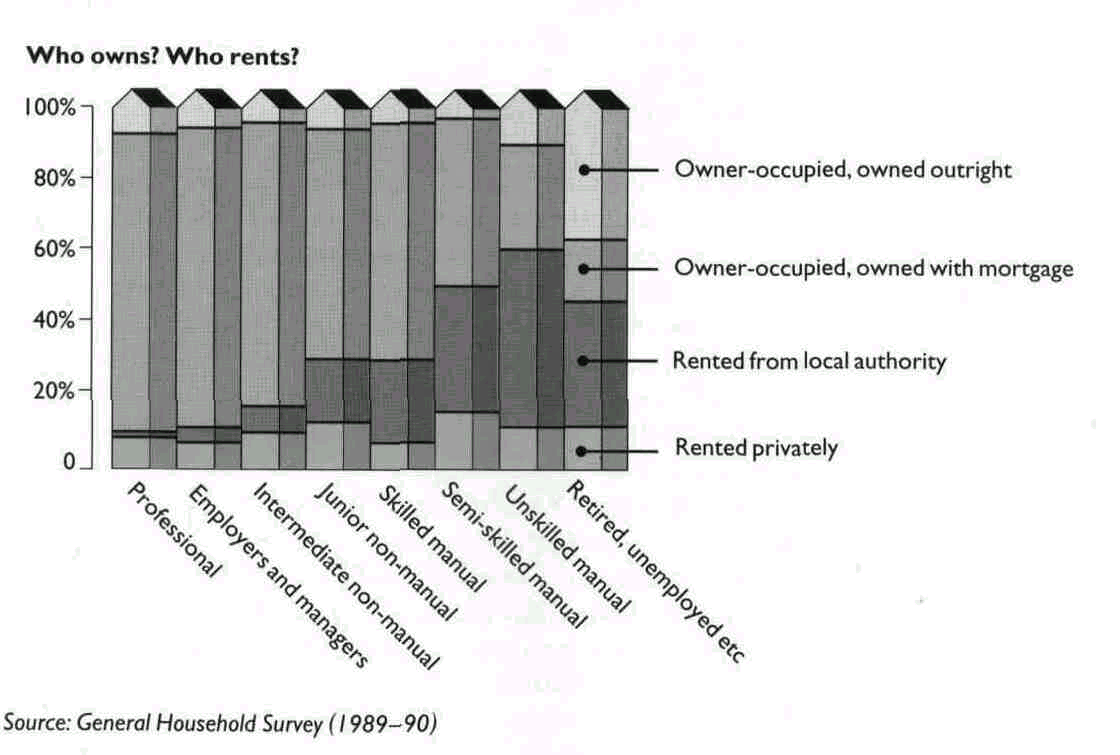
became one of the
lowest in the world — and continues to be so. Then
during the 198os, the number of owner-occupiers increased more
sharply. A major part of the philosophy ofThatcherism (under Prime
Minister Margaret Thatcher) was the idea of the 'property-owning
democracy'. Council tenants were allowed to buy their council
houses and were given financial incentives to do so. The
deregulation of mortgage-lending (see above) also encouraged
house-buying. So did an increase in the financial help given to
owners who wanted to make improvements to their property. At the
same time, local councils were severely limited in the number of
properties which they could build and were also encouraged to sell
their properties to private 'housing associations'. As a
result, the number of council tenants actually decreased. By
the mid 199os, the trends of the previous decade seemed to have
halted. Fewer council-house tenants were buying their houses and
tax relief on mortgages was being phased out. The policy of selling
off council houses had been discredited by the 'homes-for-votes'
scandal. In the early i 99os it became clear that a few local
councils run by the Conservative party had decided to keep their
properties empty, instead of renting them to families who needed
them, until they found buyers for them. The idea was that the
buyers would probably vote Conservative - while people who could
only afford to rent would probably not.
>
Owning and renting: class
In the middle years of the
twentieth century,
whether you owned or rented a house was a marker of class. If you
owned your house, you were middle class; if you lived in a council
house, you were working class. However, the graph above shows that
this is no longer true. A clear majority of skilled manual workers
are owner-occupiers, as are 40% of even unskilled manual workers.
Notice the small proportion of people (of any category) who own
their house 'outright' (i.e. they have finished paying off the
mortgage) or rent privately. Only among those with higher-status
jobs are there more private tenants than council tenants.
182 19 Housing
>
Finding somewhere to live
If you want to buy a house,
it is very rare to deal directly with the person selling. Instead,
you go to an estate agent. These companies exist solely to act as
'go-betweens' for people buying and selling houses. They help with
the various procedures - and take a fat commission! If you are
interested in one of the houses 'on their books', they will arrange
a 'viewing'. You can also spot houses for sale by the 'For sale'
signs which are put up on wooden posts outside ihe houses
concerned.
If you want to rent somewhere
from a private landlord (not a council), the usual place to look is
in the local newspaper. Estate agents do not often deal with
places for rent, although there are special lettings agencies.
Another possible way of
finding somewhere to live is to 'squat'. Squatters are people
who occupy empty houses without paying rent. If you do not cause
any damage when moving in to an empty house, you have not broken
the law. If the owner wants to get you out, he or she has to get an
order from the court to have you evicted.
Alternatively, you could
become a "New Age Traveller' and live in a bus, coach or
van, moving from
place to place.
Homelessness In
1993 it was estimated that there were half a million homeless
people in Britain - that's one of the highest proportions of the
population in all the countries of Europe. The supply of
council housing is limited, and has decreased since the i 98os
because of the sale of council houses and the lack of money
available for building new ones. In addition, many council houses
and flats were badly built and are now uninhabitable. Laws passed
in the 1970s to increase the security of tenants renting from
private landlords made it less profitable for people to let
out their houses, so the supply of private accommodation for rent
has also gone down. There are large numbers of people who can't
afford to rent somewhere to live privately, who are not
eligible for council accommodation (and who would probably be at
the end of a long waiting list if they were) and who certainly
can't afford to buy a house or flat. Finally, as elsewhere in
western Europe, the average size of households has become smaller,
so that, although the population is increasing only very slowly,
more places to live are still needed.
In the early 1990s many people who previously thought that they
were secure in their own homes suddenly faced the prospect of
homelessness. They had taken out large mortgages to buy their homes
at a time when the country was going through an economic boom and
house prices were rising (and looked as if they would continue to
rise). Many of these people lost their jobs in the recession and so
could no longer afford the monthly mortgage payments. To make
matters worse, the value of houses, unusually, fell sharply at this
time. They had to sell their homes, often for less than they bought
them, and so were in debt as well as homeless.
Most homeless families are provided with temporary accommodation
in boarding houses (small privately run guest houses or 'bed and
breakfasts') by their local council. It is the duty of local
authorities to house homeless families. Some families, and many
single people, find even more temporary shelter in hostels for the
homeless which are run by charitable organizations. Thousands of
single people simply live on the streets, where they 'sleep rough'.
The phrase 'cardboard city' became well-known in the 1980s to
describe areas of big cities, particularly London, where large
numbers of homeless people camped out, protected from the weather
only by cardboard boxes.
Solving the problem of homelessness is not a political priority for
the British government, partly because the level of public
awareness of the situation is low (in spite of the efforts of
charities such as Shelter, who give advice to the homeless and who
campaign on their behalf). In many cases, the homeless are those
with personal problems which make it difficult for them to
settle down. In some cases, they are people who simply don't want
to 'settle down' and who wouldn't class themselves as homeless.
There are, for example,
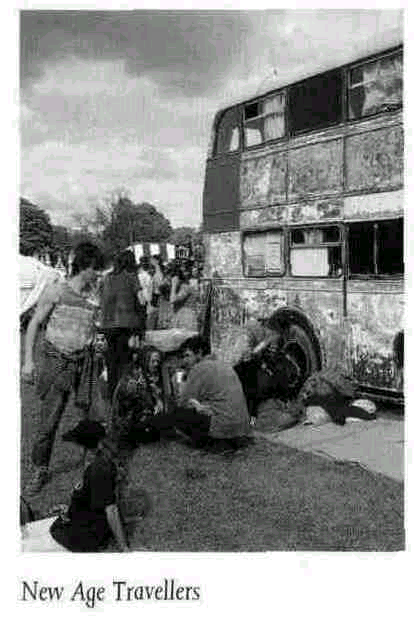
Question and suggestions 183
several thousand 'travellers' in the country, both traditional gypsies who have led a nomadic life for generations, and more recent converts to this lifestyle (often known as 'New Age Travellers' — see chapter 13 for an explanation of' New Age'). Their homes are the vehicles in which they move from place to place, and they are often persecuted by unsympathetic authorities. For these people, the problem is not that they are 'homeless' but in the official attitude towards their way of life.
QUESTIONS
1 British people living in flats in other parts of Europe have sometimes been absolutely horrified when they realize that they are supposed to have the same colour flowers on their balconies as all the other flats in the block. Why are they so horrified?
2 How do you explain the popularity of the different types of dwelling in Britain? Are the same types popular in your country?
3 Even in a small town in Britain, several offices and shops will be occupied by companies called 'estate agents', whose only role is to help people buy and sell their houses. In the same town, however, there may be no housebuilding companies at all to which people could go. Why do you think this is? Is the same true in your country?
4 In modern Britain there is no widespread feeling of resentment against aristocrats who live in large, beautiful country houses. Why not?
5 In 1933 George Orwell wrote a book called Down and Out in Paris and London, recounting his experiences mixing with homeless people in these two cities. In the book, he compares the laissez-faire attitude towards homeless people in Paris with the rigid attitude in London:
In Paris, if you had no money and could not find a public bench, you would sit on the pavement. Heaven knows . what sitting on the pavement would lead to in London — prison probably.
It has been observed that the contrast is now the other way around. It is now in Paris, not London, that homeless people, if they want to avoid being taken away by the police, need to make sure that they don't bring attention to themselves. Can you think why this change has occurred? How does the present British attitude to homelessness compare with that in your country?
SUGGESTIONS
> Shelter, the organization dedicated to bringing the plight of the homeless to the attention of the British government and to giving help and advice to homeless people (or people with housing problems), will send out an information pack on request. Because it is a charity, Shelter would like a self-addressed envelope and the cost of postage to be included with requests. The address of .Shelter is 88 Old Street, London EC IV 9HU.
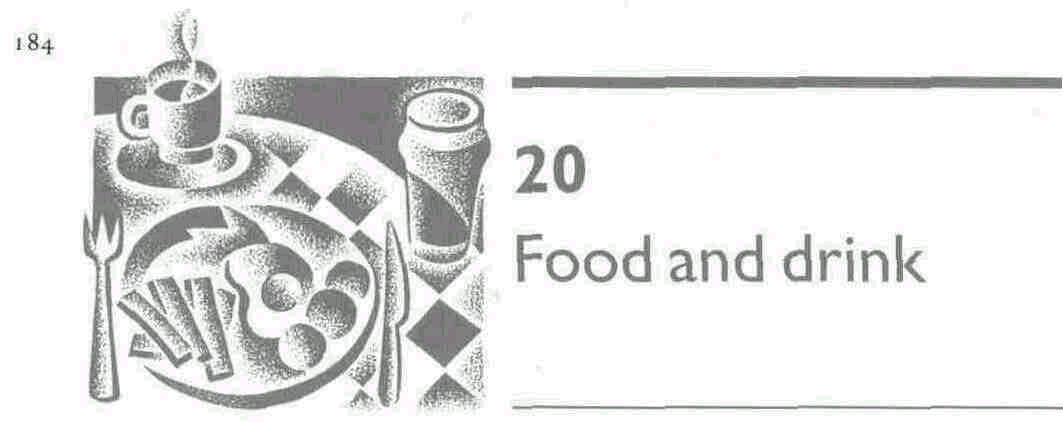
On the Continent people have good food; in England people have good table manners.
GEORGE MIKES
Britain and good food are two things which are not commonly associated. Visitors to Britain have widely varying opinions about all sorts of aspects of the country, but most of them seem to agree that the food is terrible. Why? One reason could simply be that British tastes are different from everybody else's. However, the most common complaint is not so much that British food has a strange, unpleasant taste, but rather that it has very little taste at all. The vegetables, for example, are overcooked. It is all too bland.
Another explanation may be that most visitors to Britain do not get the opportunity to sample home cooking. They either eat the food cooked in an institution, such as a university canteen, or they 'eat out' a lot, usually in rather cheap restaurants and cafes. These places are definitely not where to find good British food. Typical British cooking, which involves a lot of roasting, does not suit the larger scale production or the quick preparation which is required in such places. For one thing, food should, according to British people, be eaten hot, which is difficult to arrange when feeding large numbers of people. In addition, the British have not got into the habit of preparing sauces with grilled food in order to make it tastier.
Attitudes to food
The explanations above can only serve as a partial excuse for the unfortunate reputation of British cuisine. Even in fast food restaurants and everyday cafes, the quality seems to be lower than it is in equivalent places in other countries. It seems that British people simply don't care enough to bother.
The country has neither a widespread 'restaurant culture' nor a 'cafe society'. In the middle of the day, people just want to eat up quickly and are not interested much in quality (the lunch break is an hour at most). Young people and families with children who eat at fast food places are similarly not interested in quality. Little effort is made to make the hamburgers tasty because nobody expects them to be. The coffee is horrible not because British people prefer it that
way but because they
don't go to a cafe for a delicious, slow cup of coffee - they go
there because they need the caffeine.
Even at home, food and drink is given relatively little attention.
The coffee is often just as bad as it is in the cafes. British
supermarkets sell far more instant coffee than what the few people
who drink it often call 'real' coffee. Instant coffee is less
trouble. Meals tend to be eaten quickly and the table cleared.
Parties and celebrations are not normally centred around food. For
example, if a British person expresses a liking for barbecues, this
does not necessarily mean that he or she likes barbecued food - it
is understood to mean that he or she enjoys the typical barbecue
atmosphere.
When the British do pay attention to food, it is most frequently not
to appreciate it but to notice what they don't like about it. Food
hits the headlines only in the context of its dangers: for example
in 1993, when it was discovered that i oo tonnes of six-year-old
beef had been allowed to go on sale; or when a government minister
announced that the country's eggs were infected with salmonella. In
the early 1990s, everybody in the country knew about 'mad cow
disease' (a disease affecting the brains of infected cattle). There
are quite a large number of vegetarians in Britain and an even
larger number who are aware of the implications for their health of
what they eat. 'Health food shops' are as abundant in the country's
high streets as delicatessens.
British people have been mostly urban, having little contact with
'the land', for longer than the people of other countries. Perhaps
this is why the range of plants and animals which they will eat is
rather narrow. There are plenty of enthusiastic British carnivores
who feel quite sick at the thought of eating horsemeat. To most
people, the idea of going out to pick wild plants for the table is
exotic. It is perhaps significant that when the British want to
refer to the people of another country insultingly, they often
allude to their eating habits. Because of the strange things they do
with cabbage, for example, the Germans are 'krauts'. Because of
their outrageous taste for frog's legs, the French are 'frogs'.
However, the picture is not entirely negative. While the British are
conservative about ingredients, they are no longer conservative
about the way they are served. In the 1960s, it was reported that
the first British package tourists in Spain not only insisted on
eating (traditionally British) fish and chips all the time but also
on having them, as was traditional, wrapped up in specially imported
British newspaper! By now, however, the British are extremely open
to the cuisine of other countries. The country's supermarket shelves
are full of the spices and sauces needed for cooking dishes from all
over the world (the increasingly multicultural nature of the
population has helped in this respect). In addition, there is
increasing interest in the pure enjoyment of eating and drinking.
Attiudes
to food 185
>
What British people eat
A 'fry-up' is a phrase used
informally for several items fried together. The most common items
are eggs, bacon, sausages, tomatoes, mushrooms, and even bread.
It is not always accompanied by 'chips' (the normal British word for
french fried potatoes). The British eat rather a lot of fried food.
Although it is sometimes
poetically referred to as 'the staff of life', bread is not an
accompaniment to every meal. It is not even normally on the table at
either lunch or the evening meal. It is most commonly eaten, with
butter and almost anything else, for a snack, either as a
sandwich or as toast (a British household regards toasting
facilities as a basic necessity). On the other hand, the British use
a lot of flour for making pastry dishes, both savoury and sweet,
normally called "pies', and for making cakes.
Eggs are a basic part of most
people's diet. They are either fried, soft-boiled and eaten out of
an 'egg cup', hard-boiled (so that they can be eaten with the
fingers or put into sandwiches) or poached (steamed).
Cold meats are not very
popular. To many British people, preserved meats are typically
'Continental'.
It is common in most
households for a family meal to finish with a prepared sweet dish.
This is called either 'pudding', 'sweet' or 'dessert' (class
distinctions are involved here). There is a great variety of
well-known dishes for this purpose, many of which are served hot
(often a pie of some sort).
The British are the world's
biggest consumers of sugar - more than five kilograms per person per
year. It is present in almost every tinned food item and they also
love 'sweets' (which means both all kinds of chocolate and also what
the Americans call 'candy').
186 20 Food and drink
>
When people eat what: meals
Again, generalizations are
dangerous. Below is described what everybody knows about —
but this is not necessarily what everybody does!
Breakfast is usually a
packeted 'cereal' (e.g. cornflakes) and/or toast and marmalade. It
isn't usually a 'traditional' British breakfast (see chapter 5).
'Elevenses' is,
conventionally, a cup of tea or coffee and some biscuits at
around eleven o'clock. In fact, people drink tea or coffee whenever
they feel like it. This is usually quite often.
Lunch is typically at one
o'clock (any shops which close for lunch dose from one to two). But
it is often a bit earlier for schoolchildren and those who start
work at eight o'clock.
For the urban working class
(and a wider section of the population in Scotland and Ireland) tea
is the evening meal, eaten as soon as people get home from work (at
around six o'clock). For other classes, it means a cup of tea and a
snack at around four o'clock.
'Supper' is the usual word
for the evening meal among most people who do not call it 'tea'.
'Dinner' is also sometimes
used for the evening meal. It suggests something rather grander and
eaten comparatively late (at around eight o'clock). It is
associated with relative formality (many people talk about
'Christmas dinner', even if they have it in the middle of the day).
It is also sometimes used to refer to the midday meal in schools.
Eating
out Although
it is far less unusual than it used to be, going to a restauran is
still a comparatively rare event for most British people. Regular
restaurant-going is confined mostly to the richest section of
society. Partly for this reason, there is an element of snobbery
associated wit! it. Merely being in an expensive restaurant
sometimes seems to be more important to people than the food eaten
in it. For example, in 1992 a survey by experts found that most of
the caviar in top London restaurants was not what it claimed to be
(the most prized beluga variety) and was often stale or going bad.
The experts commented that restaurants used the mystique of caviar
to hide the low quality of what they served because 'the majority
of people ... don't really know what they're eating.'
Another expression of snobbery in the more expensive restaurants is
in the menus. In a country where few public notices appear in any
language other than English, these are a unique phenomenon — all
the dishes have non-English names, most commonly French (reflecting
the high regard for French cuisine). It also makes the food sound
more exotic and therefore more exciting. Many customers of these
restaurants have little idea of what actually goes in to the dish
they have chosen. But when, in 1991, the government suggested that
menus should give details of ingredients in dishes, all the
country's chefs and restaurateurs were outraged. They argued this
would take the fun out of eating out. The assumption behind this
argument is that going to a restaurant is a time to be adventurous.
This 'adventure' concept is undoubtedly widespread. It helps to
explain why so few restaurants in Britain are actually British.
Because they do it so rarely, when people go out for a meal in the
evening, they want to be served something they don't usually eat.
Every town in the country has at least one Indian restaurant and
probably a Chinese one too. Larger towns and cities have
restaurants representing cuisine from all over the world.
Eating places which serve British food are used only for more
everyday purposes. Apart from pubs, there are two types, both of
which are comparatively cheap. One is used during the day, most
typically by manual workers, and is therefore sometimes described
as a 'workman's cafe' (pronounced 'caff'). But it is also used by
anybody else who wants a filling meal, likes the informal
atmosphere and is not over-worried about cleanliness. It offers
mostly fried food of the 'English breakfast' type (see chapter c-)
and for this reason it is also sometimes jokingly called a 'greasy
spoon'. Many of them are 'transport cafes' at the sides of
main roads. In 1991 Prime Minister John Major deliberately and
publicly ate at one of these in order to prove that he was 'a man
of the people'. The other type is the fish-and-chip shop, used in
the evening for 'take-away' meals. Again, the fish is (deep) fried.
Fast food outlets are now more common in Britain than they are in most other
countries. Cynics might claim this is because the British have no
sense of taste. However, their popularity is probably better
explained sociologically. Other types of eating place in Britain
tend to have class associations. As a result, large sections of
society feel unable to relax in them. But a fast food restaurant
does not have such strong associations of this kind. Although there
is sometimes local middle-class protest when a new one appears in
their area, people from almost any class background can feel
comfortable in them. Alcohol The
attitude to alcohol in Britain is ambivalent. On the one hand, it is
accepted and welcomed as an integral part of British culture. The
local pub plays an important role in almost every neighbourhood -and
pubs, it should be noted, are predominantly for the drinking of beer
and spirits. The nearest pub is commonly referred to as 'the local'
and people who go there often are known as 'regulars'. The action in
both the country's most popular television soaps (see chapter 18)
revolves around a pub. Even a certain level ofdrunkenness is
acceptable. Provided this does not lead to violence, there is no
shame attached to it. On
the other hand, the puritan tradition has led to the widespread view
that drinking is something potentially dangerous which should
therefore be restricted, in terms of both who can do it and where it
can be done. Most people, including regular drinkers, consider that
it would be wrong to give a child even half a glass of beer. When,
in 1993, research was published showing that nearly 70% of
fifteen-year-old children in the country drank some alcohol in an
average week, it was generally agreed that this was a serious
'social problem'. People cannot be served in pubs until the age of
eighteen and they are not even allowed inside one (unless it has a
special children's certificate) until they are fourteen. For many
people, drinking is
Alcohol
187
>
What people drink
As well as large amounts of
hot drinks
such as tea, coffee and cocoa, British people - especially children
— drink squash (a sweetened fruit concentrate that has to be
diluted with water) and brand-name 'soft' (non-alcoholic) drinks.
They also expect to be able to drink water straight from the tap.
Before the 1960s, wine was
drunk only by the higher social classes and was associated in most
people's minds with expensive restaurants. Since that time, it has
increased enormously in popularity.
Beer is still the most popular
alcoholic drink. The most popular pub beer is 'bitter', which
is draught (i.e. from the barrel), has no gas in it and is
conventionally, as are all British beers, drunk at room
temperature. A sweeter, darker version of bitter is'mild'.
These beers have a comparatively low alcoholic content. This is one
reason why people are able to drink so much of them! In most pubs,
several kinds of bottled beer, usually known as 'ales', are also
available.
Beer which has gas in it and
is closer to continental varieties is known as 'lager'. During the
1980s strong lager became popular among some young people. Because
these people were used to drinking weaker traditional beer, they
sometimes drank too much of it and became aggressive and even
violent. They therefore became known as 'lager louts'.
In some pubs, cider is
available on draught, and in some parts of Britain, most typically
in the English west country, it is this, and not beer, which is the
most common pub drink.
Shandy is half beer and half
fizzy lemonade. It has the reputation of being very good for
quenching the thirst.
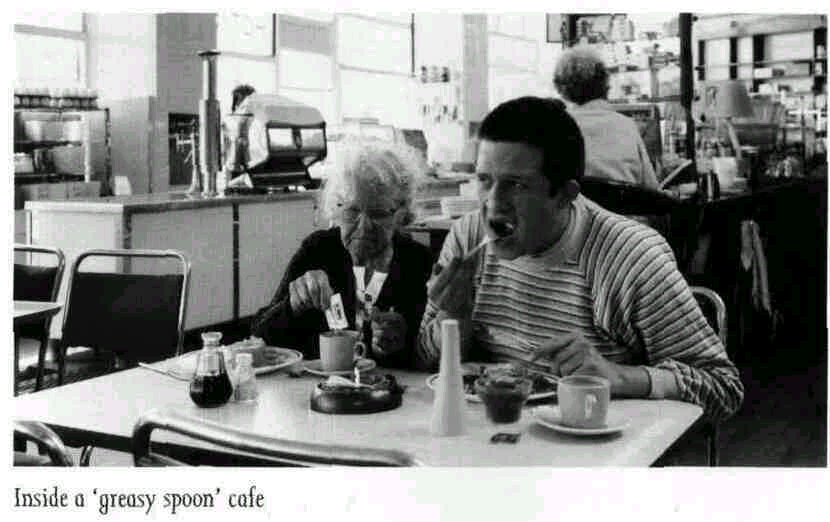
188 20 Food and drink
>The
meanings of'bar' in British English
1 The area in a hotel or
other public place where alcoholic drinks can be drunk.
2 The different rooms in a
pub. Although
pubs have always been used by all social classes, there used to be
an informal class division. The "public bar' was used by the
working class. This is where a dart board and other pub games could
be found. The 'saloon bar', on the other hand, was used by the
middle classes. Here there was a carpet on the floor and the drinks
were a little more expensive. Some pubs also had a 'private
bar', which was even more exclusive. Of course, nobody had to
demonstrate class membership before entering this or that bar.
These days, most pubs do not bother with the distinction. In some,
the walls between the bars have been knocked down and in others the
beer costs the same in any of the bars.
3 The counter in a pub
where you go to get your drinks.
confined to pubs. Wine
or beer is not as much a part of home life as it is in some other
European countries. Most cafes are not allowed to serve even beer. For
most of the twentieth century, pubs operated under strict laws
which limited their opening hours. These have recently been
relaxed. Moreover, many more types of shop now sell alcohol than
previously. However, this lessening of the negative attitude to
alcohol has been balanced by increasing concerns about its impact
on health and safety. There are government-sponsored guidelines
which state the maximum amount of alcohol it is advisable for
people to drink in a week without endangering their health.
Although millions of people pay little attention to these, the
general feeling that alcohol can be bad for you has increased.
Moreover, the laws against drinking and driving have been
strengthened and are fairly strictly observed. Nevertheless,
alcohol, especially beer, is an important part of the lives of many
people. Notice, for example, the mass rush across the Channel after
customs duties were changed in 1992. Beer was much cheaper in
France and people were allowed to bring back almost as much as they
liked. It was calculated that in that first year the single
European market cost the British government about £250 million in
lost taxes on alcohol. Pubs The
British pub (short for 'public house') is unique. This is not just
because it is different in character from bars or cafes in other
countries. It is also because it is different from any other
public place in Britain itself. Without pubs, Britain would be a
less sociable country. The pub is the only indoor place where the
average person can comfortably meet others, even strangers,
and get into prolonged conversation with them. In cafes and fast
food restaurants, people are expected to drink their coffee and get
out. The atmosphere in other eating places is often rather formal.
But pubs, like fast food restaurants, are classless. A pub
with forty customers in it is nearly always much noisier than a
cafe or restaurant with the same number of people in it. As
with so many other aspects of British life, pubs have become a bit
less distinctive in the last few decades. They used to serve almost
nothing but beer and spirits. These days, you can get wine, coffee
and some hot food at most of them as well. This has helped to widen
their appeal. At one time, it was unusual for women to go to pubs.
These days, only a few pubs exist where it is surprising for a
woman to walk in. Nevertheless,
pubs have retained their special character. One of their notable
aspects is that there is no waiter service. If you want something,
you have to go and ask for it at the bar. This may not seem very
welcoming and a strange way of making people feel comfortable
and relaxed. But to British people it is precisely this. To be
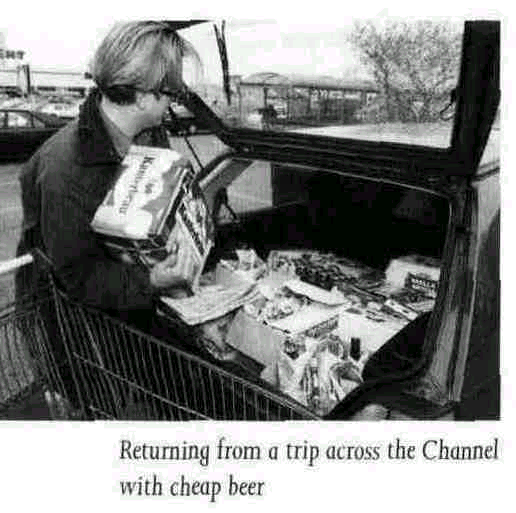
served at a table is
discomforting for many people. It makes them feel they have to be on
their best behaviour. But because in pubs you have to go and fetch
your drinks yourself, it is more informal. You can get up and walk
around whenever you want - it is like being in your own house. This
'home from home' atmosphere is enhanced by the relationship between
customers and those who work in pubs. Unlike in any other eating or
drinking place in Britain, the staff are expected to know the
regular customers personally, to know what their usual drink is and
to chat with them when they are not serving someone. It is also
helped by the availability of pub games (most typically darts) and,
frequently, a television. Another
notable aspect of pubs is their appeal to the idea of tradition.
For example, each has its own name, proclaimed on a sign hanging
outside, always with old-fashioned associations. Many are called by
the name of an aristocrat (for example, 'The Duke of Cambridge') or
after a monarch; others take their names from some traditional
occupation (such as 'The Bricklayer's Arms'); they often have rural
associations (for example, 'The Sheep Shearers' or 'The Bull'). It
would certainly be surprising to see a pub called 'The Computer
Programmers' or 'The Ford Escort'. For the same reason, the person
who runs a pub is referred to as the 'landlord* (he is nearly always
a man) - even though he is, in reality, the exact opposite. He
is a tenant. Nearly all pubs are owned by a brewery. The 'landlord'
is simply employed by the brewery as its manager. But the word is
used because it evokes earlier times when all pubs were privately
owned 'inns' where travellers could find a bed for the night. The
few pubs that really are privately owned proudly advertise
themselves as 'free houses'. The practical significance of this
for the customer is that a much wider variety of beers can usually
be found inside.
Pubs
189
>
The pub
This photograph of a pub shows
several typical features. First, notice that it looks old. Most pubs
are like this. It is part of their appeal to tradition. Even a
newly built pub is often designed to look, inside and out, as if it
were several hundred years old. Second, notice the windows. They are
small because, unlike the large plate-glass windows of cafes, they
help to make the pub feel homely. But notice also that it is
difficult to see inside the pub from the outside. The Victorians
thought that it was somehow not proper for people to be seen
drinking. That is why very few pubs have tables outside. Instead,
many have a garden at the back. Because children are only allowed
inside a pub if the pub has a children's certificate, a garden can
be an important feature for some customers. >
How to shut the pub
Although pubs can now stay
open longer than they were allowed to previously, they still have to
close at their advertised closing time. Therefore, the
traditions of 'closing time' have remained in place. Several phrases
are connected with this process which are well-known to everybody in
the country.
A few minutes before the
official closing time, the landlord or barman shouts 'last orders,
please', which means that anybody who wants to buy another drink
should do so at once.
When closing time arrives, the
barman shouts 'Time, ladies and gentlemen, please', and, as with his
first shout, possibly accompanies this with the ringing of a bell.
However, customers do not have
to leave immediately. They still have 'drinking-up time'. This is a
concept which is recognized in law and is assumed to last about ten
minutes.
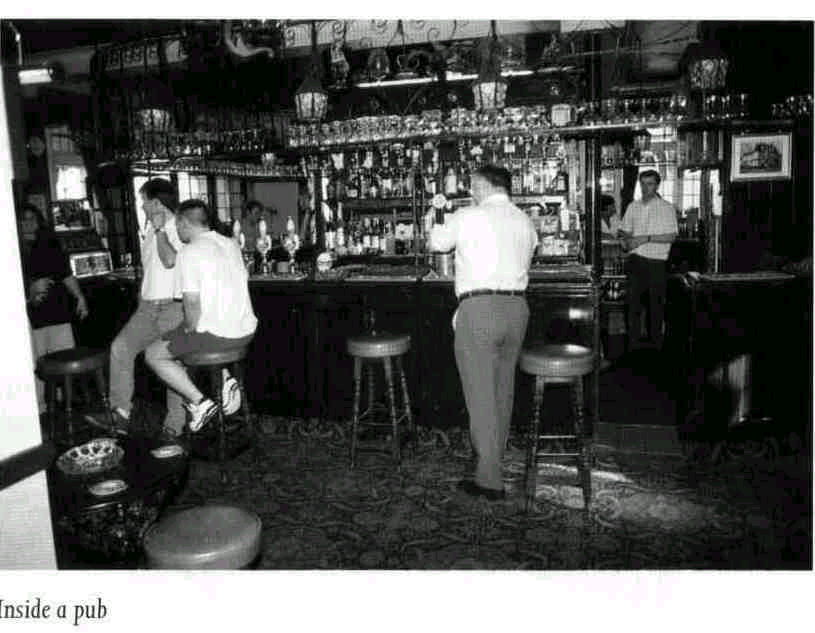
190
20
Food and drink
>
Nostalgia
A 'ploughman's lunch'
(consisting of crusty bread, butter, cheese and pickle) is a
well-known pub snack. Like other traditional food in pubs (such as
'shepherd's pie'), its name evokes traditional rural life. Pubs
never use symbols of modernity. But modern agriculture is, of
course, not at all traditional. This is the point of the cartoon. A
cattle inseminator is a person who makes cows pregnant by
injecting them with sperm! Notice his white laboratory coat (very
non-traditional and non-rural).
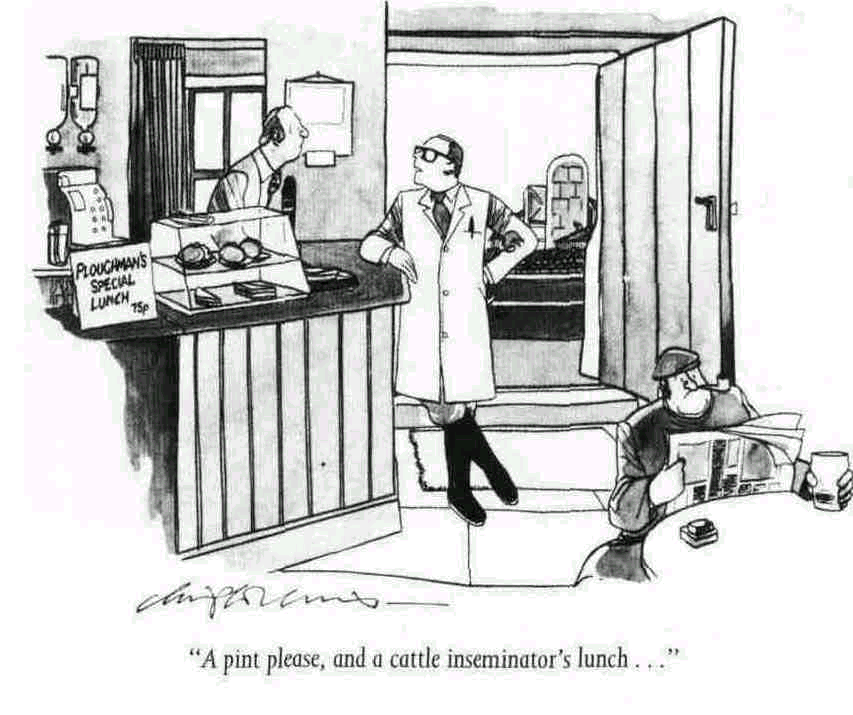
QUESTIONS
1 In what kind of place (s) are you most likely to find good British cooking?
2 Why are Indian restaurants popular in Britain? Think of as many reasons as you can why British people prefer to eat food from other countries when they go out to eat.
3 What are the differences (if any) between laws relating to the consumption of alcohol in Britain and those in your country? What possible reasons are there for these differences?
4 The text mentions the rush across the channel to buy cheap alcohol in 1992. What effect do you think this started to have on traditional British drinking habits (with respect to both what people drink and -where they drink) ? Why were some people (even some of the people rushing across the Channel!) worried about this trend?
5 In what ways are British pubs different from typical cafes and bars in your country?
SUGGESTIONS
• Delia Smith is probably the most popular and well-known cookery
writer and broadcaster in Britain. Her Complete Cookery Course for example, published by BBC Books, gives a good idea of the kind of food British people cook (or would like to cook) at home.
• There are lots of hotel, restaurant and pub guides which are published annually and which describe the kind of food and other facilities available at British eating and drinking places. For example, The Good Food Guide published by Which Books and the Good Pub Guide published by Vermilion.
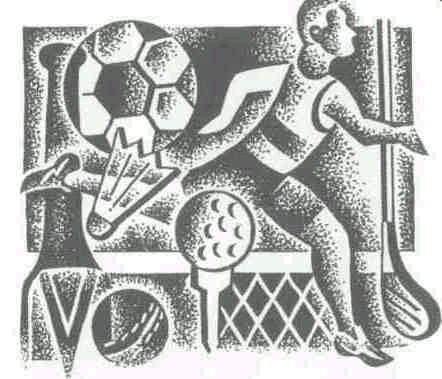
Think of your
favourite sport. Whatever it is, there is a good chance that it was
first played in Britain, and an even better chance that its modern
rules were first codified in Britain. The public schools (see
chapter 14) of the Victorian era believed that organized
competitive games had many psychological benefits. These games
appealed to, and developed, the British sense of' fair play'. This
concept went far beyond abiding by the written rules of a game. It
also meant observing its unwritten rules, which governed behaviour
before, during and after the game. You had to be a 'good loser'. To
be a cheat was shameful, but to lose was just 'part of the game'.
Team games were best, because they developed 'team spirit'. Modern
sport in Britain is very different. 'Winning isn't everything'
and 'it's only a game' are still well-known sayings which reflect
the amateur approach of the past. But to modern professionals,
sport is clearly not just a game. These days, top players in any
sport talk about having a 'professional attitude' and doing their
'job' well, even if, officially, their sport is still an amateur
one. Nevertheless, the public-school enthusiasm for sport and the
importance placed on simply taking part has had a lasting influence
on the nature and role of sport in Britain today. A
national passion Sport
probably plays a more important part in people's lives in Britain
than it does in most other countries. For a very large number, and
this is especially true for men, it is their main form of
entertainment. Millions take part in some kind of sport at least
once a week. Many millions more are regular spectators and follow
one or more sports. There are hours of televised sport each week.
Every newspaper, national or local, quality or popular, devotes
several pages entirely to sport. The
British are only rarely the best in the world at particular sports
in modern times. However, they are one of the best in the "world
in a much larger number of different sports than any other country
(British individualism at work again). This chapter looks at the
most publicized sports with the largest followings. But it should
be noted that hundreds of other sports are played in Britain, each
with its own small but enthusiastic following. Some of these may
not be seen as a
>
Gentlemen and players
The middle-class origins of
much British sport means that it began as an amateur pastime - a
leisure-time activity which nobody was paid for taking part in.
Even in football, which has been played on a professional
basis since i88j, one of the first teams to win the FA (Football
Association) Cup was a team of amateur players (the Corinthians).
In many other sports there has been resistance to professionalism.
People thought it would spoil the sporting spirit. Not until 1968
were tennis professionals allowed to compete at Wimbledon. In
cricket there was, until 1962, a rigid distinction between
'gentlemen' (amateurs) and "players' (professionals), even
when the two played together in the same team. These days, all
'first class' cricketers are professionals.
192 21 Sport and competition
>
Trophies; real and imaginary
Quite often, sporting
contests in Britain have a prize attached to
them which gives them a special significance.
The Calcutta Cup The
annual rugby union match between England and Scotland is only
rarely the decisive one in the Five Nations Championship (> The
sporting calendar). But it is important because it is played for
the Calcutta Cup, an ornate silver trophy made in India in the
1807s.
The Ashes When
England and Australia play a series of cricket matches, they are
said to be competing for the Ashes. In 1882, after a heavy defeat
by Australia, the 'ashes' of English cricket (actually a burnt
piece of cricketing equipment) were placed inside an urn as a
symbol of the 'death' of English cricket. In fact, the urn never
leaves Lord's cricket ground.
The Triple Crown In
rugby union, if one of the four nations of the British Isles beats
all the other three nations in the same year, they are recorded as
having won the Triple Crown, even though a physical object called
'the Triple Crown' does not exist!
sport at all by many
people. For most people with large gardens, for example, croquet is
just an agreeable social pastime for a sunny afternoon. But to
a few, it is a deadly serious competition. The same is true of
other games such as indoor bowling, darts or snooker. Even board
games, the kind you buy in a toy shop, have their national
champions. Think of any pastime, however trivial, which involves
some element of competition and, somewhere in Britain, there is
probably a 'national association' for it which organizes contests. The
British are so fond of competition that they even introduce it into
gardening. Many people indulge in an informal rivalry with their
neighbours as to who can grow the better flowers or vegetables. But
the rivalry is sometimes formalized. Through the country, there are
competitions in which gardeners enter their cabbages, leeks,
onions, carrots or whatever in the hope that they will be judged
'the best'. There is a similar situation with animals. There are
hundreds of dog and cat shows throughout the country at which
owners hope that their pet will win a prize. The
social importance of sport The
importance of participation in sport has legal recognition in
Britain. Every local authority has a duty to provide and maintain
playing fields and other facilities, which are usually very cheap
to use and sometimes even free. Spectator sport is also a matter of
official public concern. For example, there is a law which prevents
the television rights to the most famous annual sporting
occasions, such as the Cup Final and the Derby (> The
sporting calendar), being sold exclusively to satellite
channels, which most people cannot receive. In these cases it seems
to be the event, rather than the sport itself, which is important.
Every year the Boat Race and the Grand National are watched on
television by millions of people who have no great interest in
rowing or horse-racing. Over time, some events have developed a
mystique which gives them a higher status than the standard at
which they are played deserves. In modern times, for example, the
standard of rugby at the annual Varsity Match has been rather low —
and yet it is always shown live on television.
Sometimes the traditions which accompany an event can seem as
important as the actual sporting contest. Wimbledon, for instance,
is not just a tennis tournament. It means summer fashions,
strawberries and cream, garden parties and long, warm English
summer evenings. This reputation created a problem for the event's
organizers in 1993, when it was felt that security for players had
to be tightened. Because Wimbledon is essentially a middle-class
event, British tennis fans would never allow themselves to be
treated like football fans. Wimbledon with security fences,
policemen on horses and other measures to keep fans off the court?
It just wouldn't be Wimbledon!
The long history of such events has meant that many of them, and
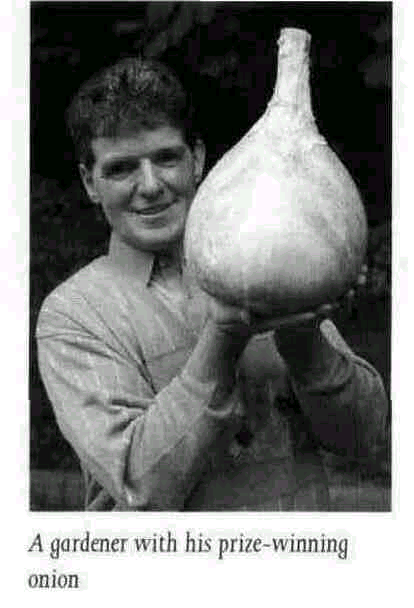
Their venues, have become world-famous.
Therefore, it is not only the British who tune in to watch. The
Grand National, for example, attracts a television audience of 300
million. This worldwide enthusiasm has little to do with the
standard of British sport. The cup finals at other countries often
have better quality and more entertaining football on view - but
more Europeans watch the English Cup Final than any other. The
standard of British tennis is poor, and Wimbledon is only one
of the world's major tournaments. But if you ask any Lop tennis
player, you find that Wimbledon is the one they really want to win.
Every footballer in the world dreams of playing at Wembley, every
cricketer in the world of playing at Lord's. Wimbledon, Wembley
and Lord's (> Famous sporting venues) are the 'spiritual homes'
of their respective sports. Sport is a British export!
Cricket Judging
by the numbers of people who play it and watch it (> Spectator
attendance at major sports), cricket is definitely not the national
sport of Britain. In Scotland, Wales and Northern Ireland, interest
in it is largely confined to the middle classes. Only in England and
a small part of Wales is it played at top level. And even in
England, where its enthusiasts come from all classes, the majority
of the population do not understand its rules. Moreover, it is rare
for the English national team to be the best in the world. When
people refer to cricket as the English national game, they are not
thinking so much of its level of popularity or of the standard of
Cricket
193
>
Famous sporting venues in Britain
Football
Wembley (London) Hampden Park
(Glasgow)
Rugby union
Twickenham (London) Millennium
Stadium (Wales) Murrayfield (Edinburgh) Lonsdowne Rood (Dublin)
Horse-racing
Flat: Ascot, Epsom, Newmarket
National hunt: Aintree, Cheltenham
Cricket
Lord's (London)
The Oval (London)
Old Trafford (Manchester)
Headingley (Leeds)
Trent Bridge (Nottingham)
Edgboston (Birmingham)
Golf
St Andrew's (Scotland)
Motor racing
Silverstone (Northampton)
Brands Hatch (Rochester)
>. Sporting language
The central place of sport in Britain is indicated by the very large number of sporting expressions and metaphors which have entered the everyday language. Here are some of them.
From cricket
on a sticky wicket: in a difficult situation
on an easy wicket: in a fortunate situation
stumped: at a loss for an answer to a question or solution to a problem
hit something for six: dismiss something emphatically
play with a straight bat: do something in an honest and straightforward way
it's not cricket: it is not the proper or fair way of doing something (cricket is supposed to be the perfect example of the concept of 'fair play')
have a good innings: have a large or adequate amount of time in a certain post; have a long life
off one's own bat: without help from anyone else
From boxing
saved by the bell: saved from a bad or
dangerous situation by a sudden
event on the ropes: in a weak position; dose
to defeat or failure floored: defeated or confused in an
argument or discussion throw in the towel: admit defeat
From horse-racing and riding
first past the post: the winner
have the bit between the teeth: determined
to be given free rein: to be allowed to do
exactly what one wants, without
restrictions
in the saddle: in control (in modem times, the expression 'in the driving seat' is often used instead)
From other sports or sport in general
team player: somebody who is good at
co-operating with other people
in groups run with the pack: have no individual
principles but just blindly follow
the majority win hands down: win easily go to the dogs: start to lead an aimless
and self-destructive life in the final .straight/on the last lap: in the
last stage of some process a safe pair of hands: a reliable person
194 21 Sport and competition
>
Notes on cricket
• Eleven players in each
team.
• Test matches between
national teams
can last up to
five days of six hours each. Top club teams play matches lasting
between two and four days. There are also one-day
matches lasting
about seven hours.
• Played at top level in
Australia, England, India, New Zealand, Pakistan, South
Africa, Sri Lanka, the West Indies (those places in the Caribbean
which once belonged to the British empire). Can be considered the
'national sport' in the Indian subcontinent and the West Indies.
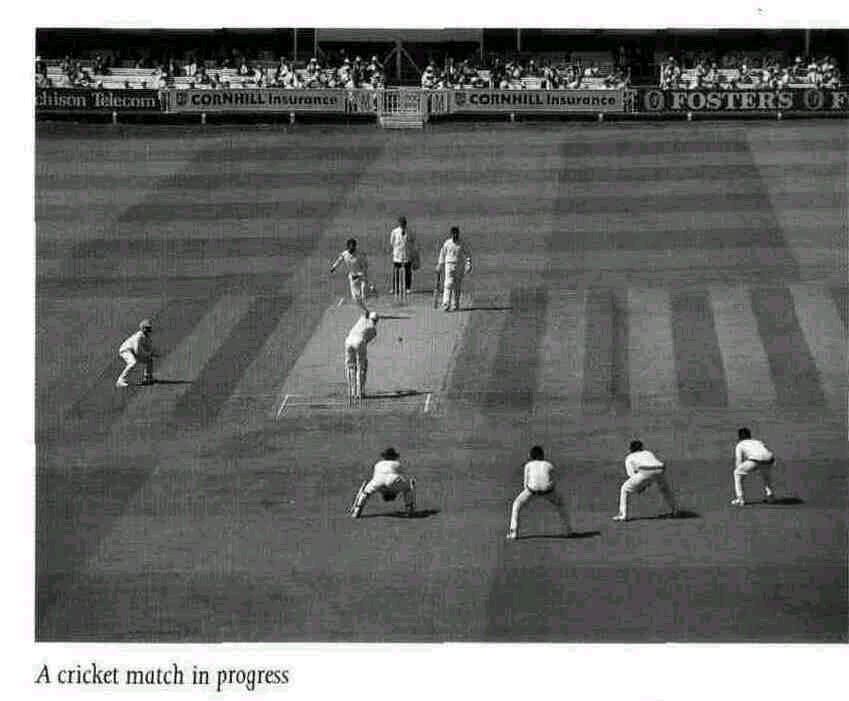
English players but more of the very English associations that it carries with it. Cricket is much more than just a sport; it symbolizes a way of life - a slow and peaceful rural way of life. Cricket is associated with long sunny summer afternoons, the smell of new-mown grass and the sound of leather (the ball) connecting with willow (the wood from which cricket bats are made). Cricket is special because it combines competition with the British dream of rural life. Cricket is what the village green is for! As if to emphasize the rural connection, 'first class' cricket teams in England, unlike teams in other sports, do not bear the names of towns but of counties (Essex and Yorkshire, for example).
Cricket is, therefore, the national English game in a symbolic sense. However, to some people cricket is more than just a symbol. The comparatively low attendance at top class matches does not give a true picture of the level of interest in the country. One game of cricket takes a terribly long time (i> Notes on cricket), which a lot of people simply don't have to spare. In fact there are millions of people in the country who don't just enjoy cricket but are passionate about it! These people spend up to thirty days each summer tuned to the live radio commentary of'Test' ( = international) Matches. When they get the chance, they watch a bit of the live television coverage. Some people even do both at the same time (they turn the sound down on the television and listen to the radio). To these people, the commentators become well-loved figures. When, in 1994, one famous commentator died, the Prime Minister lamented that 'summers will never be the same again'. And if cricket fans are too busy to listen to the radio commentary, they can always phone a special number to be given the latest score!

Football
The full official name of'soccer' (as it is called in the USA and sometimes in Britain) is 'association football'. This distinguishes it from other kinds such as rugby football (almost always called simply 'rugby'), Gaelic football, Australian football and American football. However, most people in Britain call it simply 'football'. This is indicative of its dominant role. Everywhere in the country except south Wales, it is easily the most popular spectator sport, the most-played sport in the country's state schools and one of the most popular participatory sports for adults. In terms of numbers, football, not cricket, is the national sport, just as it is everywhere else in Europe.
British football has traditionally drawn its main following from the working class. In general, the intelligentsia ignored it. But in the last two decades of the twentieth century, it started to attract wider interest. The appearance of fanzines is an indication of this. Fanzines are magazines written in an informal but often highly intelligent and witty style, published by the fans of some of the clubs. One or two books of literary merit have been written which focus not only on players, teams and tactics but also on the wider social aspects of the game. Light-hearted football programmes have appeared on television which similarly give attention to 'off-the-field' matters. There has also been much academic interest. At the 1990 World Cup there was a joke among English fans that it was impossible to find a hotel room because they had all been taken by sociologists!
Many team sports in Britain, but especially football, tend to be men-only, 'tribal' affairs. In the USA, the whole family goes to watch the baseball. Similarly, the whole family goes along to cheer the Irish national football team. But in Britain, only a handful of children or women go to football matches. Perhaps this is why active support for local teams has had a tendency to become violent. During the 1970s and 1980s football hooliganism was a major problem in England. In the 1990s, however, it seemed to be on the decline. English fans visiting Europe are now no worse in their behaviour than the fans of many other countries.
Attendances at British club matches have been falling for several decades (> Spectator attendance at major sports). Many stadiums are very old, uncomfortable and sometimes dangerous. Accidents at professional football matches led to the decision to turn the grounds of first division and premiership clubs into 'all-seater' stadiums. Fans can no longer stand, jump, shout and sway on the cheap 'terraces' behind the goals (there have been emotional farewells at many grounds to this traditional 'way of life'). It is assumed that being seated makes fans more well-behaved. It remains to be seen whether this development will turn football matches into events for the whole family.
196 21 Sport and competition
>
Notes on rugby
• Similar to American
football in the ball it uses (egg-shaped) and its aim (to carry the
ball over the opposing team's line). But very different in details
- most notably, you cannot interfere with a player who does not
have the ball. Also different in that, like all British sports,
there are no 'time-outs' and players do not wear body armour.
• Fifteen players per team
in rugby union and thirteen in rugby league.
• Playing time is eighty
minutes.
• Rugby union is played at
top level in the British Isles, France, Australia, South Africa and
New Zealand. Also to a high level in North America, Argentina,
Romania and some Pacific islands. Can be considered the 'national
sport' of Wales, New Zealand, Fiji, Western Samoa and Tonga, and of
South African whites. The teams most frequently regarded as the
best are from the southern hemisphere.
• Rugby league is played at
top level in Britain, Australia and New Zealand.
Rugby There
are two versions of this fast and aggressive ball game: rugby union
and rugby league. They are so similar that somebody who is good at
one of them can quickly learn to become good at the other. The real
difference between them is a matter of social history. Rugby union
is the older of the two. In the nineteenth century it was
enthusiastically taken up by most of Britain's public schools.
Rugby league split off from rugby union at the end of the century.
Although it has now spread to many of the same places in the world
where rugby union is played (> Notes on rugby), its traditional
home is among the working class of the north of England, where it
was a way for miners and factory workers to make a little bit of
extra money from their sporting talents. Unlike rugby union, it has
always been a professional sport. Because
of these social origins, rugby league in Britain is seen as a
working class sport, while rugby union is mainly for the middle
classes. Except in south Wales. There, rugby union is a sport for
all classes, and more popular than football. In Wales, the phrase
'international day' means only one thing - that the national
rugby team are playing. In the 1970s and 1980s some of the best
Welsh players were persuaded to 'change codes'. They were 'bought'
by one of the big rugby league clubs, where they could make a lot
of money. Whenever this happened it was seen as a national disaster
among the Welsh. Rugby
union has had some success in recent years in selling itself to a
wider audience. As a result, just as football has become less
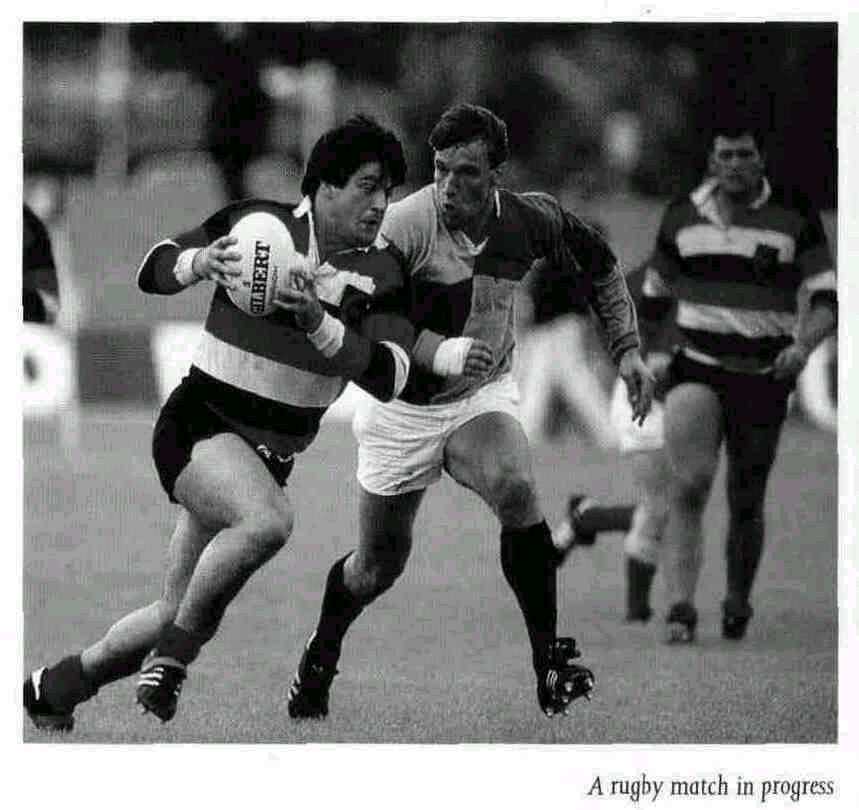
Animals in sport 197
exclusively working
class in character, rugby union has become less exclusively middle
class. In 1995 it finally abandoned amateurism. In fact, the
amateur status of top rugby union players had already become
meaningless. They didn't get paid a salary or fee for playing, but
they received large 'expenses' as well as various publicity
contracts and paid speaking engagements. Animals
in sport Traditionally,
the favourite sports of the British upper class are hunting,
shooting and fishing. The most widespread form of hunting is
foxhunting — indeed, that is what the word 'hunting' usually
means in Britain (> Foxhunting). This is a popular pastime among
some members of the higher social classes and a few people from
lower social classes, who often see their participation as a mark
of newly won status. Killing
birds with guns is known as 'shooting' in Britain. It is a minority
pastime confined largely to the higher social classes; there are
more than three times as many licensed guns for this purpose in
France as there are in Britain. The birds which people try to shoot
(such as grouse) may only be shot during certain specified times of
the year. The upper classes often organize 'shooting parties'
during the 'season'. The
only kind of hunting which is associated with the working class is
hare-coursing, in which greyhound dogs chase hares. However,
because the vast majority of people in Britain are urban dwellers,
this too is a minority activity. The
one kind of'hunting' which is popular among all social classes is
fishing. In fact, this is the most popular participatory sport of
all in Britain. Between four and five million people go fishing
regularly. When fishing is done competitively, it is called
'angling'. Apart
from being hunted, another way in which animals are used in sport
is when they race. Horse-racing is a long-established and popular
sport in Britain, both 'flat racing' and 'national hunt' racing
(where there are jumps for the horses), sometimes known as
'steeplechase'. The former became known as 'the sport of
kings' in the seventeenth century, and modern British royalty has
close connections with sport involving horses. Some members of
the royal family own racehorses and attend certain annual race
meetings (Ascot, for example); some are also active participants in
the sports of polo and show-jumping (both of which involve riding a
horse). The
chief attraction of horse-racing for most people is the
opportunity it provides for gambling (see below). Greyhound
racing, although declining, is still popular for the same reason.
In this sport, the dogs chase a mechanical hare round a racetrack.
It is easier to organize than horse-racing and 'the dogs' has the
reputation of being the ' poor man s racing'.
>
Foxhunting
Foxhunting works like this. A
group of people on horses, dressed in eighteenth century riding
clothes, ride around with a pack of dogs. When the dogs pick up the
scent of a fox, somebody blows a horn and then dogs, horses and
riders all chase the fox. Often the fox gets away, but if not, the
dogs get to it before the hunters and tear it to pieces. As you
might guess in a country of animal-lovers, where most people have
little experience of the harsher realities of nature,
foxhunting is strongly opposed by some people. The League Against
Cruel Sports wants it made illegal and the campaign has been
steadily intensifying. There are sometimes violent encounters
between foxhunters and protestors (whom the hunters call
'saboteurs').
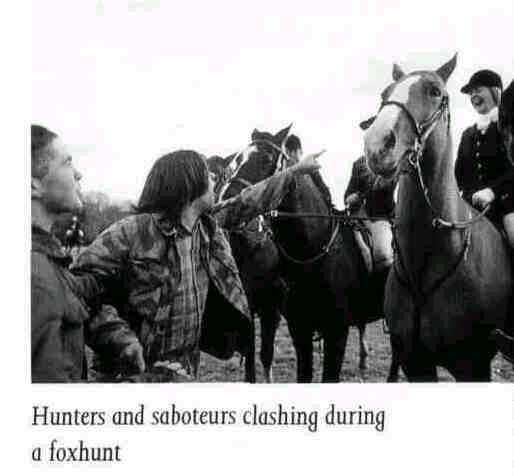
198 21 Sport and competition
>
Rounders
This sport is rather similar
to American baseball, but it certainly does not have the same
image. It has a long history in England as something that
people (young and old, male and female) can play together at
village fetes. It is often seen as not being a proper 'sport'.
However, despite this image,
it has recently become the second most popular sport for state
schools in Britain. More traditional sports such as cricket and
rugby are being abandoned in favour of rounders, which is much
easier to organize. Rounders requires less special equipment, less
money and boys and girls can play it together. It also takes up
less time. It is especially attractive for state schools with
little money and time to spare. More than a quarter of all
state-school sports fields are now used for rounders. Only
football, which is played on nearly half of all state-school
fields, is more popular. >
A nation of gamblers
In 1993 a total of £ 12.7
billion was wagered by the British - that's £ 289 for every adult
in the country. £ 9,.5 billion was won. The government took just
over £ i billion in taxes. The rest was kept by the bookmakers.
About half of all the money bet in 1993 was on horses or
greyhounds. 74% of all adults gambled at least once during the
year.
At least once every two
weeks: •
39% did the football pools; •
20% played on gaming and
fruit machines; •18%
played bingo; • 14%
put money on the horses. In
Britain in 1993, there was one
betting shop for every 3,000
adults. There
were also: *
120 casinos; *
120,000 fruit
machines;
* 1,000 bingo clubs; *1,000
lotteries; *59
racetracks; *37
greyhound stadiums.
Other
sports Almost
every sport which exists is played in Britain. As well as the
sports already mentioned, hockey (mostly on a field but also on
ice) is quite popular, and both basketball (for men) and netball
(for women) are growing in popularity. So too is the ancient game
of rounders (> Rounders). The
British have a preference for team games. Individual sports such as
athletics, cycling, gymnastics and swimming have comparatively
small followings. Large numbers of people become interested in them
only when British competitors do well in international events. The
more popular individual sports are those in which socializing
is an important aspect (such as tennis, golf, sailing and snooker).
It is notable in this context that, apart from international
competitions, the only athletics event which generates a lot of
enthusiasm is the annual London Marathon. Most of the tens of
thousands of participants in this race are 'fun runners' who are
merely trying to complete it, sometimes in outrageous costumes, and
so collect money for charity. There
seem to be two main exceptions to this tendency to prefer team
games. One is boxing, where some of the attraction lies in the
opportunity for gambling. But while boxing is declining in
popularity, the other exception, motor sports, is becoming
more popular. Gambling
Even if they are not taking part or watching, British people like
to be involved in sport. They can do this by placing bets on future
results. Gambling is widespread throughout all social classes. It
is so basic to sport that the word 'sportsman' used to be a synonym
for 'gambler'.
When, in 1993, the starting procedure for the Grand National did
not work properly, so that the race could not take place, it was
widely regarded as a national disaster. The £70 million which had
been gambled on the result (that's more than a pound for each man,
woman and child in the country!) all had to be given back.
Every year, billions of pounds are bet on horse races. So
well-known is this activity that everybody in the country, even
those with no interest in horse-racing, would understand the
meaning of a question such as 'who won the 2.30 at Chester?'
(Which horse won the race that was scheduled to take place at half
past two today at the Chester racecourse? The questioner probably
wants to know because he or she has gambled some money on the
result.) The central role of horse-racing in gambling is also shown
by one of the names used to denote companies and individuals whose
business it is to take bets. Although these are generally known as
'bookmakers', they sometimes call themselves 'turf
accountants' ('turf is a word for ground where grass grows).
Lramblmg 199
> The sporting calendar
This chart shows the seasons for Britain's most popular spectator sports and some of the most important sporting events which take place every year. There are other, less regular, events which can be very important and other annual events in particular sports which are more important for followers of those sports. However, these are the ones that are well-known to the general public.
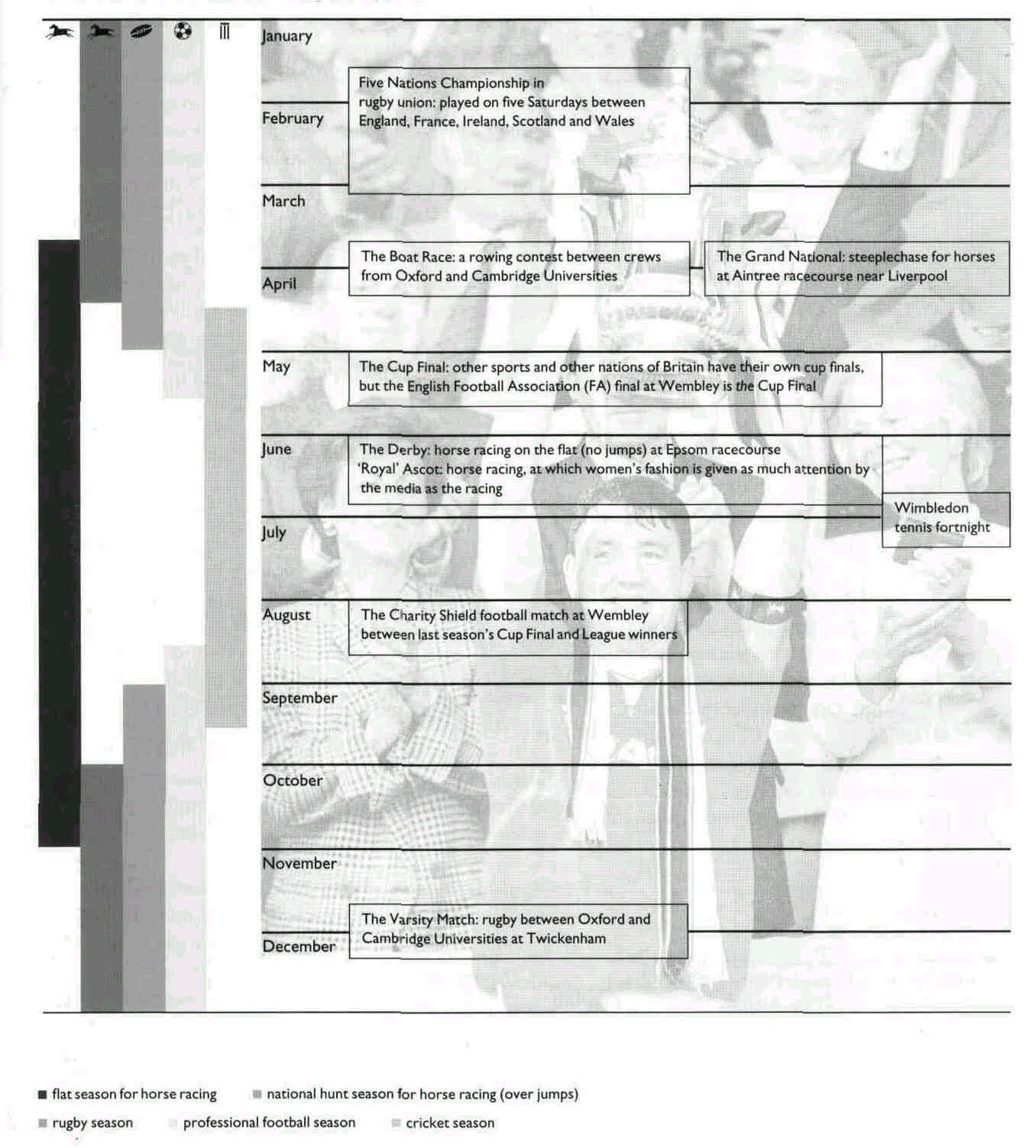
200 21 Sport and competition
Apart from the horses and the dogs, the most popular form of gambling connected with sports is the football pools. Every week, more than ten million people stake a small sum on the results of Saturday's professional matches. Another popular type of gambling, sterotypically for middle-aged working class women, is bingo.
Nonconformist religious groups (see chapter 13) traditionally frown upon gambling and their disapproval has had some influence. Perhaps this is why Britain did not have a national lottery until 1994. But if people want to gamble, then they will. For instance, before the national lottery started, the British gambled £ 250,000 on which company would be given the licence to run it! The country's big bookmakers are willing to offer odds on almost anything at all if asked. Who will be the next Labour party leader? Will it rain during the Wimbledon tennis tournament? Will it snow on Christmas Day? All of these offer opportunities for ‘a flutter'.
QUESTIONS
1 The manager of Liverpool Football Club during the 1970s once said: 'Football is not a matter of life and death to me - it's more important than that!' Do you think his comment is typical of the British attitude to sport (the traditional one, the modern one, both or neither)?
2 Cricket's great drawback is that it cannot be played during or immediately after rain because the grass is too wet. In the early 1990s it was suggested that first-class cricket should be played on plastic surfaces so that play could begin again as soon as the rain had stopped. English cricket enthusiasts were horrified by this suggestion. One member of the MCC (Marylebone Cricket Club, the club which partly controls the sport in England) commented, "The man must have been drunk when he thought of it'. How do you explain this extreme reaction?
3 In 1993 Roddy Doyle, a winner of the literary Booker Prize (see chapter 22) made regular appearances on a television football programme. In terms of the history of football in Britain, how was this significant? Are the sociological associations of football in your country different from those in Britain?
4 For about three months each year, the British spend millions of pounds betting on the results of Australian football - a sport which the vast majority have no interest in (and no understanding of)! Why do you think they do this? What does it tell us about British attitudes to sport and gambling? Are the chief forms of gambling in Britain the same as those in your country?
SUGGESTIONS
• Copies of football club fanzines can be bought from Sports Pages, CaxtonWalk, 94-96 Charing Cross Road, London WC2H 0JG. There is a general football fanzine called When Saturday Comes which is available from the same address or from 4th Floor, 2 Pear Tree Court, London EC1R 0DS. This includes details of most of the individual club fanzines available.
22 The
arts
>
What are'the arts'?
The arts is an 'umbrella' term
for literature, music, painting, sculpture, crafts, theatre,
opera, ballet, film etc. It usually implies seriousness, so that
particular examples of these activities which are regarded as
'light' may be referred to
simply as 'entertainment'
instead.
Art, or fine arts, is often
used to refer to those arts which use space, but not time, for their
appreciation (such as painting and sculpture). This, for example, is
what is covered by the subject 'art' in schools.
The word artist can sometimes
refer to a person working in the fine arts, and sometimes to a
person working in any field of the arts. In this chapter, it is used
in this latter sense.
>
What is'culture'?
The word culture has two
meanings. In
this book, it is used in its anthropological sense to mean 'way
of life'. But many people also use it as a synonym for 'the arts'.
When it is used this way in this chapter, it has inverted commas
around it.
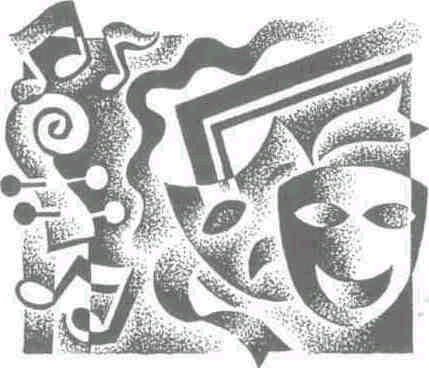
The
arts in society Interest
in the arts in Britain used to be largely confined to a small
elite. Compared with fifty years ago, far more people today read
books, visit art galleries, go to the theatre and attend concerts.
Nevertheless, the fact remains that most British people prefer
their sport, their television and videos (> Videos), and their
other free-time activities to anything 'cultural'.
The arts in Britain are met with a mixture of public apathy and
private enthusiasm. Publicly, the arts are accepted and tolerated
but not actively encouraged. As a proportion of its total
expenditure, government financial support for the arts is one of
the lowest of any western country. During the 1980os it was the
lowest of all. One of the principles of Thatcherism was that the
arts should be driven by 'market forces'. The government reduced
the money it gave to the Arts Council, the organization which
allocates funds to projects in the arts. It was politically
acceptable to do this because of the widespread view that
'culture* is of interest to a small section of the rich only.
Therefore, the government's action was seen as democratic—it was
refusing to subsidize the tastes of the wealthy. The
counterargument, that such an attitude is undemocratic because
it makes 'culture' too expensive for the ordinary person, is not
one that carries much weight in Britain. In schools, subjects such
as art and music, though always available, tend to be pushed to the
sidelines. In the national curriculum (see chapter 14), they are
the only two 'core' subjects which pupils at the age of fourteen
are allowed to drop completely.
In addition, the arts are not normally given a very high level of
publicity. Television programmes on 'cultural' subjects are usually
shown late at night. Each summer, many high-quality arts festivals
take place around the country (t> Annual arts festivals), but
the vast majority of people do not even know of their existence.
London has some of the finest collections of painting and sculpture
in the world, but tourist brochures give little space to this
aspect of the city. Except for the most famous, artists themselves
have comparatively little public recognition. Some British artists
have international reputations, and yet most people in Britain
don't even know their names.
202 22 The arts
>
Videos
Every year, more than £ i
billion •worth of videos are sold or rented in Britain. More than
60% of all households in the country own a video cassette recorder.
Every year, these households hire an average of about twenty-five
videos each and buy an average of about five videos each. Here is a
graph showing the types of video that people watched in 1993.
It is
very rare, for example, for any British artist to use his or her
fame in the arts as a springboard onto the political stage. If you
were to ask the
average person to name some famous painters, composers, opera
singers and ballet dancers, you would probably be given very few
British names - or even none at all.
It is almost as if the British are keen to present themselves as a
nation of philistines. And yet, hundreds of thousands of people are
enthusiastically involved in one or other of the arts, but (in
typically British fashion) with a more-or-less amateur or part-time
status. For example, every town in the country has at least one
'amateur dramatics' society, which regularly gives
performances and charges no more than enough to cover its costs.
All over the country, thousands of people learn handicrafts (such
as pottery) in their free time, and sometimes sell their work in
local craft shops. Similarly, there are thousands of musicians of
every kind, performing around the country for very little money and
making their own recordings in very difficult circumstances. Some
amateur British choirs, such as the Bach Choir of London and King's
College Chapel Choir in Cambridge, are well-known throughout
the world. The
characteristics of British arts and letters If
there is one characteristic of British work in the arts that seems
to stand out, it is its lack of identification with wider
intellectual trends. It is not usually ideologically committed, nor
associated with particular political movements. Playwrights
and directors, for instance, can be left-wing in their political
outlook, but the plays which they produce rarely convey a
straightforward political message. The same is largely true of
British novelists and poets. Their writing is typically
naturalistic and is not connected with particular intellectual
movements. They tend to be individualistic, exploring emotions
rather
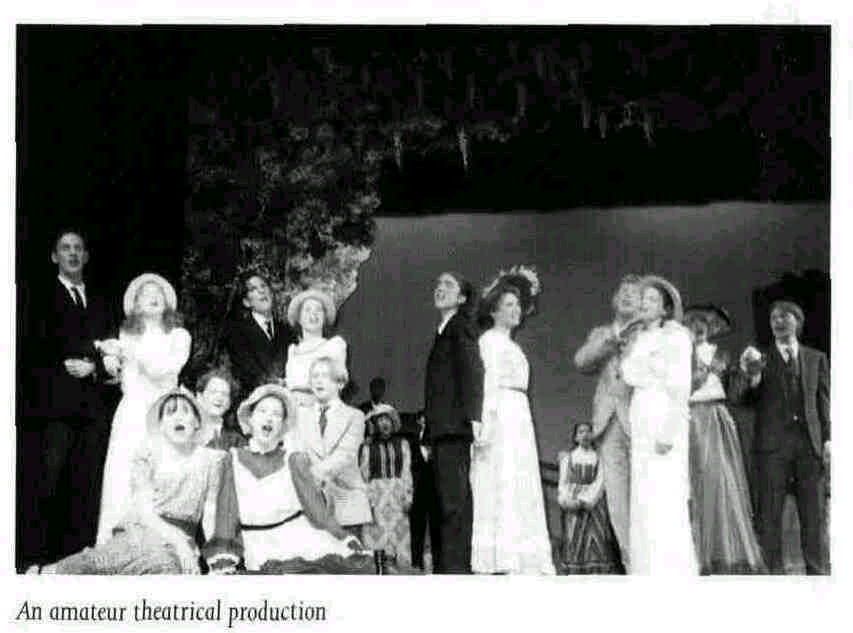

Theatre and cinema 203
than ideas, the
personal rather than the political. Whatever the critics say, it is
quite common for British playwrights and novelists to claim that
they just record 'what they see' and that they do not consciously
intend any social or symbolic message. Similarly, British work in
the arts also tends to be individualistic within its own field.
That is, artists do not usually consider themselves to belong to
this or that 'movement’. In any field of the arts, even
those in which British artists have strong international
reputations, it is difficult to identify a 'British school'.
The style of the arts also tends to
be conventional. The avant-garde exists, of course, but, with the
possible exception of painting and sculpture, it is not through
such work that British artists become famous. In the 1980s, Peter
Brook was a highly successful theatre director. But when he
occasionally directed avant-garde productions, he staged them in
Paris!
In
these features of the work of British artists (lonely individualism
expressing itself within conventional formats), it is perhaps
possible to find an explanation for the apparent contradiction
between, on the one hand, the low level of public support for the
arts and, on the other hand, the high level of enthusiasm on the
part of individuals. There appears to be a general assumption in
Britain that artistic creation is a personal affair, not a social
one, and that therefore the flowering of artistic talent cannot be
engineered. Either it happens, or it doesn't. It is not something
for which society should feel responsible. Theatre
and cinema The
theatre has always been very strong in Britain. Its centre is, of
course, London, where successful plays can sometimes run without a
break for many years (>They ran and ran!). But every
large town in the country has its theatres. Even small towns often
have 'repertory' theatres, where different plays are performed for
short periods by the same group of professional actors (a repertory
company). It
seems that the conventional format of the theatrical play gives the
undemonstrative British people a safe opportunity to look behind
the mask of accepted social behaviour. The country's most
successful and respected playwrights are usually those who explore
the darker side of the personality and of personal relationships
(albeit often through comedy). British
theatre has such a fine acting tradition that Hollywood is forever
raiding its talent for people to star in films. British television
does the same thing. Moreover, Broadway, when looking for its next
blockbuster musical, pays close attention to London productions. In
short, British theatre is much admired. As a consequence, it is
something that British actors are proud of. Many of the most
well-known television actors, though they might make most of their
money in this latter medium, continue to see themselves as first
and foremost theatre actors.
>
Annual arts festivals
There are many festivals
throughout Britain
during the year, but these are perhaps the most well-known.
Aldeburgh June.
East Anglia. Classical music. Relatively informal atmosphere.
Edinburgh International
Festival August.
All the performing arts, including avant-garde. More than ten
different performances every day around the city. World famous.
The Proms July-September.
London. Classical music. 'Proms' is short for 'promenades',
so-called because most of the seats are taken out of the Albert
Hall, where the concerts take place, and the audience stands or
walks around instead.
Glyndebourne All
summer. In the grounds of a large country house in Sussex. Opera.
Royal National
Eisteddfod July.
Wales. Music, poetry and dance from many different countries.
Mostly in the form of competitions, with special categories for
Welsh performing arts.
Glastonbury and Reading Probably
the two most well-established rock music festivals. The Bradford
and Cambridge
festivals emphasize folk music.
>
They ran and ran!
In the second half of the
twentieth century, the two longest-running theatrical productions
have been The Mousetrap (from a novel by Agatha Christie) and the
comedy No Sex Please, We're British. Both played continuously
for more than fifteen years.
204 22 The arts
>
British films
Here are some of the most
successful and/or respected British films of the 1980s and 1990s:
Chariots of Fire (1981) Gregory's
Girl (1981)
Gandhi(1982) A
Letter to Brezhnev (1985) My
Beautiful Launderette (1985) A
Room with a View (1985) A
Fish Called Wanda (1988) Shirley
Valentine (1989) Henry
V (1989) Howard's
End (1992) The
Crying Game (1992) Much
Ado About Nothing (1993) Four
Weddings and a Funeral (1994) The
Full Monty (1997)
Netting Hill (1999)
>
Some well-known arts venues
The Shakespeare Memorial
Theatre in Stratford is the home of the Royal Shakespeare Company
(RSC). All the other venues mentioned here are in London.
Theatres include the Old Vie
(the home of the National Theatre Company), the Mermaid, the Royal
Court and the Barbican (where the RSC also performs).
For opera and ballet, there
is the Royal Opera House at Covent Garden and the Coliseum, where
the Sadler's Wells Company performs.
The South Bank area has
several concert halls (notably the Royal Festival Hall) and the
National Theatre.
In
contrast, the cinema in Britain is often regarded as not quite part
of 'the arts' at all - it is simply entertainment. Partly for this
reason, Britain is unique among the large European countries in
giving almost no financial help to its film industry. Therefore,
although cinema-going is a regular habit for a much larger number
of people than is theatre-going, British film directors often have
to go to Hollywood because the resources they need are not
available in Britain. As a result, comparatively few films of
quality are made in the country. This is not because expertise in
film making does not exist. It does. American productions often use
studios and technical facilities in Britain. Moreover, some of the
films which Britain does manage to make become highly respected
around the world (t> British films). But even these films often
make a financial loss. Music Classical
music in Britain is a minority interest. Few classical musicians,
whether British or foreign, become well known to the general
public. When they do, it is usually because of circumstances which
have nothing to do with their music. For example, the Italian tenor
Pavarotti became famous in the country when an aria sung by him was
used by the BBC to introduce its 1990 football World Cup coverage.
Despite this low profile, thousands of British people are dedicated
musicians and many public libraries have a well-stocked music
section. Several British orchestras, soloists, singers, choirs,
opera companies and ballet companies, and also certain annual
musical events, have international reputations. In
the 1960s, British artists had a great influence on the
development of music in the modern, or 'pop' idiom. The
Beatles and other British groups were responsible for several
innovations which were then adopted by popular musicians in the USA
and the rest of the world. These included the writing of words and
music by the performers themselves, and more active audience
participation. The words of their songs also helped to liberate the
pop idiom from its
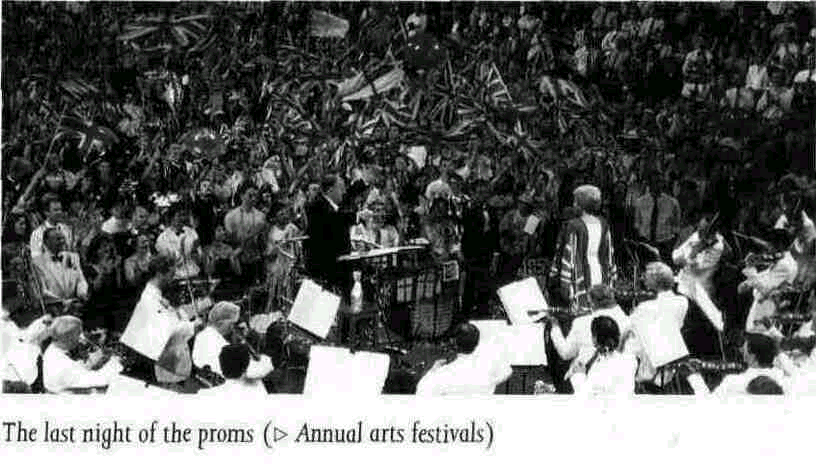
Literature 205
former limitation to
the topics of love and teenage affection. Other British artists in
groups such as Pink Floyd and Cream played a major part in making
the musical structure of pop music similarly more sophisticated. Since
the 1960s, popular music in Britain has been an enormous and
profitable industry. The Beatles were awarded the honour (see
chapter 7) of MBE (Member of the British Empire) for their services
to British exports. Within Britain the total sales of the various
kinds of musical recording are more than 200 million every year -
and the vast majority of them are of popular music. Many worldwide
trends have come out of Britain and British 'pop' artists have been
active in attempting to cross the boundaries between popular music,
folk music and classical music. Literature
Although the British are comparatively uninterested in formal
education, and although they watch a lot of television, they
are nonetheless enthusiastic readers.
Many people in the literary world say that British literature lost
its way at the end of the twentieth century The last British author
to win the Nobel Prize for literature was William Golding, in 1983.
Many others disagree with this opinion. But what is not in doubt is
that a lot of the exciting new literature written in English and
published in Britain in recent years has been written by
people from outside Britain. The Booker Prize is the most important
prize in Britain for a work of fiction. Starting with Salman
Rushdie in 1981, nine of its next fourteen winners were writers
from former British colonies such as Canada, India, Ireland and
Nigeria.
Although many of the best 'serious' British writers manage to be
popular as well as profound, the vast majority of the books that
are read in Britain could not be classified as 'serious'
literature. Britain is the home of what might be called
'middlebrow' literature. (That is, mid-way between serious, or
'highbrow' literature and popular, or 'pulp' fiction.) For example,
the distinctly British genre of detective fiction (the work of
writers like Agatha Christie and Ruth Rendell) is regarded as
entertainment rather than literature — but it is entertainment
for intelligent readers. There are many British authors, mostly
female (for example, Norah Lofts and Rummer Godden), who write
novels which are sometimes classified as 'romances' but which are
actually deeper and more serious than that term often implies. They
are neither popular 'blockbusters' nor the sort of books which are
reviewed in the serious literary press. And yet they continue to be
read, year after year after year, by hundreds of thousands of
people.
In 1993 more than half of the hundred most-borrowed books from
Britain's public libraries were romantic novels. Many were of the
middlebrow type. The rest were more simplistic stories about
romance (she is young and pretty, he is tall, dark and handsome
>
The arts and television
There are now only a quarter
of the number
of cinema seats in Britain as there were in 1965. This decline is
generally assumed to be the result of the popularity of television.
In fact, television has taken an increasingly important supporting
role in the arts. The making of some high-quality British films has
only been possible because of the financial help of Channel 4. The
BBC regularly commissions new works of music for the proms.
Television drama and comedy help to keep hundreds of actors in
work. Moreover,
television can actually help to promote other art forms. When a
book is dramatized on television, its sales often rocket. The
most spectacular example of this occurred in the late 1960s. The
Forsyte Sago, a series of novels by John Galsworthy, had been
out of print for several decades. When an adaptation . was shown on
the BBC, half a million copies of the books were sold!
>
Mountains of books!
For the really scholarly
reader, the British Library (a department of the British Museum)
has more than 10 million volumes, occupying 320 kilometres of shelf
space. At present, the library is obliged to house a copy of every
book published in the country. This obligation, however, will
probably disappear in the future. It is just too difficult to
organize. By 1993, its collection was expanding at the rate of 150
centimetres of books per hour. It possesses more than 6,000
different editions of Shakespeare's plays and more than 100
different editions of most novels by Charles Dickens. The result of
all this is that it can take up to two days to find a particular
book!
206 22 The arts
>
A child could do that!
British people often complain
about modem abstract painting by saying, 'It doesn't look
very special to me. A child of four could do that’. Well, in 1993
a child of four did do it.
One of the paintings offered
to the Manchester Academy of Fine Arts for its annual exhibition
was a work called Rhythm of the Trees. The Academy's experts
liked it and included it in the exhibition. Only later did they
discover that its creator, Carly Johnson, was four years old (the
title was her grandfather's idea).
The news of this discovery
was greatly enjoyed by the whole of Britain. Everybody loves it
when experts are made to look like fools, especially when they are
experts about something that most people don't understand. It did
not occur to many people to think that perhaps a child genius had
been discovered. Somebody else must have liked Carly's painting too
- it sold for £295.
with a very firm jaw;
whatever happens during the story, they end up in each other's arms
- forever). The British publisher which sells more books than any
other is Mills & Boon, whose books are exclusively of this
type. It
is more than 200 years since poetry stopped being the normal mode
of literary self-expression. And yet, poetry at the end of the
twentieth century is surprisingly, and increasingly, popular in
Britain. Books of poetry sell in comparatively large numbers. Their
sales are not nearly as large as sales of novels, but they are
large enough for a few small publishers to survive entirely on
publishing poetry. Many poets are asked to do readings of their
work on radio and at arts festivals. Many of these poets are not
academics and their writing is accessible to non-specialists.
Perhaps the 'pop' idiom and the easy availability of sound
recording have made more people comfortable with spoken verse then
they were fifty years ago. The
fine arts
Painting and sculpture are not as widely popular as music is in
Britain. There is a general
feeling that you have to be a specialist to appreciate them,
especially if they are contemporary. Small private art galleries,
where people might look at paintings with a view to buying them,
are rare. Nevertheless, London is one of the main centres of the
international collector's world. The two major auction houses of
Sotheby's and Christie's are world-famous. Until
the 1980s, the country's major museums and galleries charged
nothing for admission. Most of them now do so, although sometimes
payment is voluntary. This has caused a lot of complaint that a
great tradition of free education has been lost.
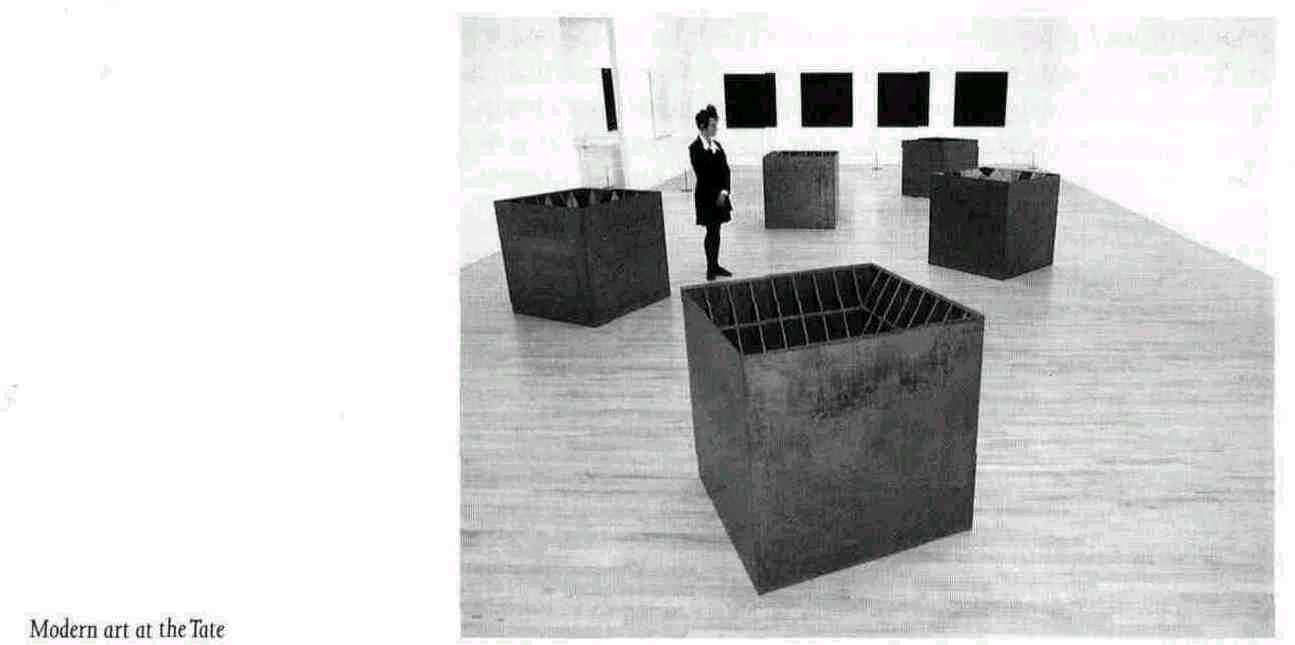
Questions and suggestions 207
Museums
and art galleries
The major museums in London
are the
British Museum (the national collection of antiquities), the
Victoria and Albert Museum, which houses the world's largest
display of the decorative arts, the Natural History Museum and the
Science Museum. There are numerous other small, specialist museums
in London and throughout the rest of the country, usually with an
emphasis on history and British 'heritage' There has been a move to
make museums come alive with appropriate sounds and even
smells. Art
galleries in London which house permanent collections include the
National Gallery, the
adjoining
National Portrait Gallery, and
theTate Britain, which is the nation's gallery of British art from
1500 to the present day. These galleries also hold special
temporary exhibitions. The Hayward Gallery and the Royal Academy
put on a series of shows, some of which are extremely popular. The
Royal Academy is famous for its annual Summer Exhibition. Outside
London there is the Burrell Collection near Glasgow and the Tate
Galleries in Liverpool and St Ives. Most major towns and cities
have their own museums and art galleries.
QUESTIONS
1 How does the British government justify its policy of low spending on the arts? Does the government in your country subsidize the arts and encourage artistic endeavor in schools and elsewhere?
2 What evidence can you find in this chapter to support the view that the arts are of interest to a small minority of British people only? What evidence can you find to support the opposite view - that interest in the arts is widespread? How is it that there can be an element of truth in both of these opinions?
3 Which areas of the arts seem to be particularly appreciated and valued in Britain and which seem to be ignored or under-valued? In what ways does the appreciation of the different aspects of the arts vary in your country?
4 The British are very conscious of the distinction between high art or 'culture' and light 'entertainment'. In what area of the arts have they succeeded in establishing a widely accepted and approved compromise which appeals to a broad range of people from different social backgrounds and with varying levels of education?
SUGGESTIONS
• Most of the major museums publish guides to their collections, pointing out their most highly-prized exhibits, which are often illustrated in the guides.
• Any biography of any of the major British theatrical figures of this century, such as Sir Laurence Olivier (there is one published by Fontana, written by Donald Spoto) would reveal a lot about the history of the theatre in Britain and about British theatre in general.

Holidays and special occasions
Britain is a country governed by routine. It has fewer public holidays than any other country in Europe and fewer than North America. (Northern Ireland has two extra ones, however). Even New Year's Day was not an official public holiday in England and Wales until quite recently (but so many people gave themselves a holiday anyway that it was thought it might as well become official!). There are almost no semi-official holidays either. Most official holidays occur either just before or just after a weekend, so that the practice of making a 'bridge' is almost unknown. Moreover, there are no traditional extra local holidays in particular places. Although the origin of the word 'holiday' is 'holy day', not all public holidays (usually known as 'bank holidays') are connected with religious celebrations.
The British also seem to do comparatively badly with regard to annual holidays. These are not as long as they are in many other countries. Although the average employee gets four weeks' paid holiday a year, in no town or city in the country would a visitor ever get the impression that the place had 'shut down' for the summer break. (In fact, about 40% of the population do not go away anywhere for their holidays.)
Traditional seaside holidays
The British upper class started the fashion for seaside holidays in the late eighteenth century. The middle classes soon followed them and
when they were given the opportunity (around the beginning of the twentieth century), so did the working classes. It soon became normal for families to spend a week or two every year at one of the seaside resort towns which sprang up to cater for this new mass market. The most well-known of these are close to the larger towns and cities (> Holiday resorts in England).
These seaside towns quickly developed certain characteristics that are now regarded as typical of the 'traditional' English holiday resort. They have some hotels where richer people stay, but most families stay at boarding houses. These are small family businesses, offering either 'bed and breakfast' or, more rarely, 'full board' (meaning that all meals are provided). Some streets in seaside resorts are full of nothing but boarding houses. The food in these, and in local restaurants, is cheap and conventional with an emphasis on fish and chips.
209
>
Rock
There is one kind of sweet
associated with holiday resorts. This is 'rock', a hard thick stick
of sugar. Each resort has the letters of its name appearing
throughout the stick, so that one hears of'Brighton Rock',
'Blackpool Rock' and so on.
Stereotypically, daytime entertainment in sunny weather centres
around the beach, where the children make sandcastles, buy
ice-creams and sometimes go for donkey rides. Older adults often do
not bother to go swimming. They are happy just to sit in their deck
chairs and occasionally go for a paddle with their skirts or
trouser-legs hitched up. The water is always cold and, despite
efforts to clean it up, sometimes very dirty. But for adults who
swim, some resorts have wooden huts on or near the beach, known as
'beach cabins', 'beach huts' or 'bathing huts', in which people can
change into their swimming costumes. Swimming and sunbathing without
any clothing is rare. All resorts have various other kinds of
attraction, including more-or-less permanent funfairs.
For the evenings, and when it is raining, there are amusement
arcades, bingo halls,
dance halls, discos, theatres, bowling alleys and so on, many of
these situated on the pier. This unique British architectural
structure is a platform extending out into the sea. The large
resorts have decorations which light up at night. The 'Blackpool
illuminations', for example, are famous. Another
traditional holiday destination, which was very popular in Britain
in the 1950s and 1960s, is the holiday camp, where visitors stay in
chalets in self-contained villages with all food and entertainment
organized for them. Butlin's and Pontin's, the companies which
own most of these, are well-known names in Britain. The enforced
good-humour, strict meal-times and events such as 'knobbly knees'
competitions and beauty contests that were characteristic of
these camps have now given way to a more relaxed atmosphere.
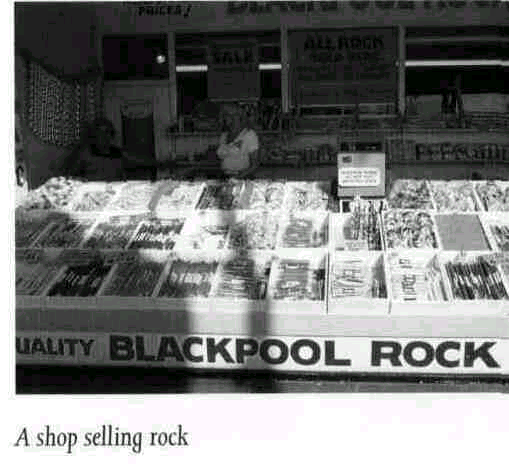
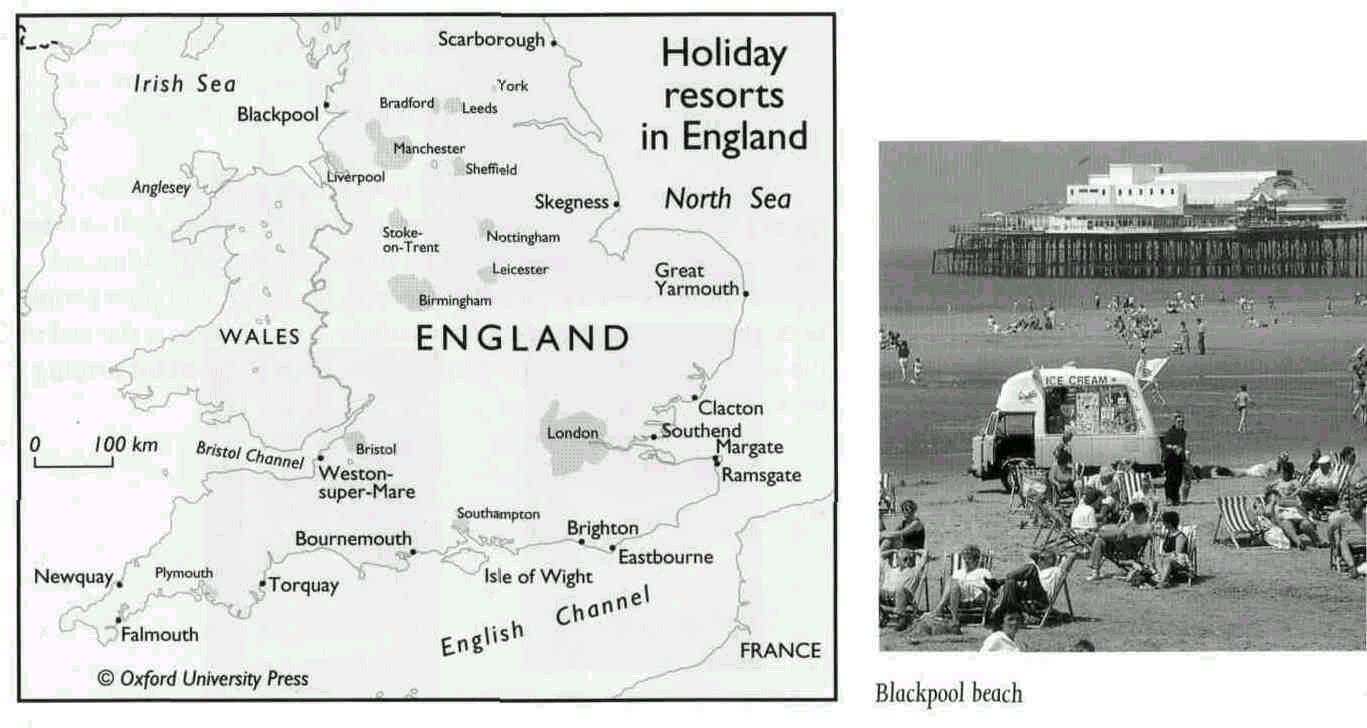
210
>
Seaside postcards
Humorous postcards like the
one below can still be bought at seaside resorts. The joke always
has an element of sexual innuendo in it. The traditional seaside
holiday in the first half of the twentieth century represented a
relaxing of Victorian restrictions on overt reference to sex. These
days, of course, no such restrictions exist, so these postcards are
mainly enjoyed in a spirit of nostalgia for the past.
Modern
holidays Both
of the traditional types of holiday have become less popular in the
last quarter of the twentieth century. The increase in car
ownership has encouraged many people to take caravan holidays.
But the greatest cause of the decline of the traditional holiday is
foreign tourism. Before the 1960s, only the rich took holidays
abroad. By 1971, the British were taking 7 million foreign holidays
and by 1987, 20 million. These days, millions of British people
take their cars across the channel every year and nearly half of
all the nights spent on holidays away from home are spent abroad.
Most foreign holidays are package holidays, in which transport and
accommodation are booked and paid for through a travel agent. These
holidays are often booked a long time in advance. In the middle of
winter the television companies run programmes which give
information about the packages being offered. People need cheering
up at this time of the year! In many British homes it has become
traditional to get the holiday brochures out and start talking
about where to go in the summer on Boxing Day (>Calendar of
special occasions). Spain is by far the most popular
package-holiday destination.
Half of all the holidays taken within Britain are now for three
days or less. Every bank-holiday weekend there are long traffic
jams along the routes to the most popular holiday areas. The
traditional seaside resorts have survived by adjusting themselves
to this trend. (Only the rich have second houses or cottages in the
countryside to which they can escape at weekends.) But there are
also many other types of holiday. Hiking in the country and
sleeping at youth hostels has long been popular (see chapter 5) and
so, among an enthusiastic minority, has pot-holing (the exploration
of underground caves). There are also a wide range of 'activity'
holidays available, giving full expression to British
individualism. You can, for example, take part in a 'murder
weekend', and find yourself living out the plot of detective story.
An increasing number of people now go on 'working' holidays, during
which they might help to repair an ancient stone wall or take part
in an archaeological dig. This is an echo of another traditional
type of'holiday' - fruit picking. It used to be the habit of poor
people from the east end of London, for example, to go to Kent at
the end of the summer to help with the hop harvest (hops are used
for making beer).
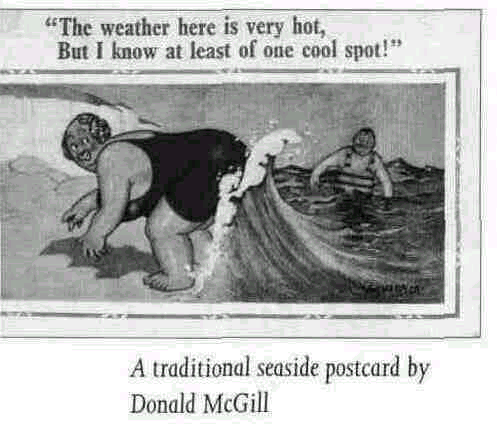
Christmas and New Year 211
Christmas and New Year
Christmas is the one occasion in modern Britain when a large number of customs are enthusiastically observed by most ordinary people within the family. The slow decrease in participation in organized religion (see chapter 13), and the fact that Christmas in modern times is as much a secular feast as a religious one, has had little effect on these traditions. Even people who consider themselves to be anti-religious quite happily wish each other a 'Happy Christmas' or a
'Merry Christmas'. They do not (as in some other countries) selfconsciously wish each other a 'Happy New Year' instead.
Indeed, the 'commercialization' of Christmas has itself become part of tradition. Every November in Oxford Street (one of the main shopping streets in the centre of London), a famous personality ceremoniously switches on the 'Christmas lights' (decorations) thus
'officially' marking the start of the period of frantic Christmas shopping. And it certainly is frantic. Between that time and the middle of January, most shops do nearly half of their total business for the year (most have 'sales' in early January when prices are reduced). Most people buy presents for the other members of their household and also for other relatives, especially children. Some people also buy presents for their close friends. And to a wider circle of friends and relatives, and sometimes also to working associates and neighbours, they send Christmas cards (i> Christmas cards). Some people even send such greetings to people whom they have not seen for many years, often using the excuse of this tradition to include a letter passing on the year's news.
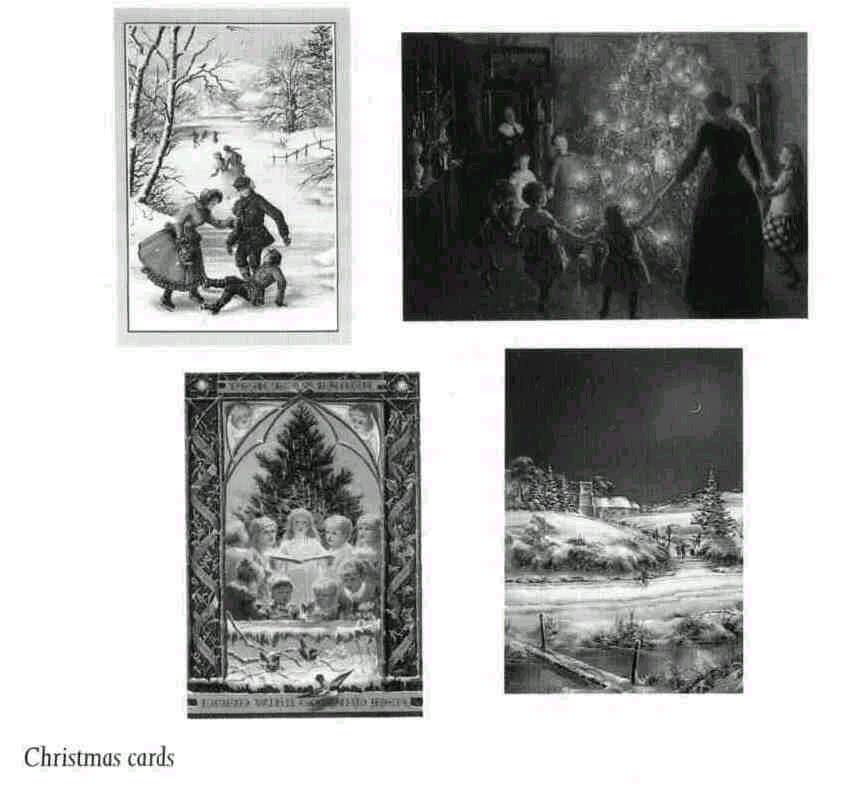
^
Christmas cards
Many people send cards at
Christmas time depicting some aspect of the birth of Christ. Most
people, however, do not. Christmas is an opportunity for the
British to indulge their dreams about a vanished rural past.
You can see this on many typical Christmas cards. They often show
scenes from either the nineteenth or eighteenth centuries and may
be set in the countryside, very frequently covered with snow. (In
fact, snow at Christmas is rare in most parts of Britain).
212 23 Holidays and special occasions
>
The Christmas party
In thousands of companies
throughout Britain, the last working afternoon before
Christmas is the time of the annual office party, at which a lot of
alcohol is often consumed. Sexual feelings, hidden throughout
the year, come into the open. This is a problem for company bosses.
By law, an employer is responsible for sexual harassment at work
and may have to pay as much as
£ 10,000 in compensation. The peak time for complaints of sexual
harassment is in January - just after the annual office party. Many
employers now insure themselves against claims for compensation at
this time.
>
Christmas dinner
The traditional meal consists
of stuffed roast turkey with roast potatoes and some other
vegetable (often Brussel sprouts). Other foods associated with
Christmas are Christmas pudding, an extremely heavy sweet dish made
of dried fruits (it is traditional to pour brandy over it and
then set it alight) and Christmas cake, an equally heavy fruit
cake, with hard white icing on top.
People
also buy Christmas trees (a tradition imported from Germany in the
nineteenth century). Almost every household has a tree decorated in
a different way (in many cases, with coloured lights). Most people
also put up other decorations around the house. Exactly what these
are varies a great deal, but certain symbols of Christmas, such as
bits of the holly and mistletoe plants, are very common, and the
Christmas cards which the household has received are usually
displayed. A 'crib', which is a model depicting the birth of
Christ, also sometimes forms part of the Christmas decorations. In
December, as Christmas gets closer, carols (usually, but not
always, with a religious theme) are sung in churches and schools,
often at special concerts, and also, though less often than in the
past, by groups of people who go from house to house collecting
money for charitable causes. The
role of Father Christmas (or Santa Claus) and the customs
associated with the giving of gifts vary from family to family.
Most households with children tell them that Father Christmas comes
down the chimney on the night of Christmas Eve (even though most
houses no longer have a working chimney!). Many children lay out a
Christmas stocking at the foot of their beds, which they expect to
see filled when they wake up on Christmas morning. Most families
put wrapped presents around or on the Christmas tree and these are
opened at some time on Christmas Day. Other
activities on Christmas Day may include the eating of Christmas
dinner (> Christmas dinner) and listening to the Queen's
Christmas message. This ten-minute television broadcast is normally
the only time in the year when the monarch speaks directly to 'her'
people on television. (When, in 1993, a national newspaper
published the text other speech a few days beforehand, it was
a national scandal.) The
general feeling is that Christmas is a time for families. Many of
the gatherings in houses on Christmas Day and Boxing Day consist of
extended families (more than just parents and children). For many
families, Christmas is the only time that they are all together (so
it is often a time of conflict rather than harmony, in fact). Parties
on New Year's Eve, on the other hand, are usually for friends. Most
people attend a gathering at this time and 'see in' the new year
with a group of other people, often drinking a large amount of
alcohol as they do so. In London, many go to the traditional
celebration in Trafalgar Square (where there is an enormous
Christmas tree which is an annual gift from the people of Norway). In
Scotland, where the Calvinists disapproved of parties and
celebrations connected with religious occasions (such as
Christmas), New Year, called Hogmanay, is given particular
importance - so much importance that, in Scotland only, 2 January
(as well as New Year's Day) is also a public holiday (so that
people have two days to recover from their New Year's Eve parties
instead of just one!). Some British New Year customs, such as the
singing of the song Auld Long Syne,
Other notable annual occasions 213
originated
in Scotland. Another, less common, one is the custom of 'first
footing', in which the first person to visit a house in the new
year is supposed to arrive with tokens of certain important items
for survival (such as a lump of coal for the fire). As
a well-known Christmas carol reminds people, there are twelve days
of Christmas. In fact, most people go back to work and school soon
after New Year. Nobody pays much attention to the feast of the
epiphany on 6 January (the twelfth day of Christmas), except that
this is traditionally the day on which Christmas decorations are
taken down. Some people say it is bad luck to keep them up after
this date. Other
notable annual occasions Easter
is far less important than Christmas to most people in Britain.
Although it involves a four-day 'weekend', there are very few
customs and habits associated generally with it, other than the
consumption of mountains of chocolate Easter eggs by children.
Some people preserve the tradition of eating hot cross buns on Good
Friday (> Calendar of special occasions). Quite a lot of people
go away on holiday at this time.
None of the other days of the year to which traditional customs are
attached is a holiday, and not everybody takes part in these
customs. In fact, many people in Britain live through occasions
such as Shrove Tuesday, April Fools' Day or Hallowe'en (>
Calendar of special occasions) without even knowing that they have
happened.
There is one other day which, although many people do not mark in
any special way, is very difficult to ignore. This is 5
November, the day which celebrates a famous event in British
history - the gunpowder plot. It is called Guy Fawkes' Day - or,
more commonly, Bonfire Night. At the beginning of the seventeenth
century, a group of Catholics planned to blow up the Houses of
Parliament while King James I was in there. Before they could
achieve this, one of them, Guy Fawkes, was caught in the cellars
under Parliament with the gunpowder. He and his fellow-conspirators
were all killed.
Panto
The Christmas and New Year
holiday seasons
bring with them a popular theatrical tradition. This is pantomine
(often shortened to 'panto'), staged in hundreds of theatres and
specifically designed to appeal to children. It usually involves
the acting out of a well-known folk tale with plenty of opportunity
for audience participation. There
are certain established conventions of panto. For example, the
cast includes a 'principal boy' (the young hero), who is always
played by a woman, and a 'dame' (an older female character), who is
always played by a man. The
continuing popularity of panto is assisted by the fact that these
leading roles are today frequently taken by well-known
personalities from the worlds of television or sport.
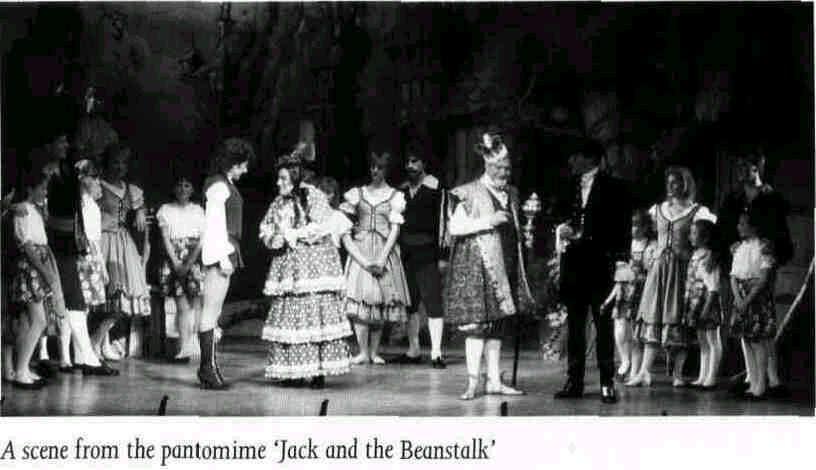
214 23 Holidays and special occasions
>
St Valentine's Day and Gretna Green
Despite the unromantic
reputation of
the British, on this day every year about £7 million worth of
flowers are delivered (orders from men outnumber those from
women by forty to one), an extra 40 million chocolates are
sold and greetings-card manufacturers collect £25 million.
Every St Valentine's Day,
thousands of people travel to a tiny village on Scotland's
border with England. Many of them go to get married, and many more
couples go through mock wedding ceremonies. The village is
Gretna Green. Its romantic reputation began in 1754. In England in
that year, marriage for people under the age of twenty-one without
permission from parents was banned. In Scotland, however, this
permission was not required, and Gretna Green was the first stop
across the border. The laws that brought fame to Gretna Green no
longer apply. But its reputation is secure. In this small place, at
least one couple gets married, on average, every day of the year.
Weddings for St Valentine's Day have to be booked three months in
advance. >
Shrove Tuesday
This day is also known as
Pancake Day. In past centuries, Lent was a time of fasting. Both
meat and eggs were forbidden throughout the six weeks. The
tradition was to eat up all your meat on the Monday before Lent,
and all your eggs on the Tuesday — in pancakes. Now, the fasting
has gone and only the eating remains.
Two events are associated
with Shrove Tuesday. One of them is the pancake tossing contest
(how many pancakes can you throw into the air and catch within a
certain time?). The other is the pancake race. Contestants
have to run while continuously tossing a pancake. Anyone who drops
his or her pancake is disqualified.
At
the time, the failure of the gunpowder plot was celebrated as a
victory for British Protestantism over rebel Catholicism. However,
it has now lost its religious and patriotic connotations. In most
parts of Britain, Catholic children celebrate it just as
enthusiastically as Protestant children - or, for that matter,
children brought up in any other religious faith. (As with
Christmas, most of the customs associated with this day are mainly
for the benefit of children.) Some children make a 'guy' out of old
clothes stuffed with newspaper several weeks beforehand. They then
place this somewhere on the street and ask passers-by for 'a penny
for the guy'. What they are actually asking for is money to buy
fireworks with. On
Guy Fawkes' Night itself there are 'bonfire parties' throughout the
country, at which the 'guy' is burnt. Some people cook food in the
embers of the bonfire, especially chestnuts or potatoes. So many
fireworks are set off that, by the end of the evening, the air in
all British cities smells strongly of sulphur. Every year,
accidents with fireworks injure or even kill several people. In an
effort to make things safer, some local authorities arrange public
firework displays. Finally,
one other day should be mentioned. This is a different day for
everybody - their birthday. Once again, it is most important for
children, all of whom receive presents on this day from their
parents, and often from other relatives as well. Adults may or may
not receive presents, depending on the customs of their family and
their circle of friends. Many will simply be wished 'Happy
birthday' (not, by the way, 'Congratulations', unless it is a
special birthday, such as a twenty-first). Some children and adults
have a party, but not all. Moreover, nobody, including adults, is
automatically expected to extend hospitality to other people on
this day, and it is not expected that people should bring along
cakes or anything to share with their colleagues at work, although
some people do.
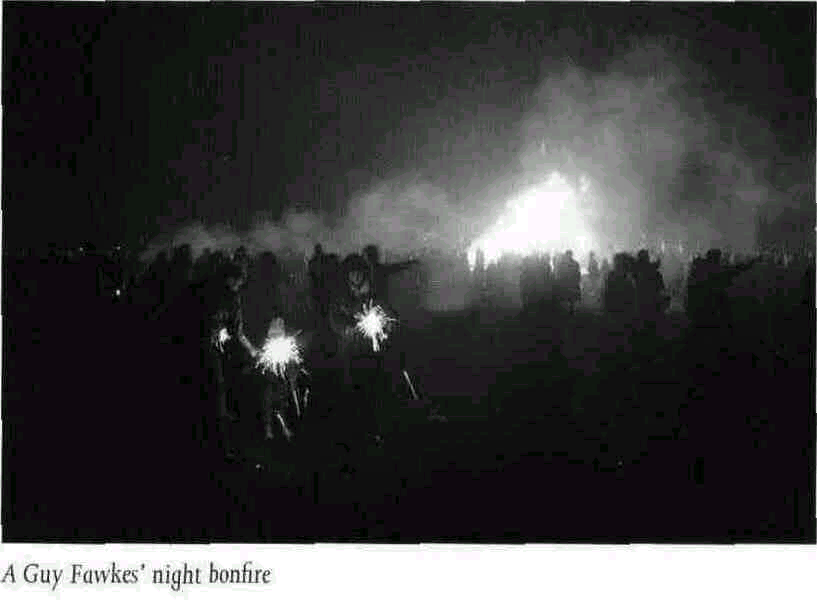
Other notable annual occasions 215
> Calendar of special occasions
New Year's Day* (1 January)
